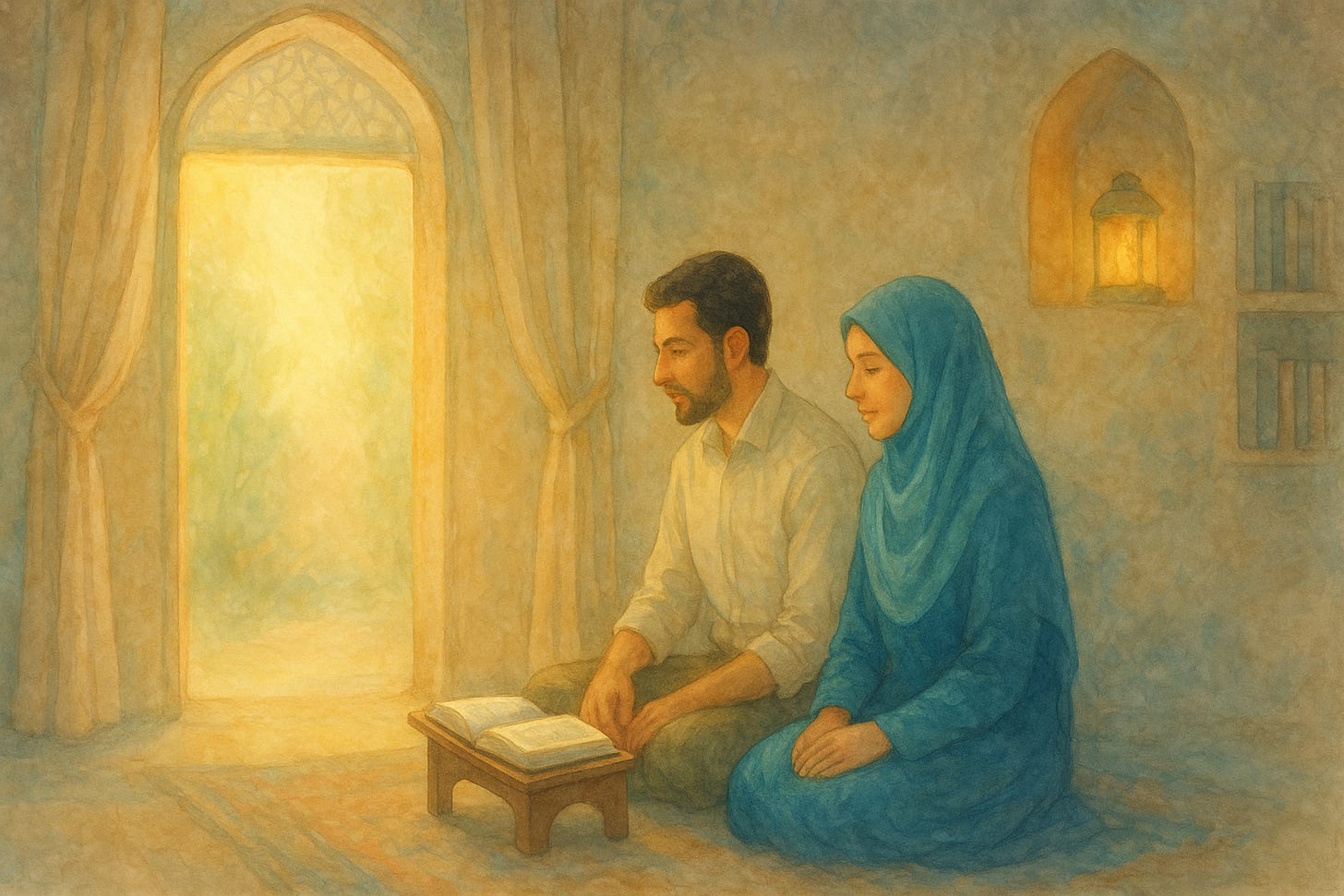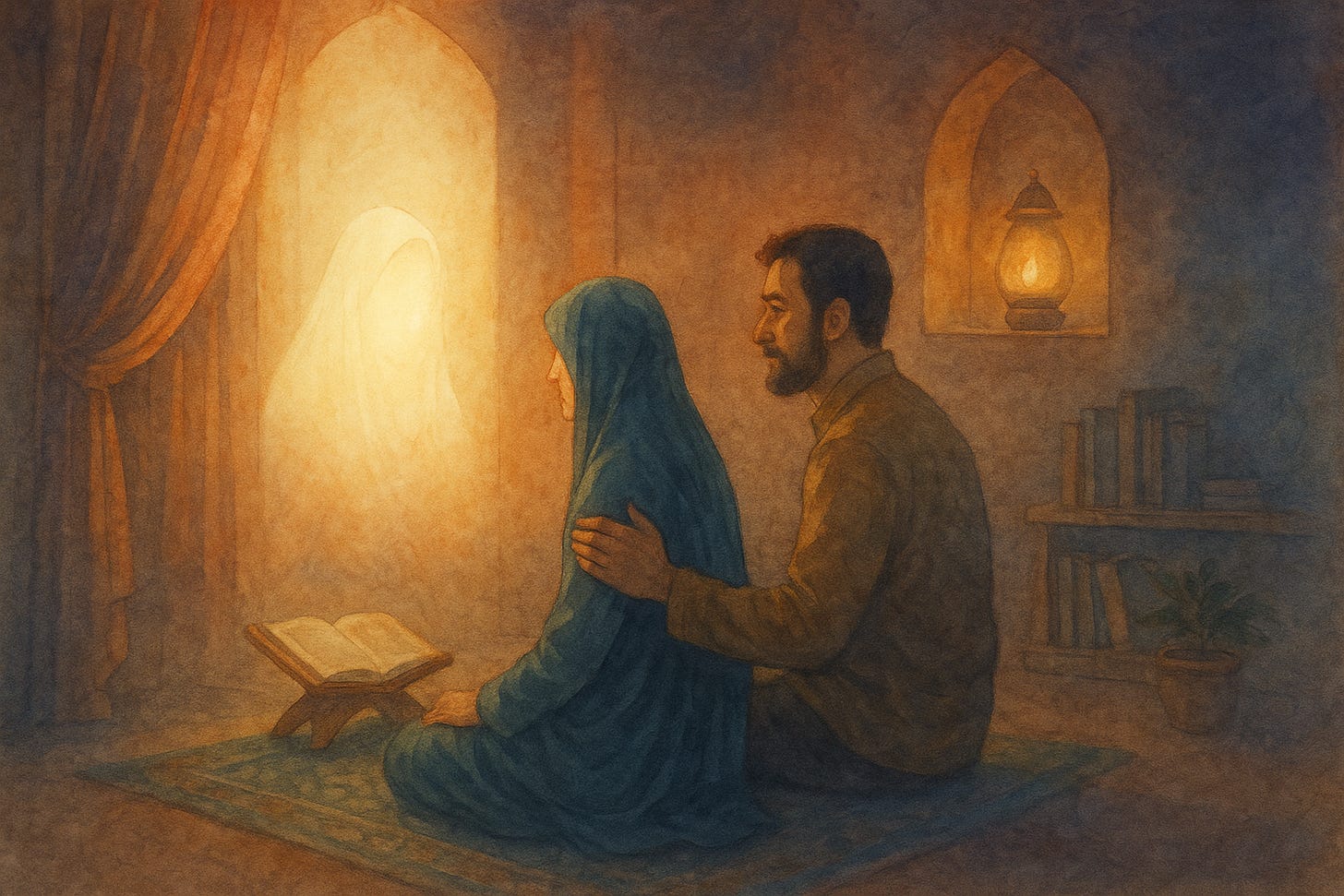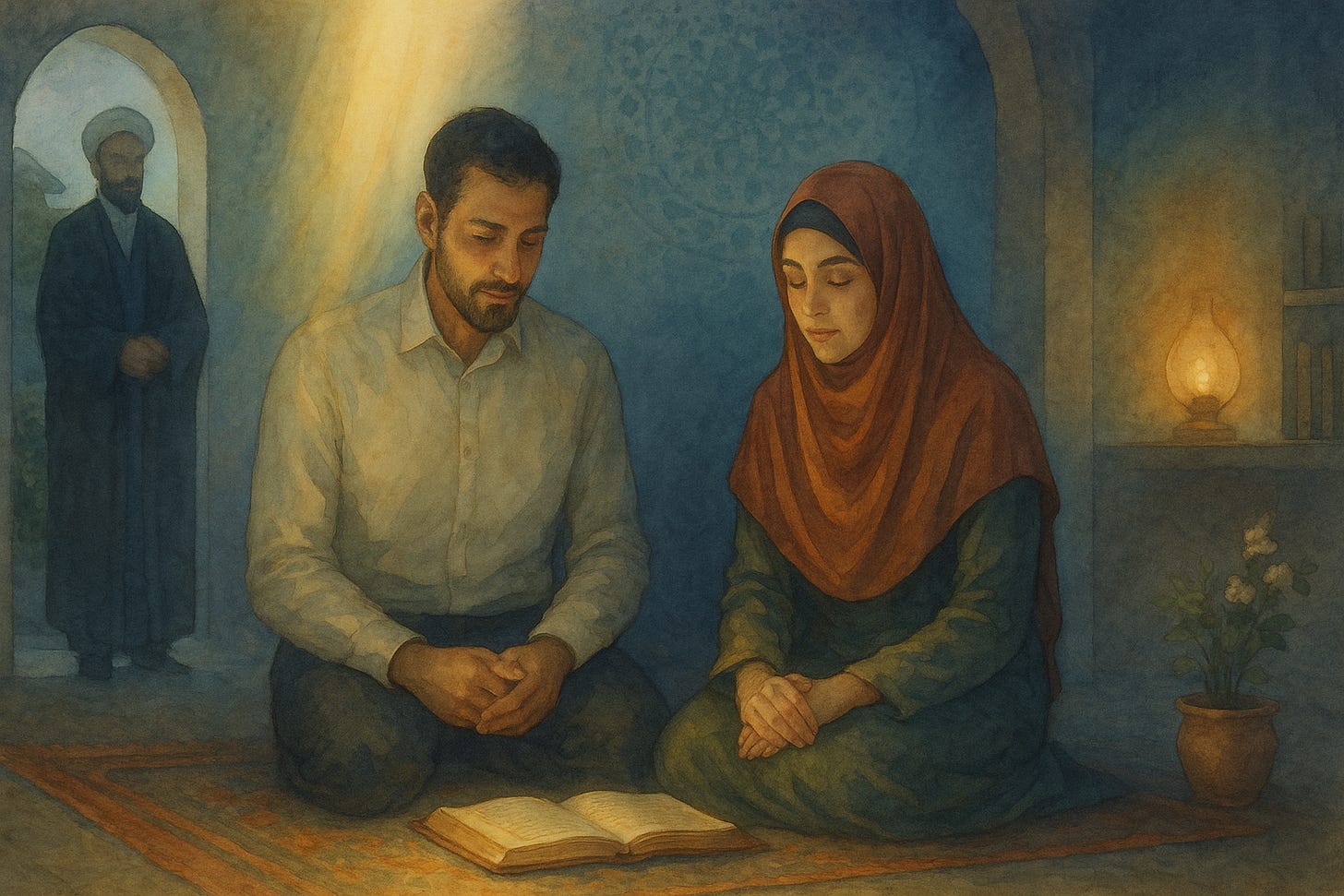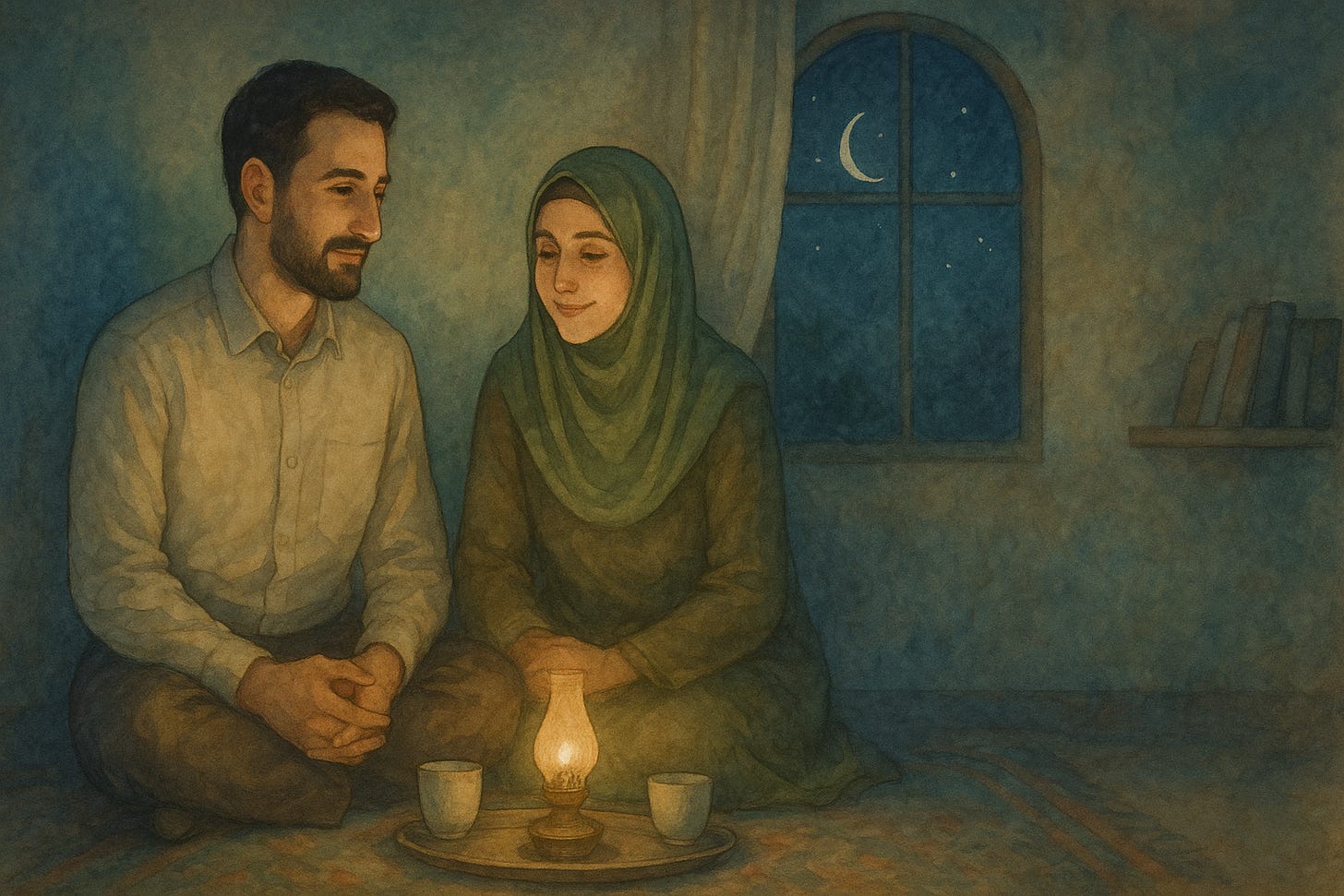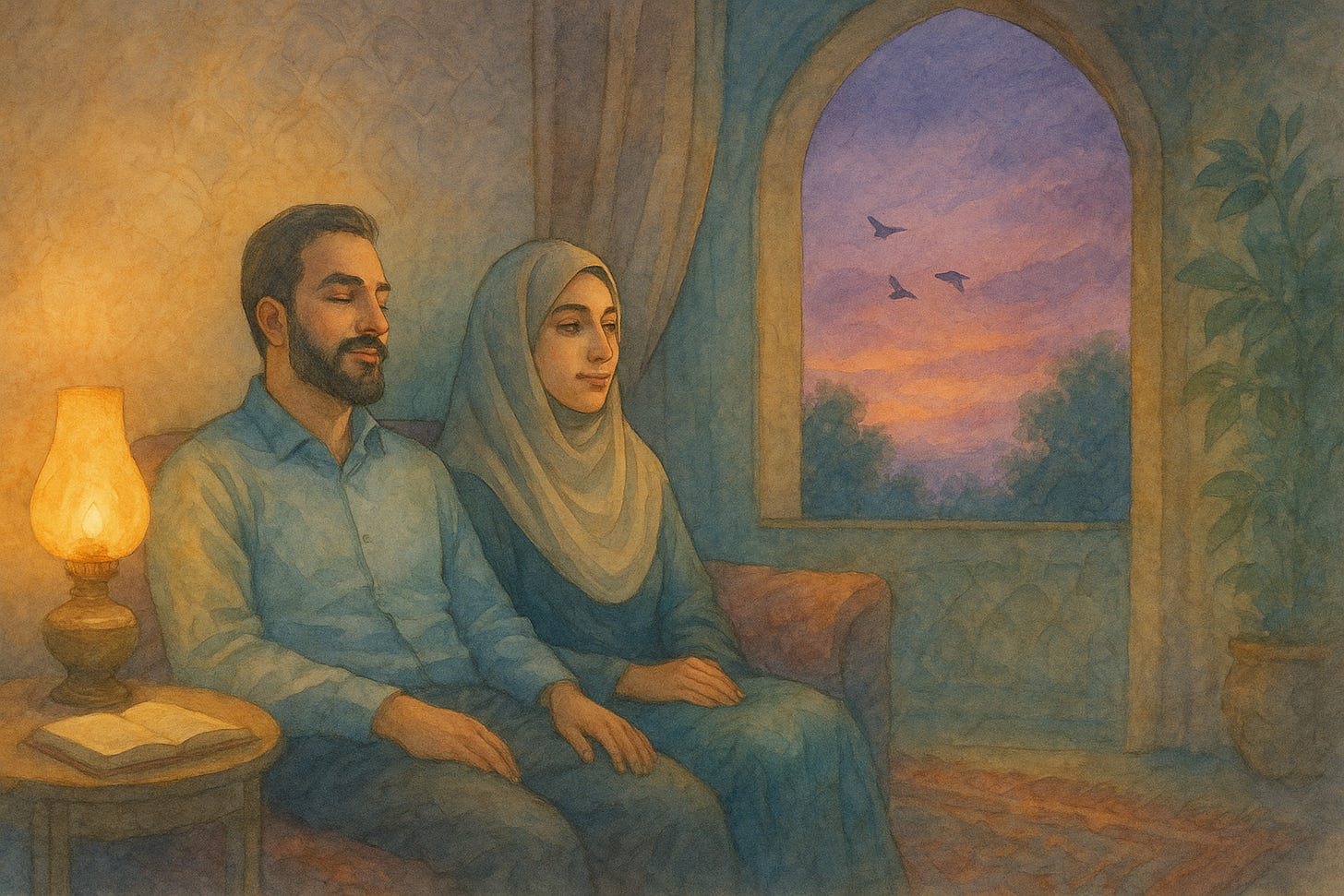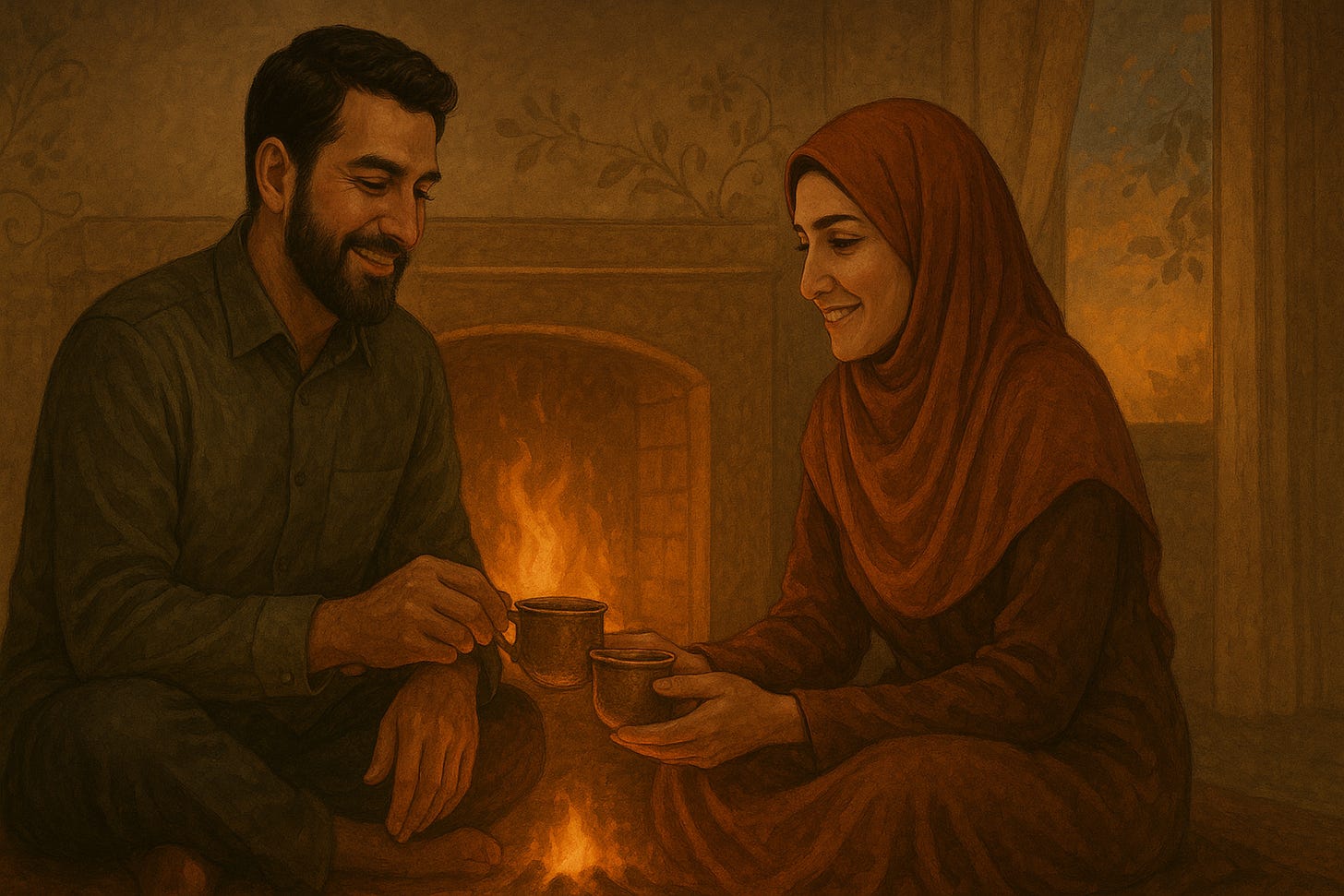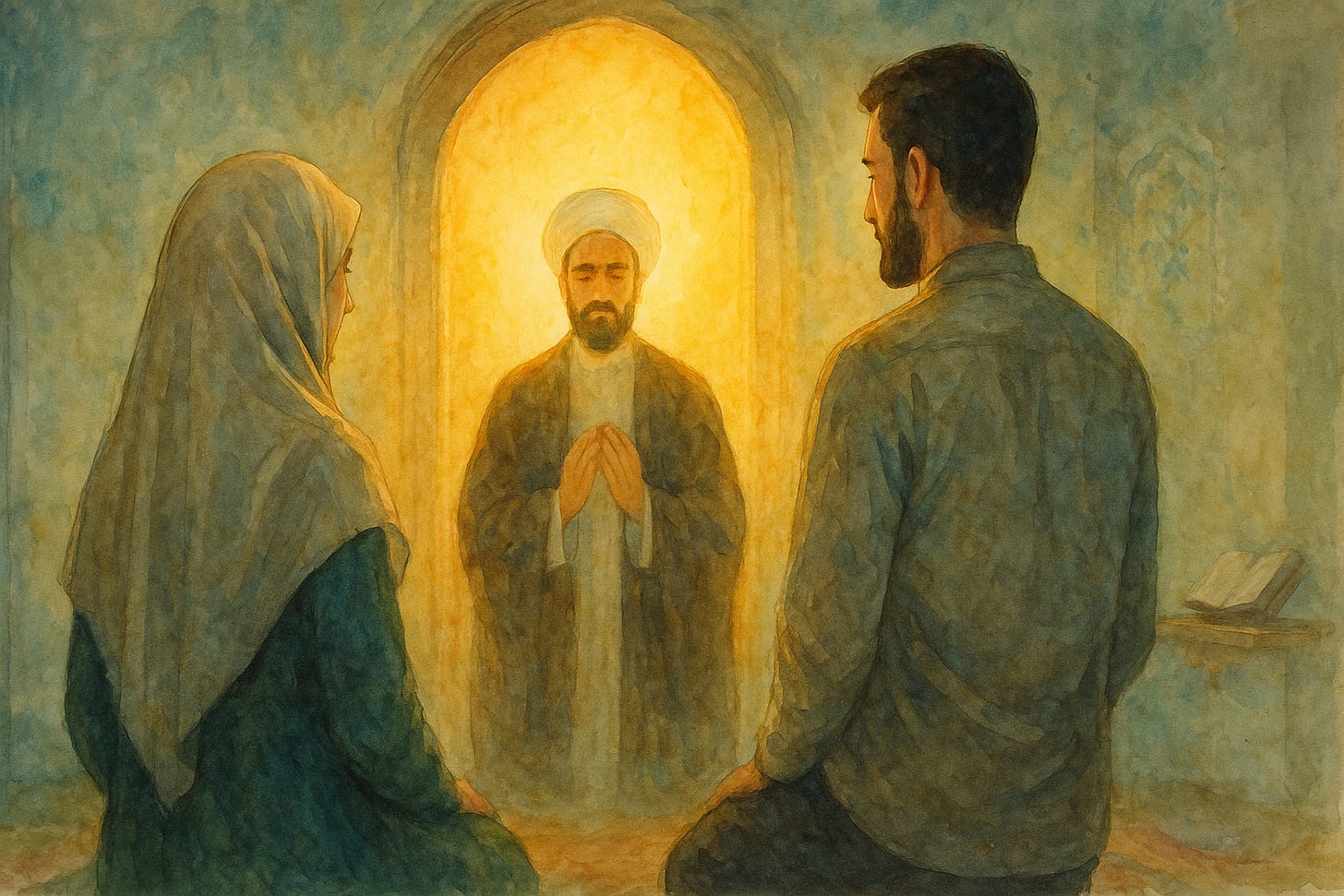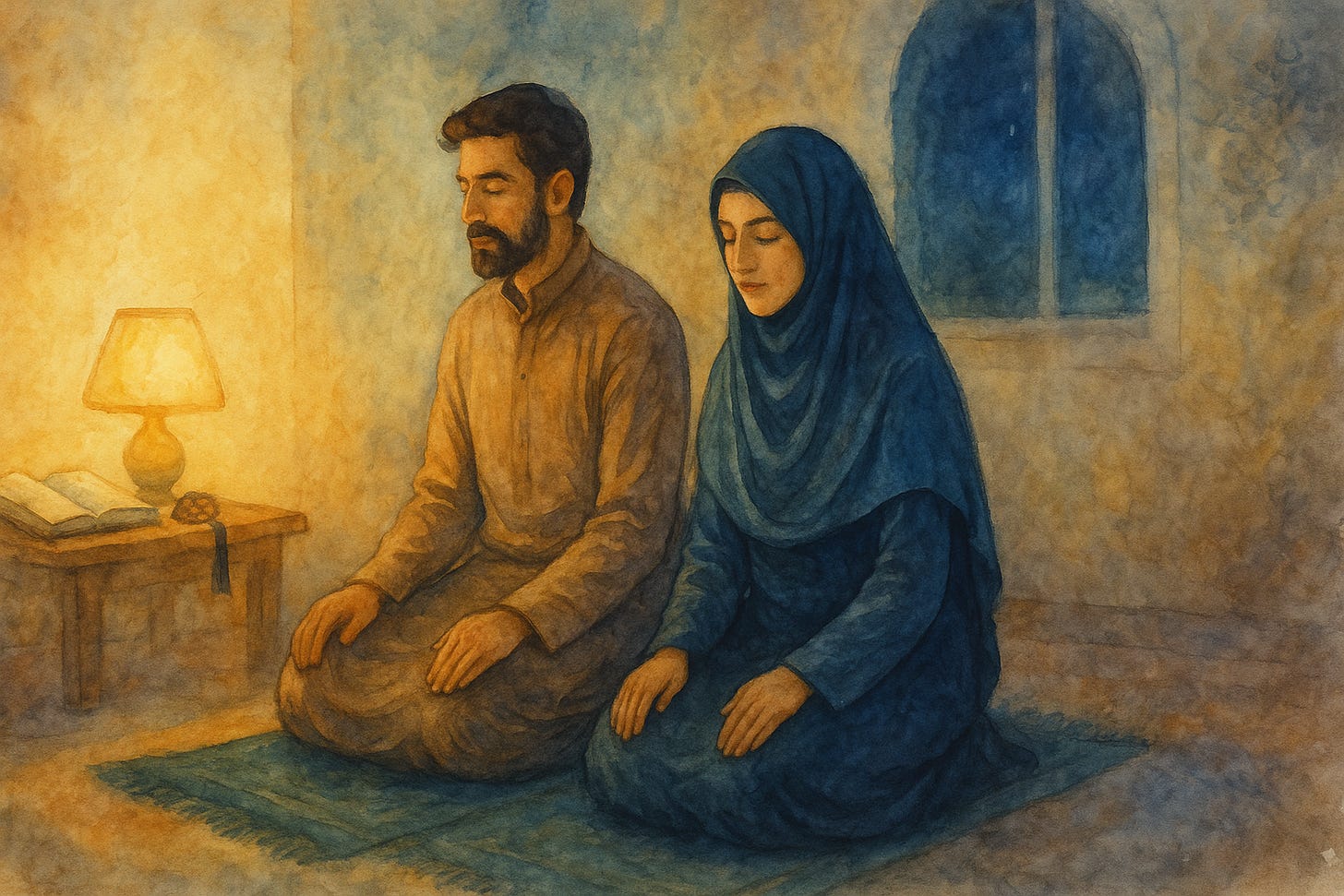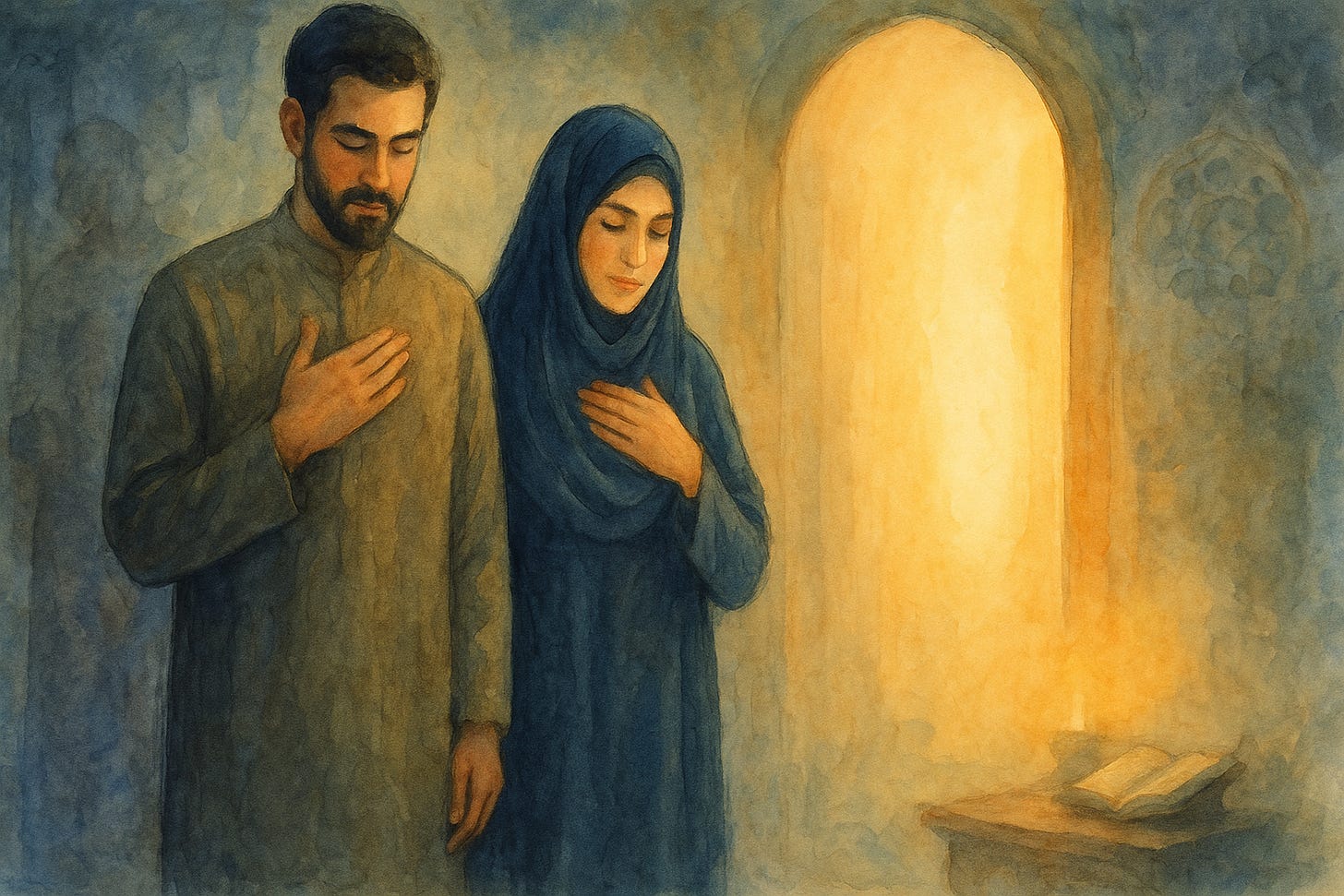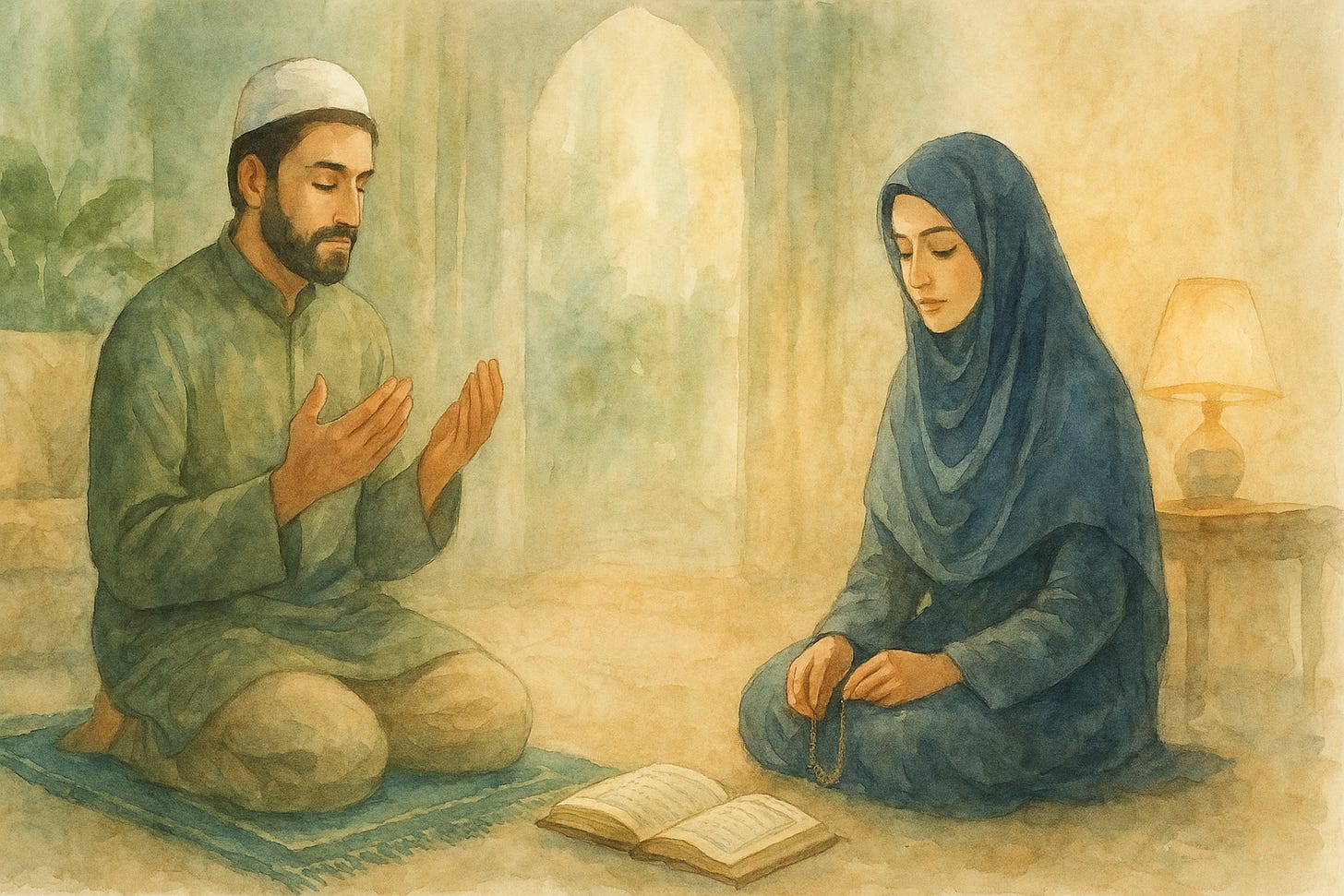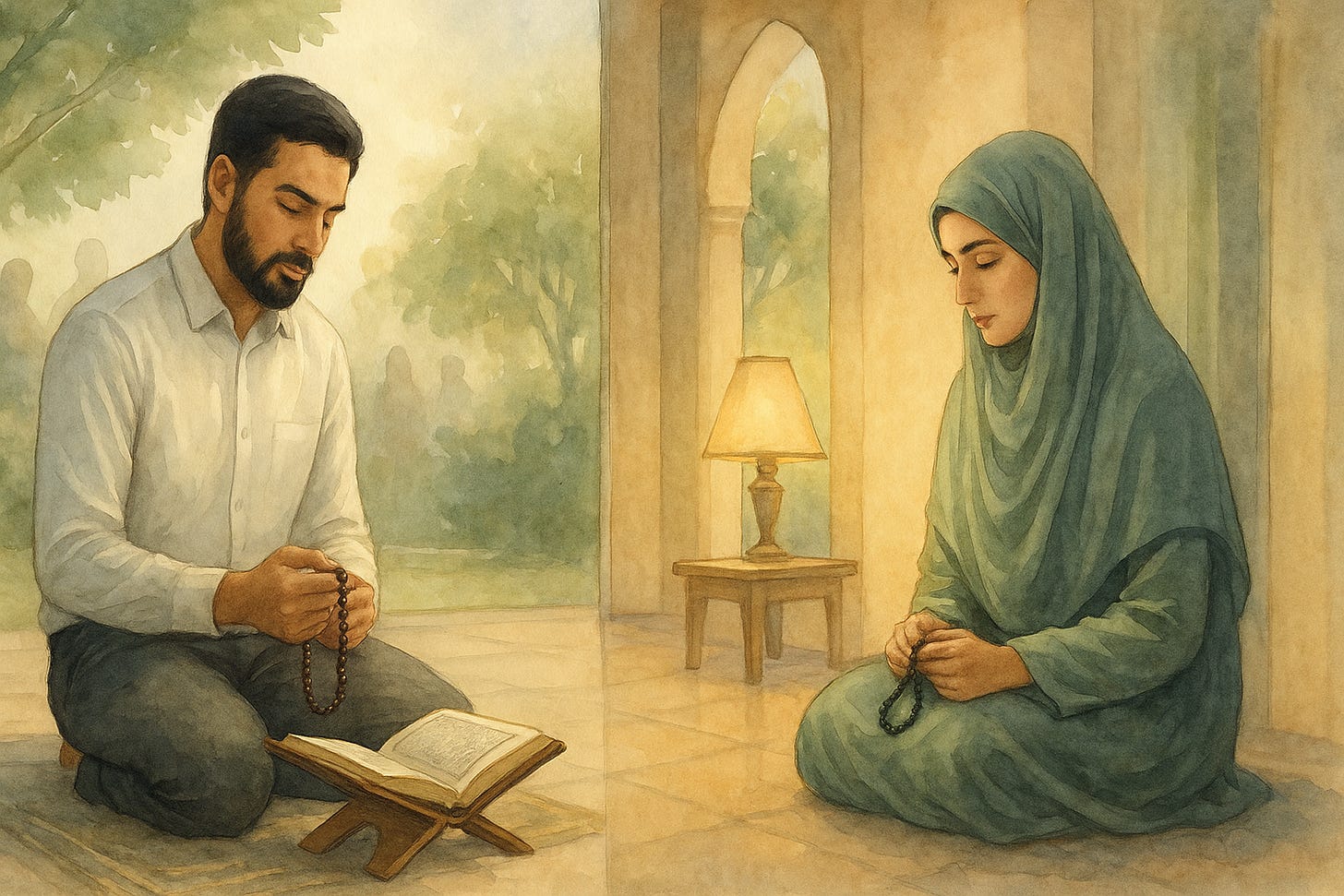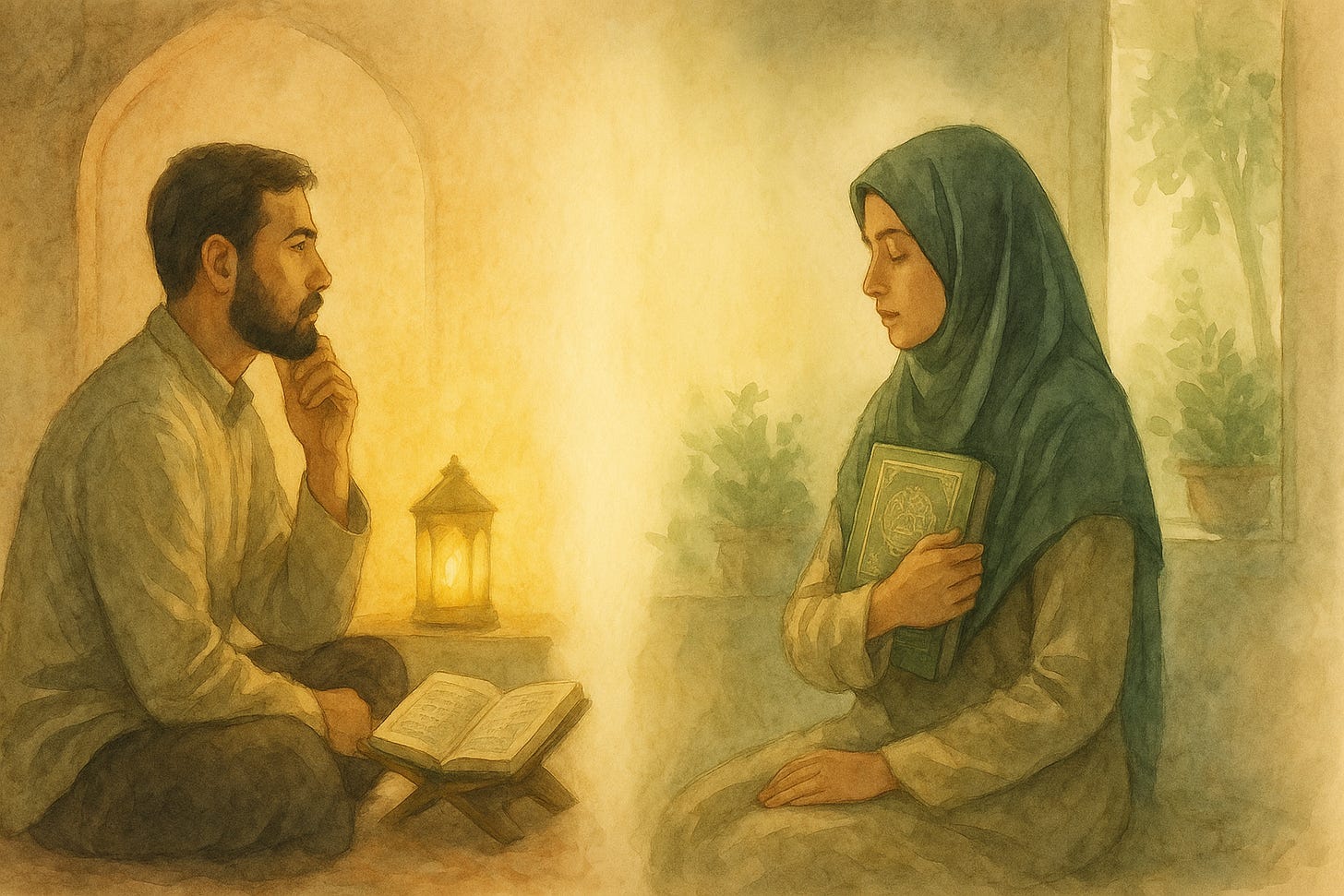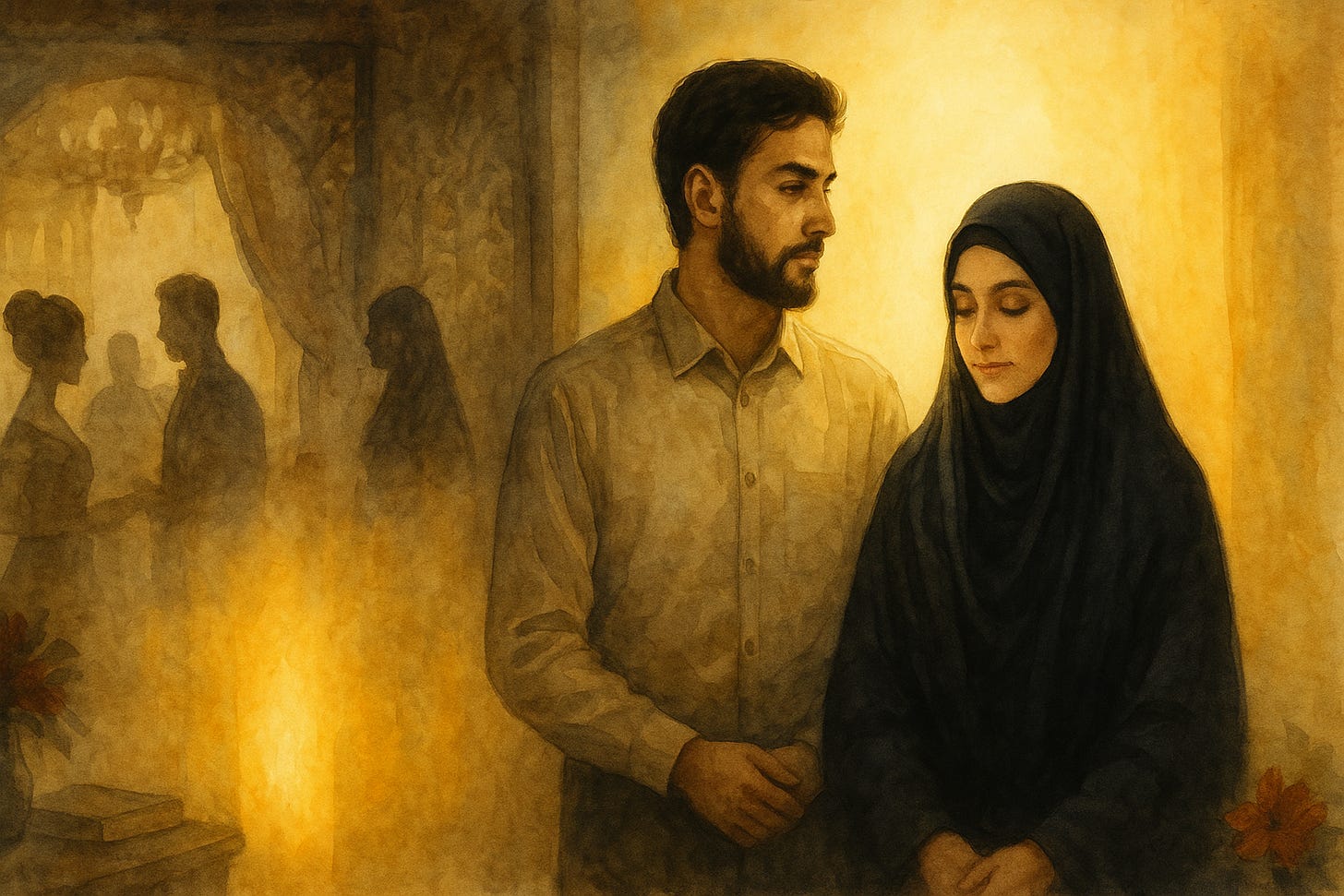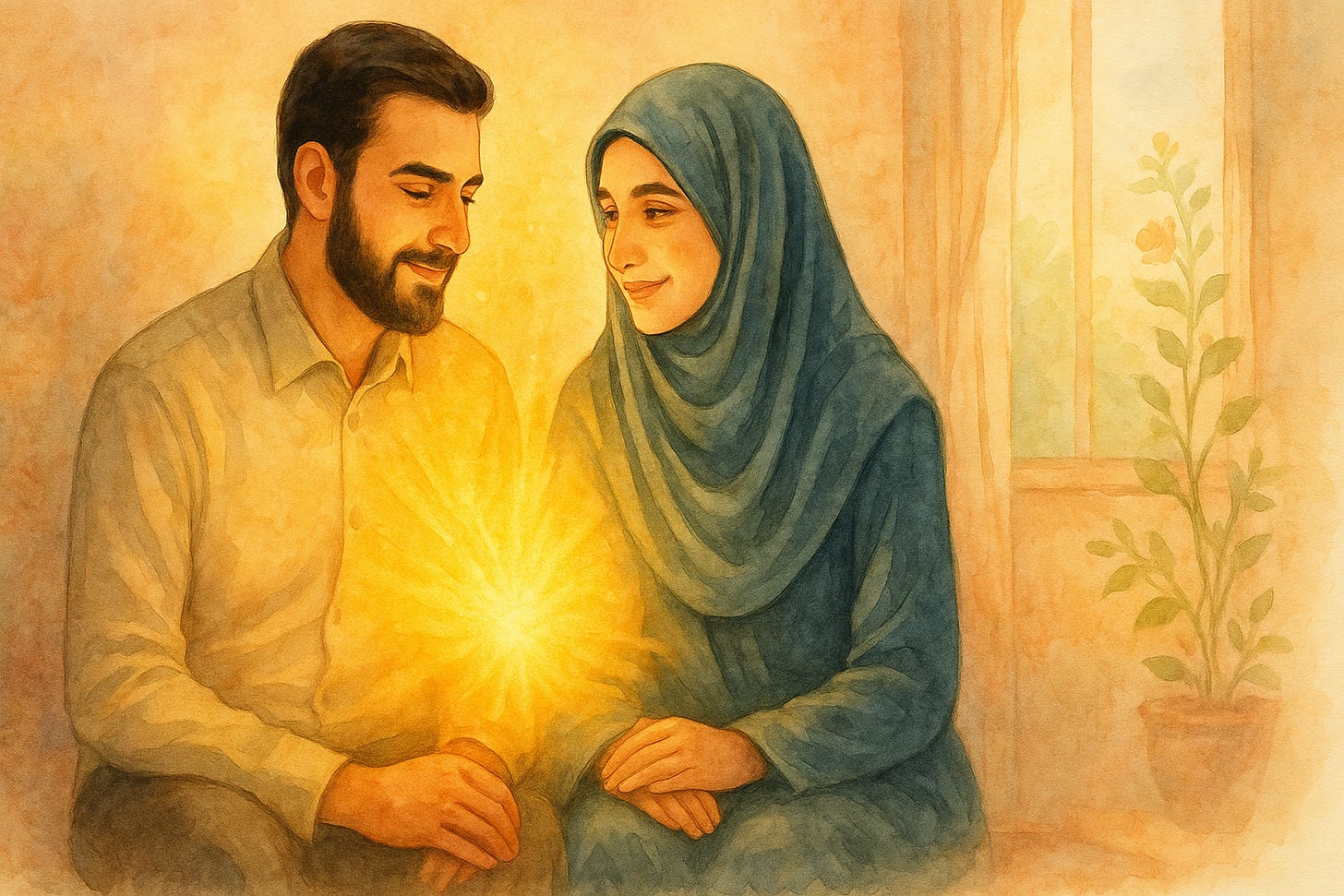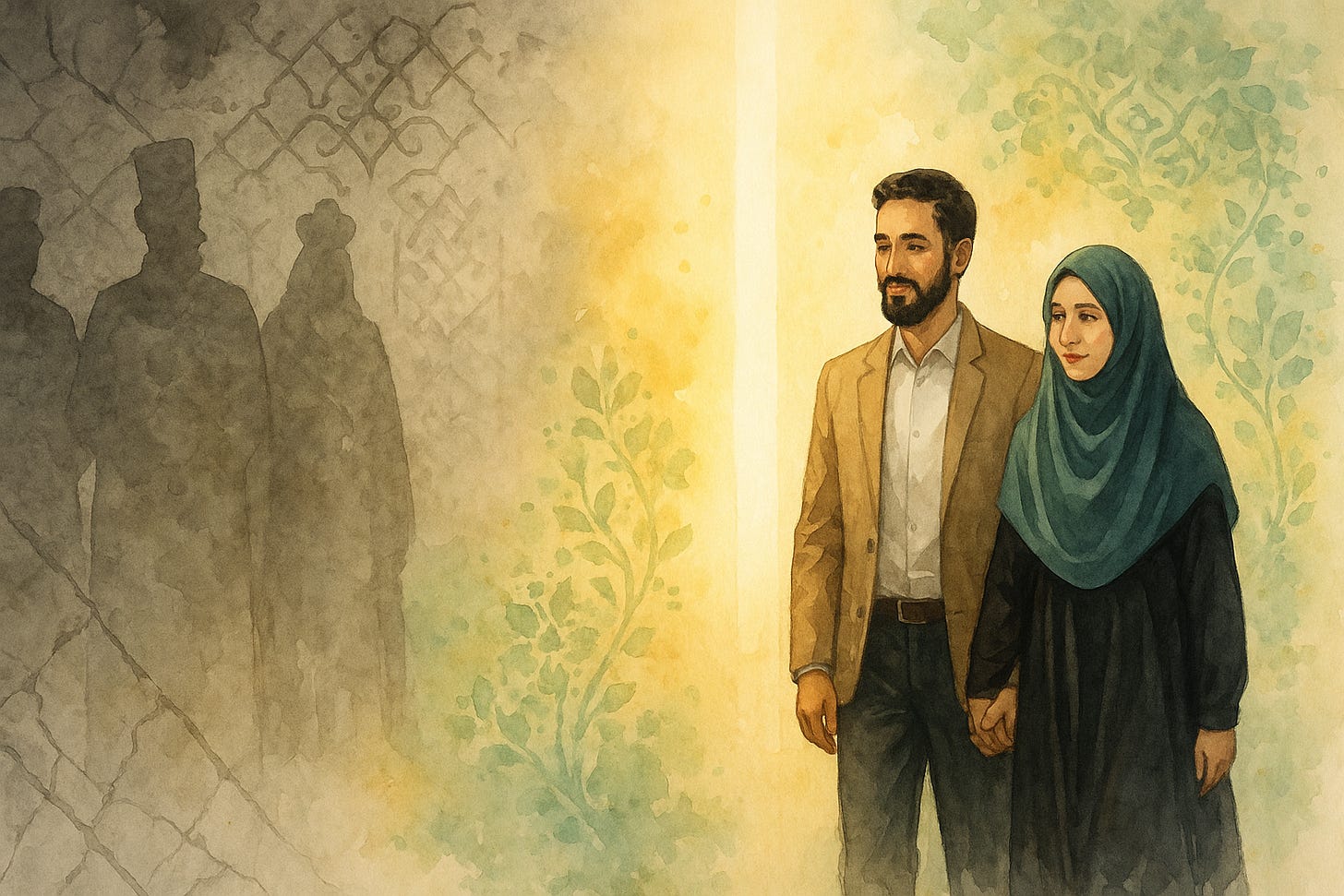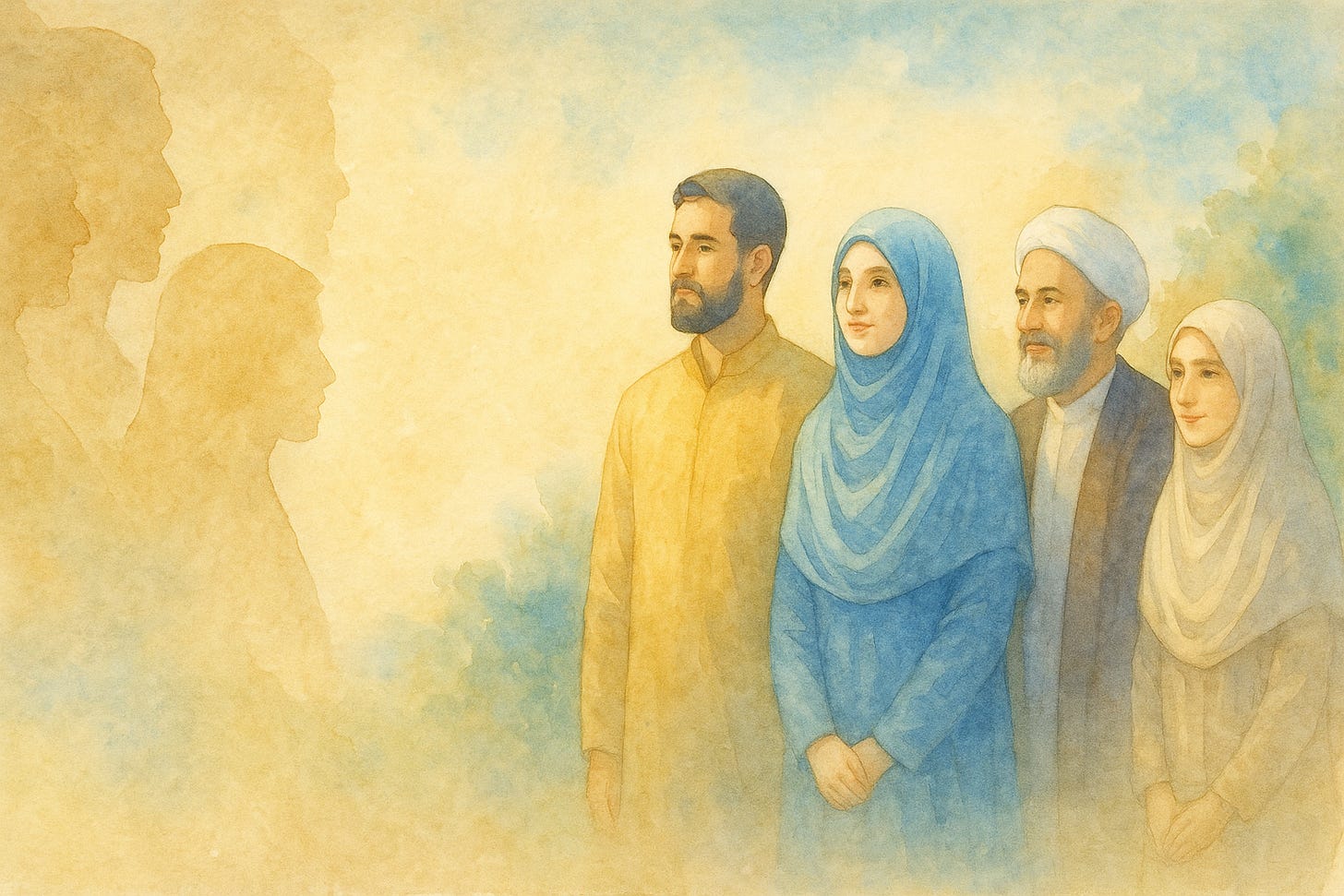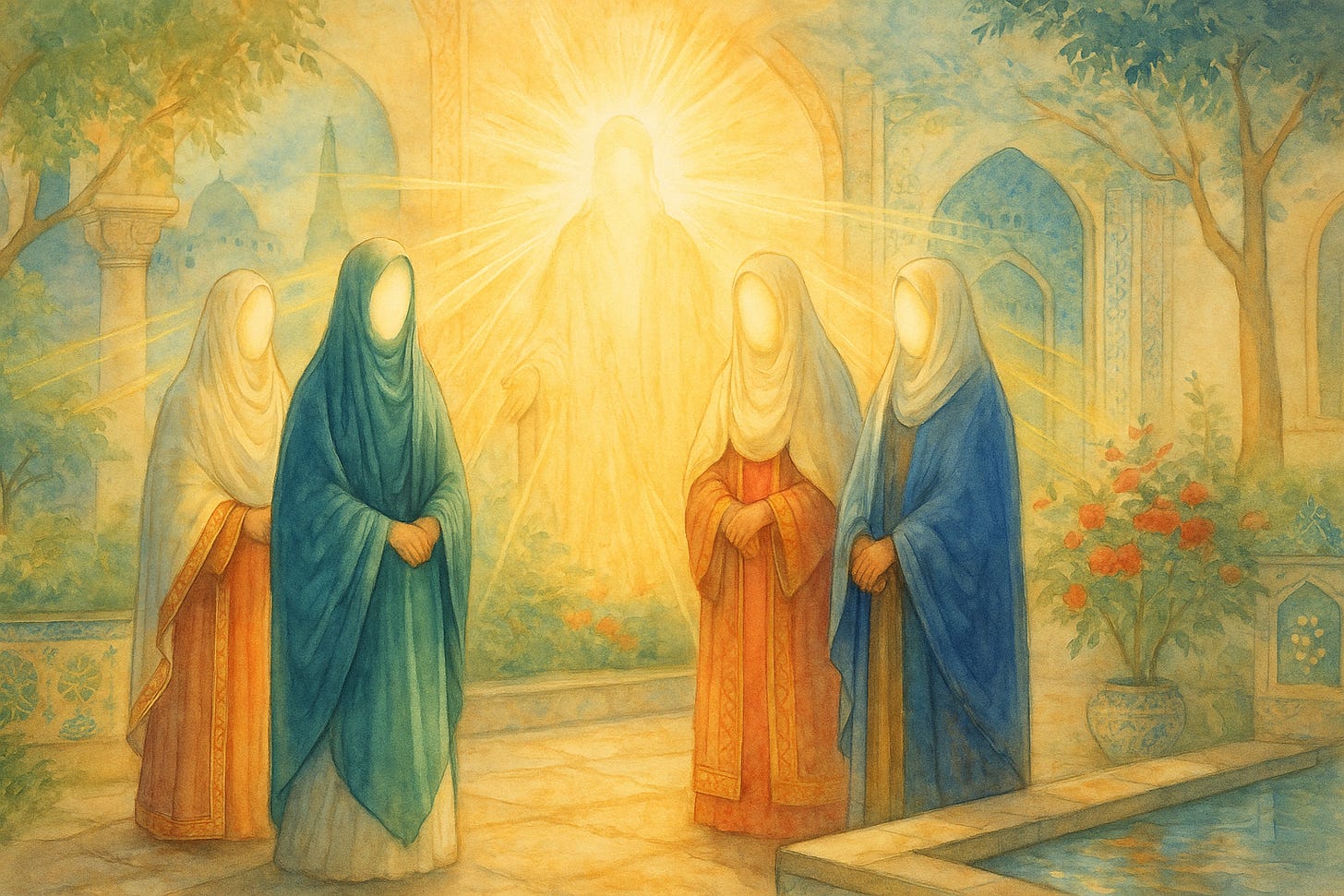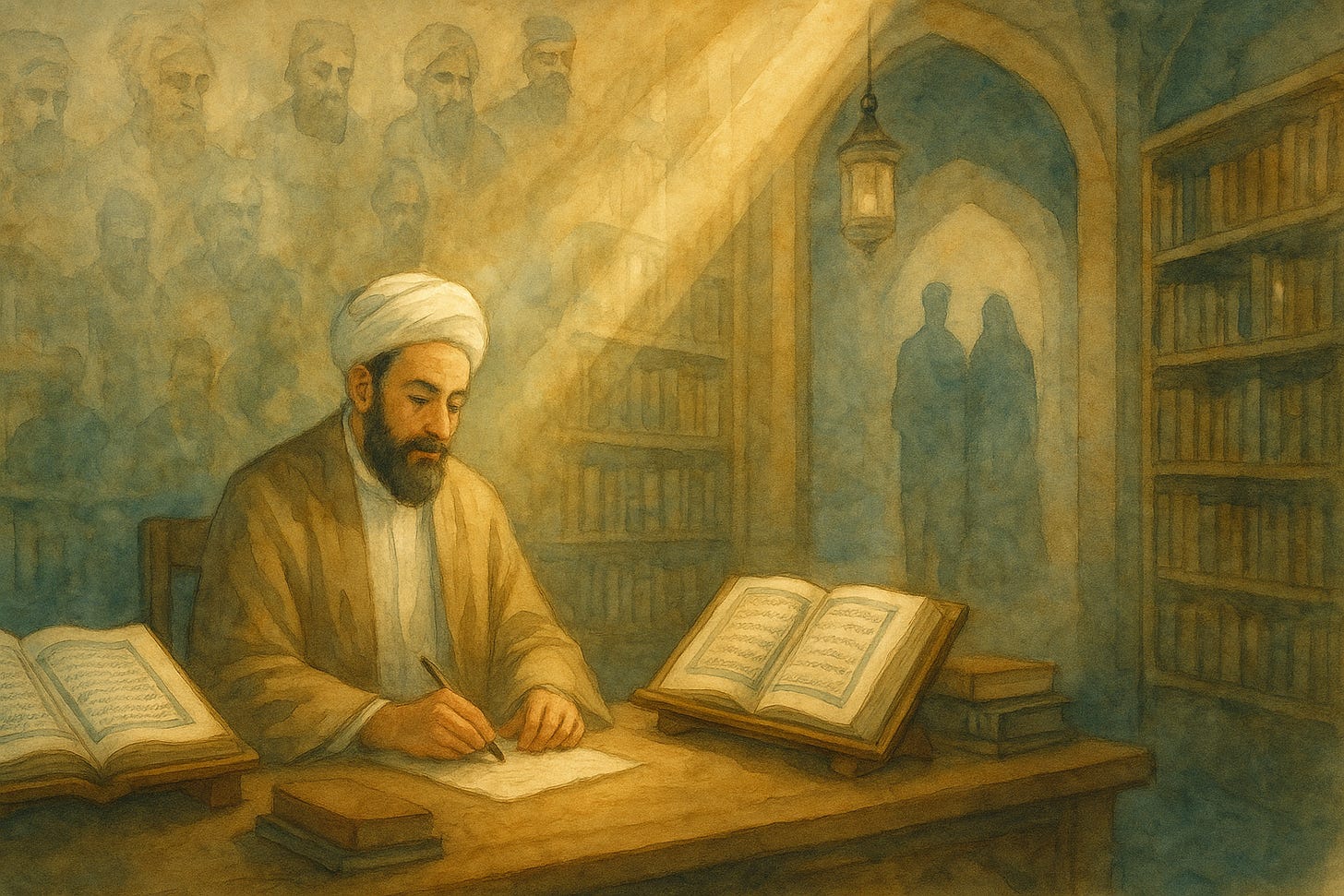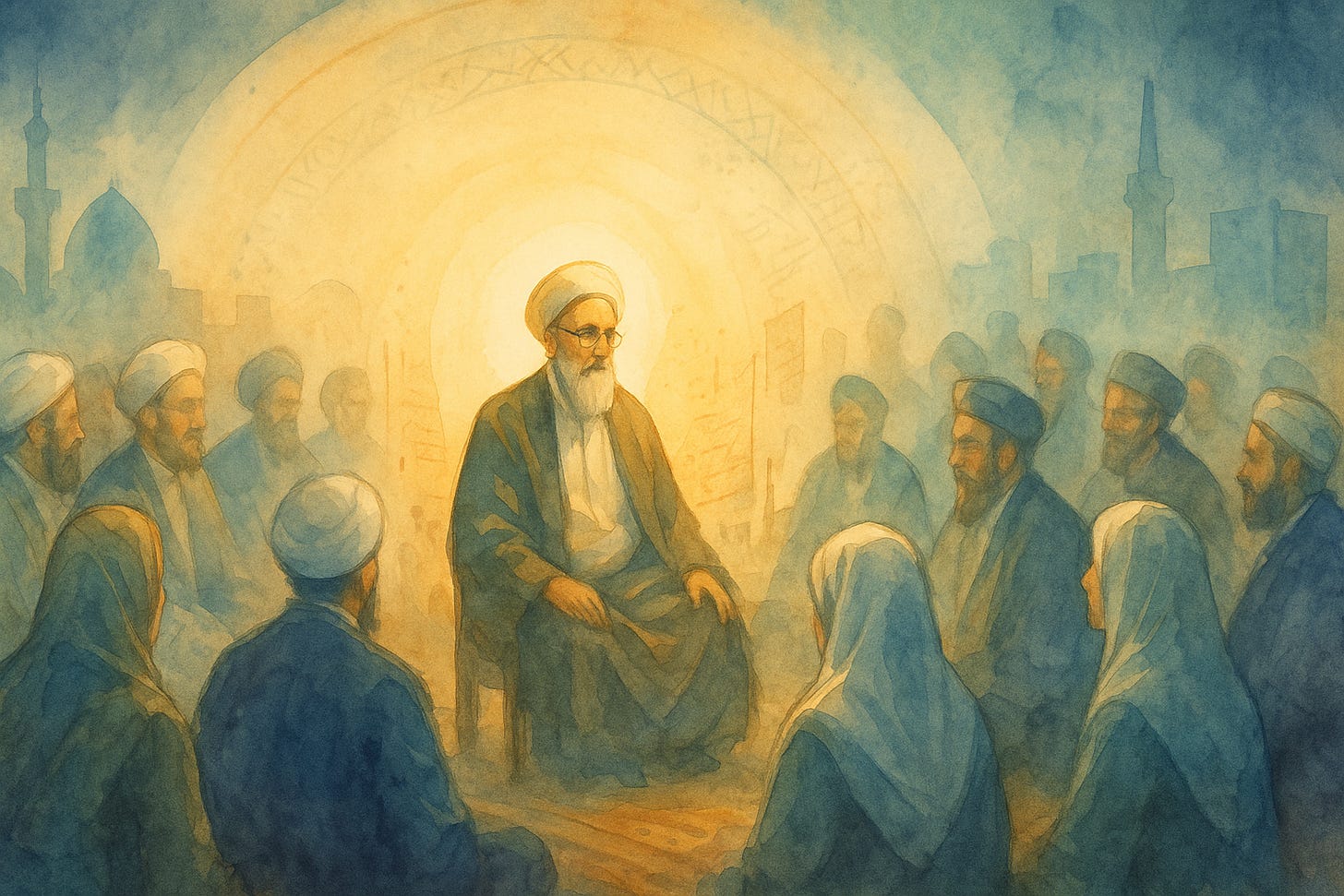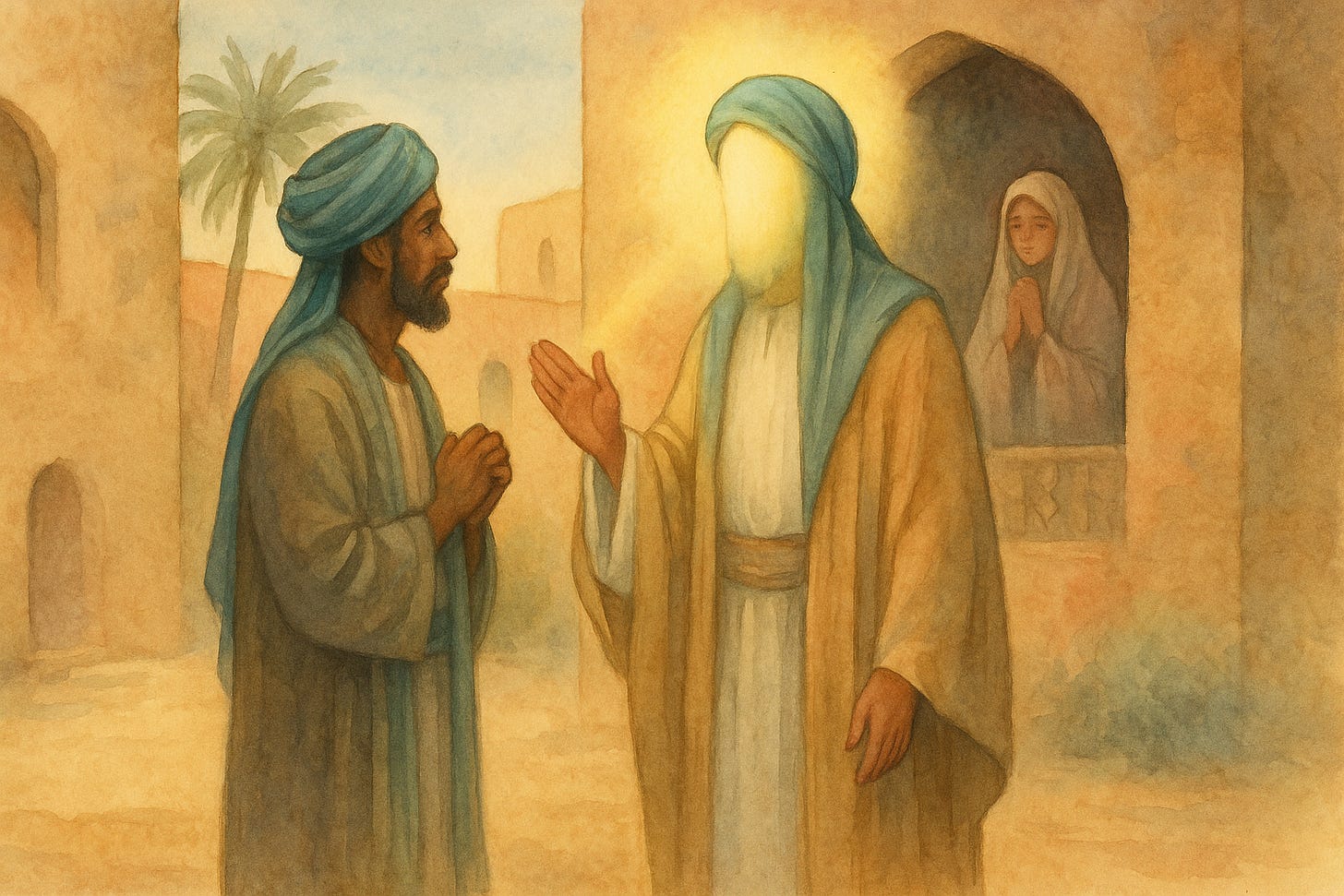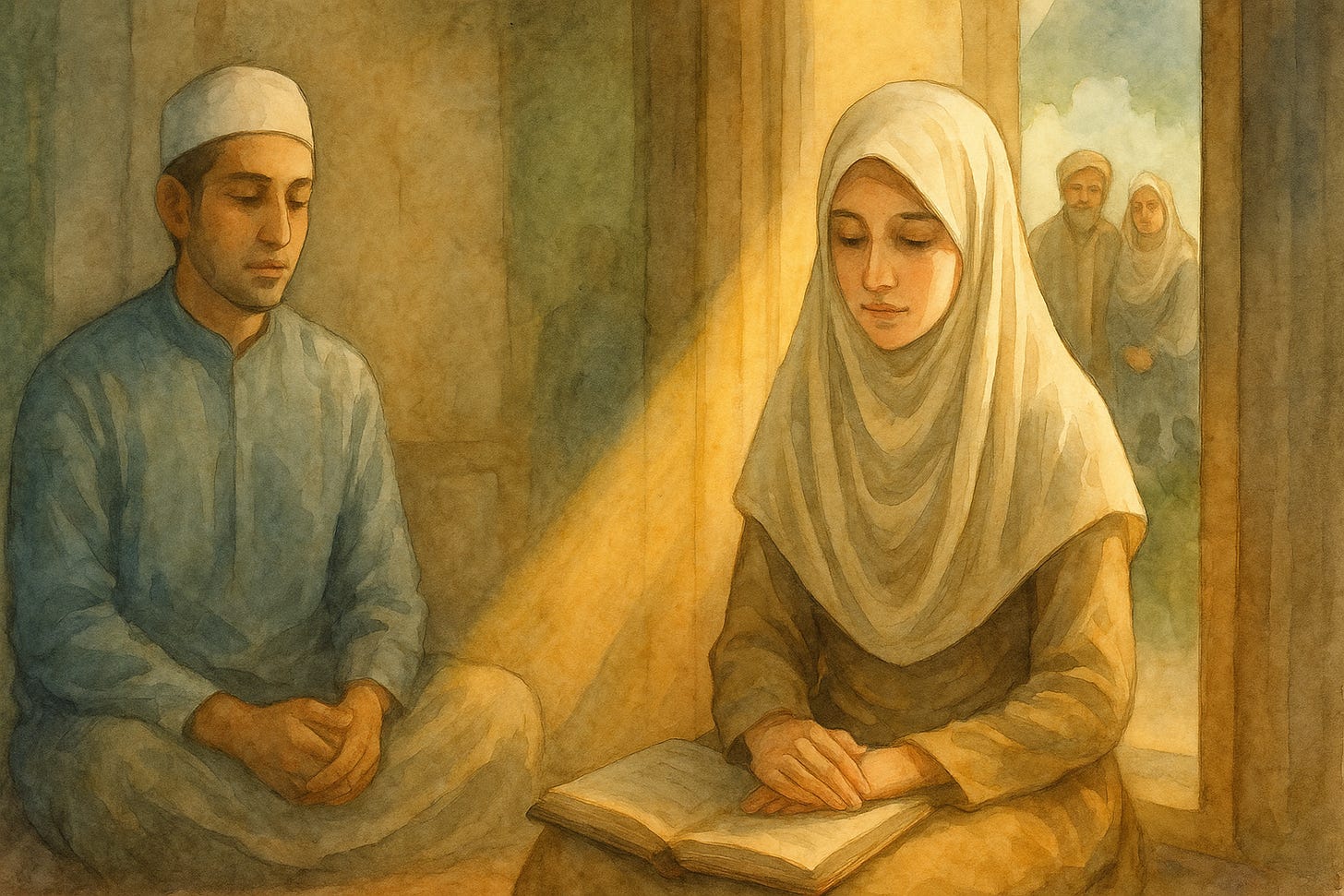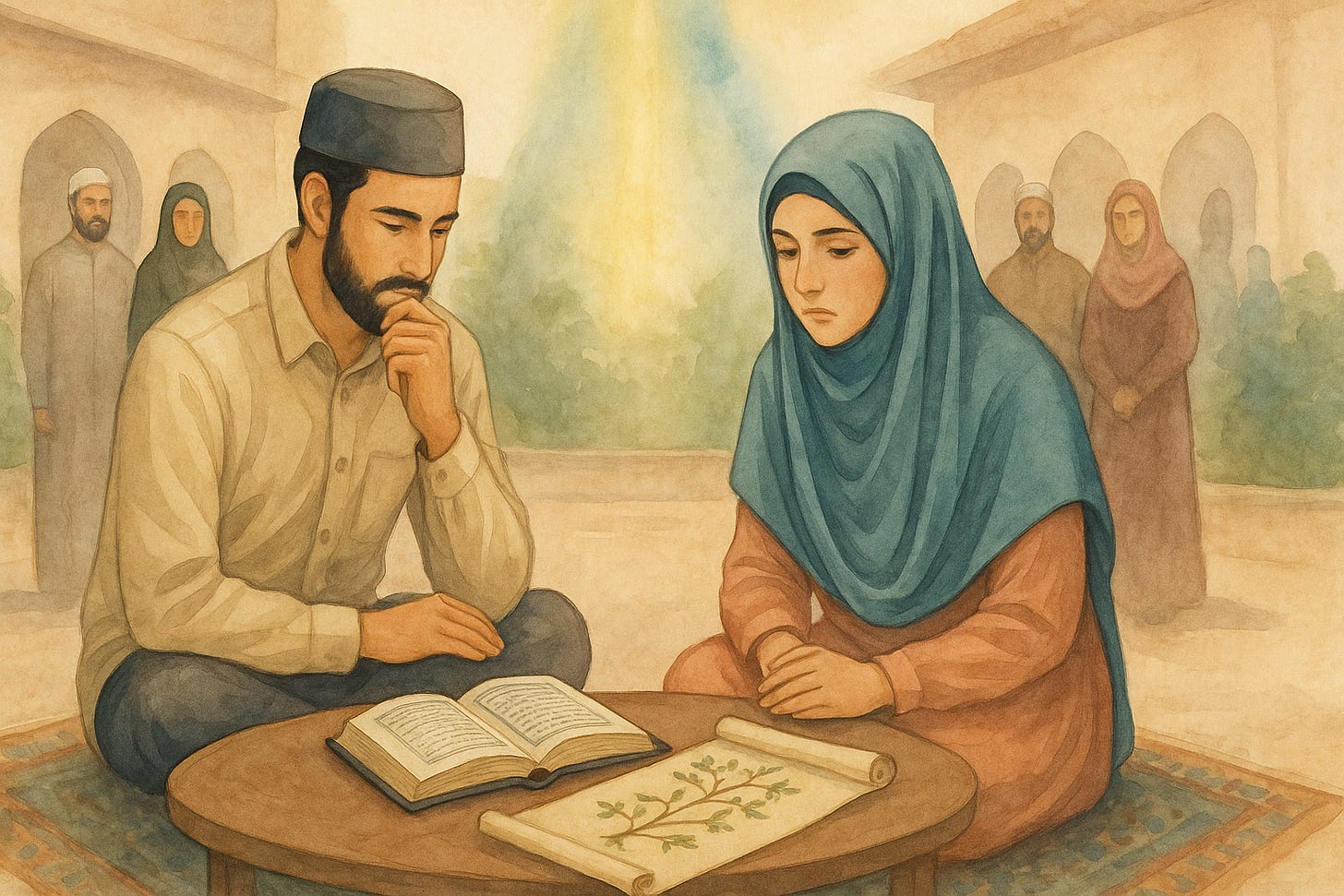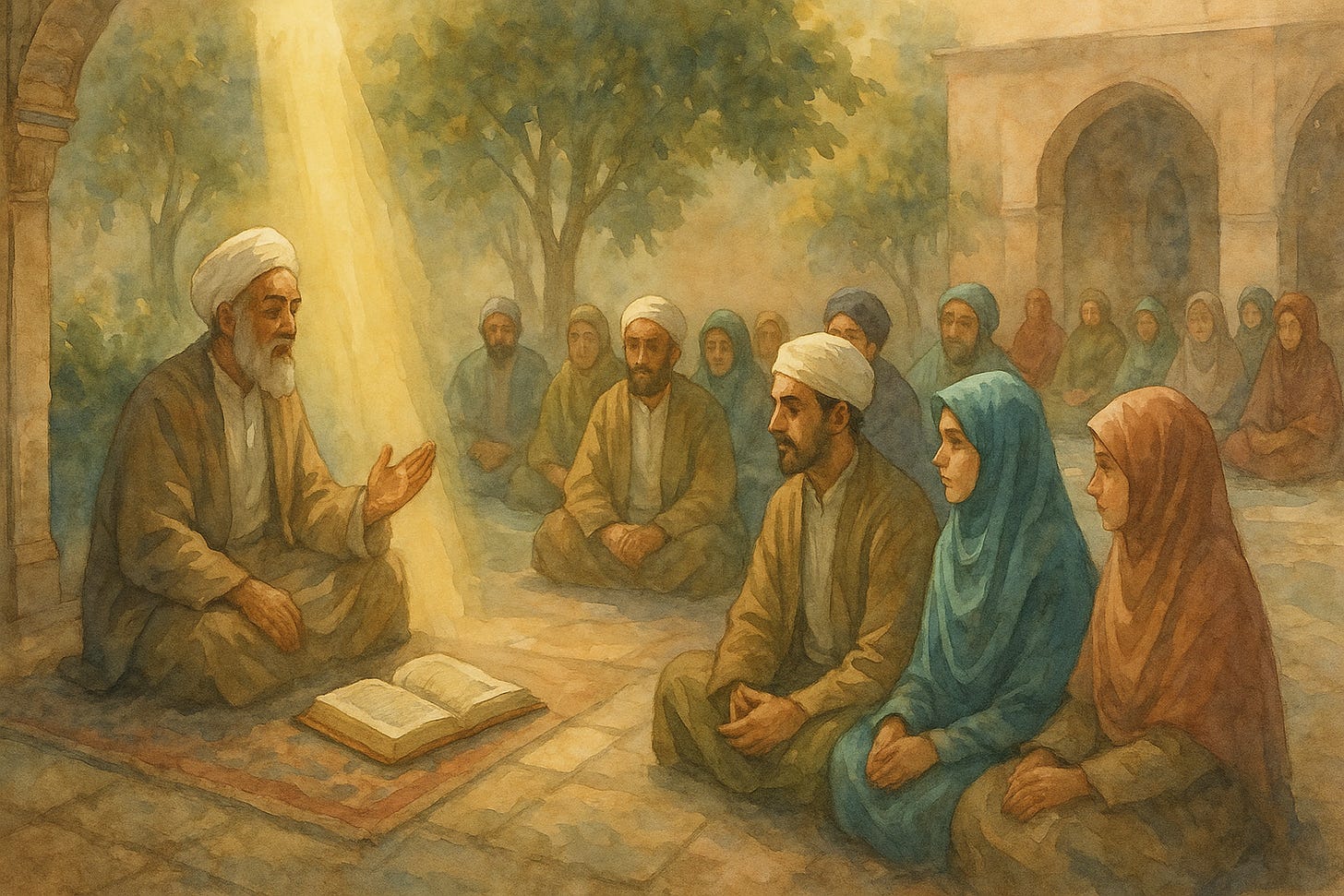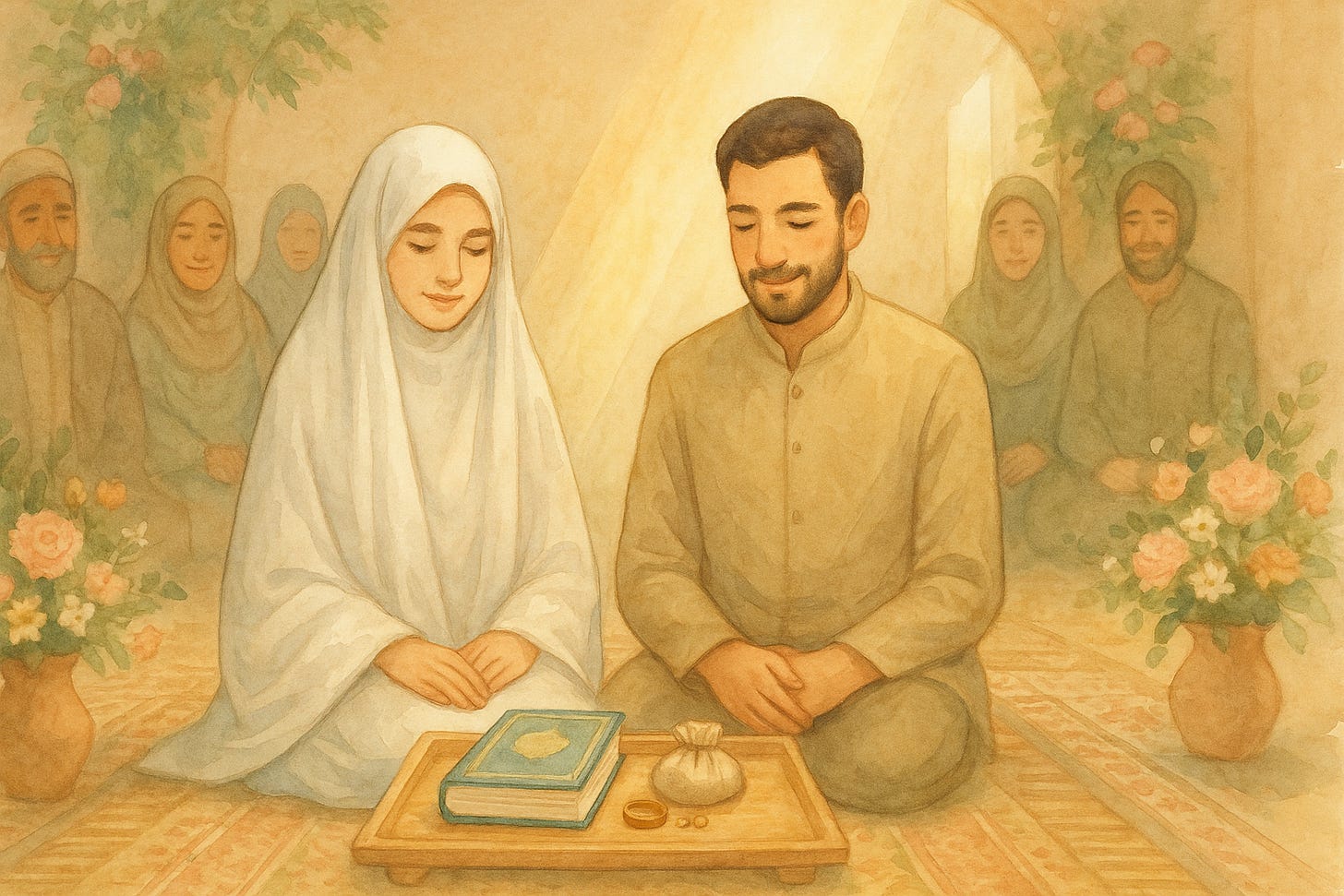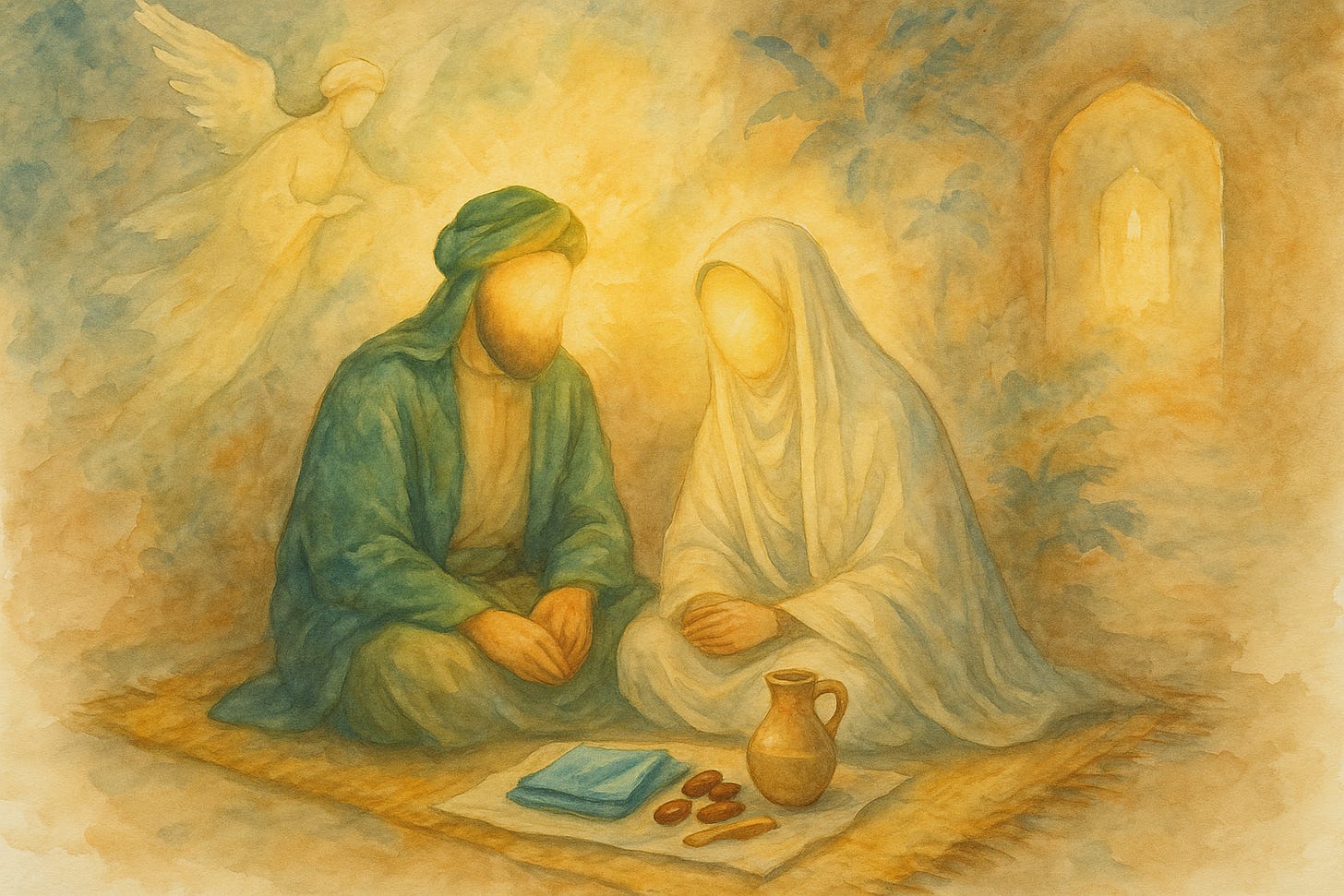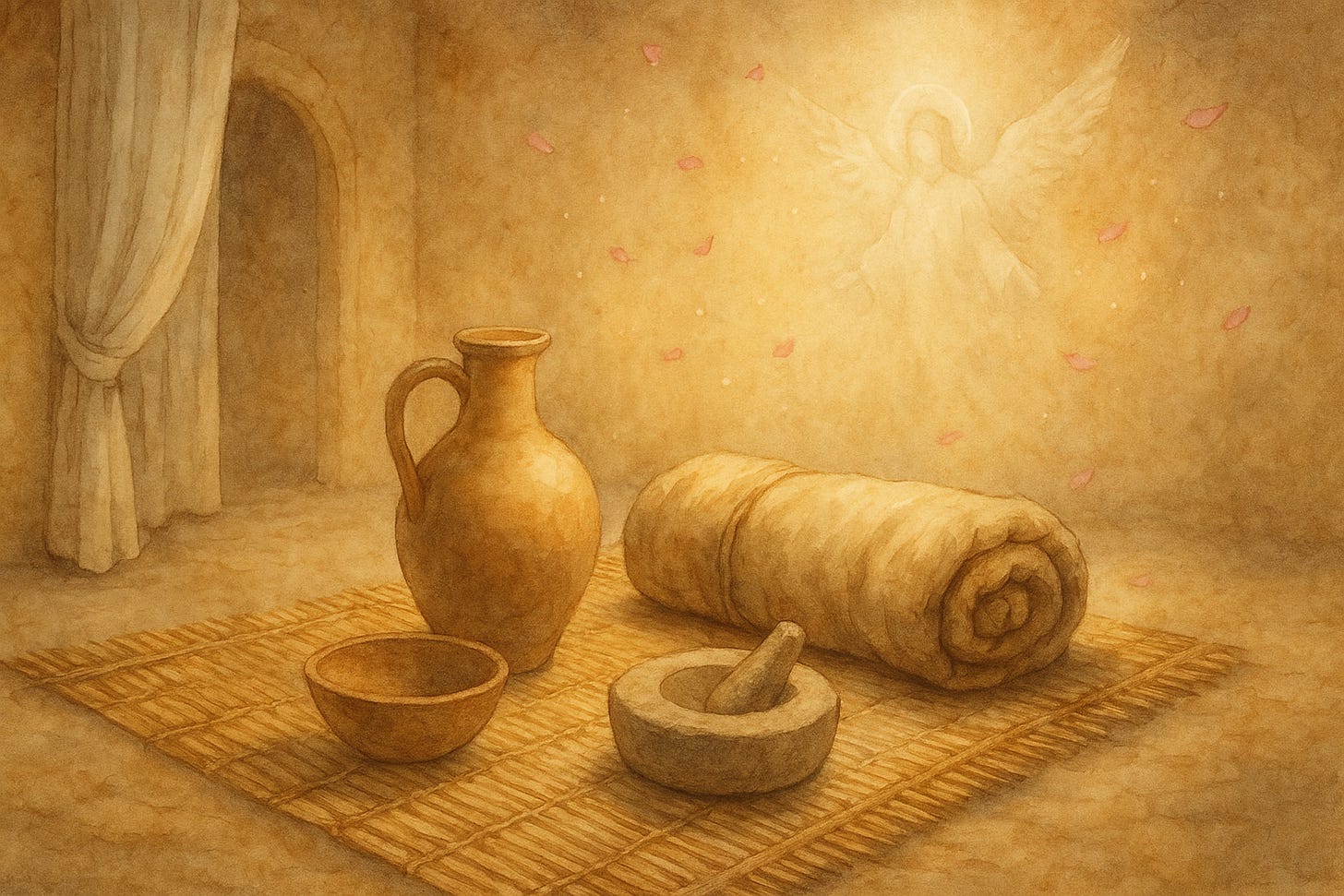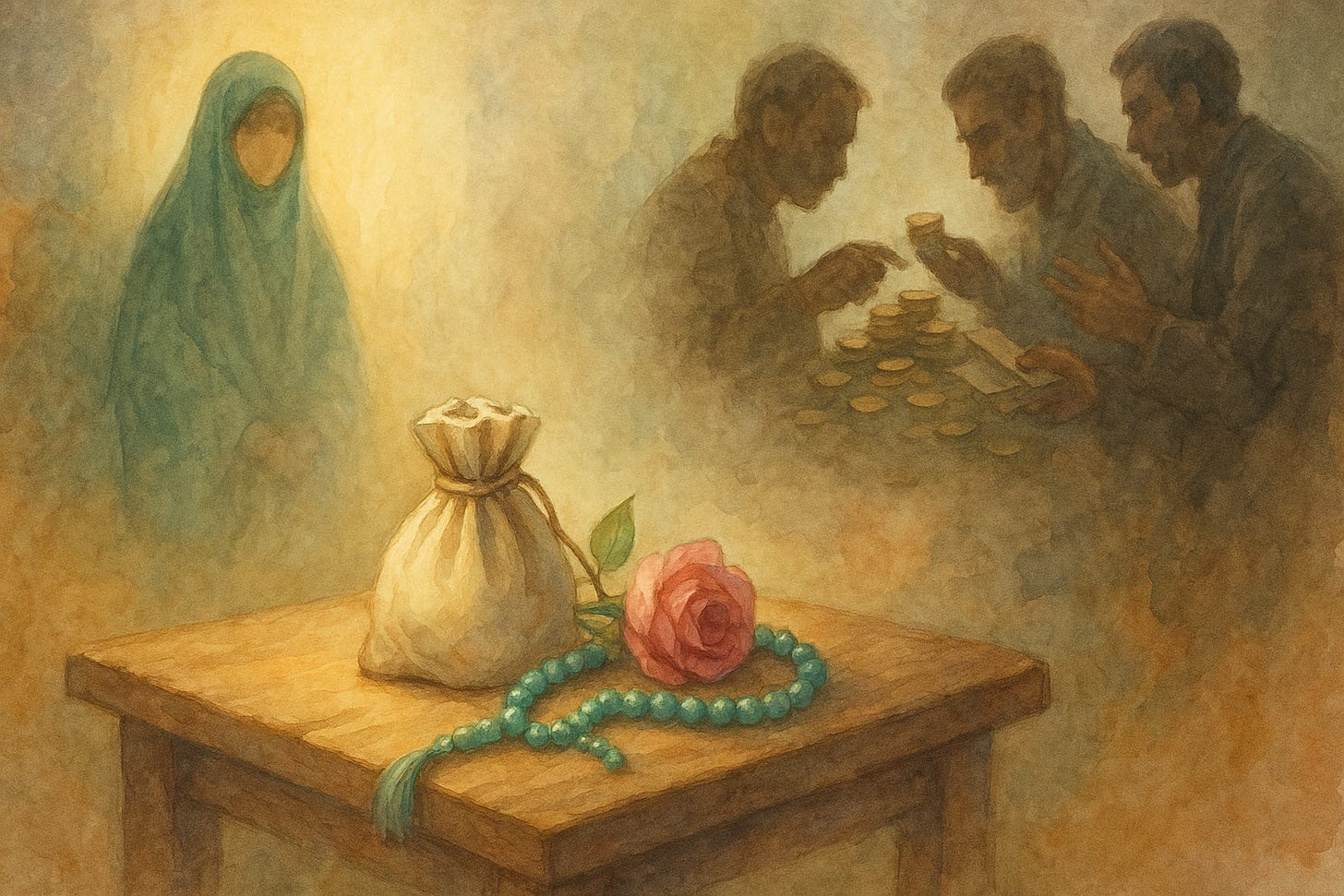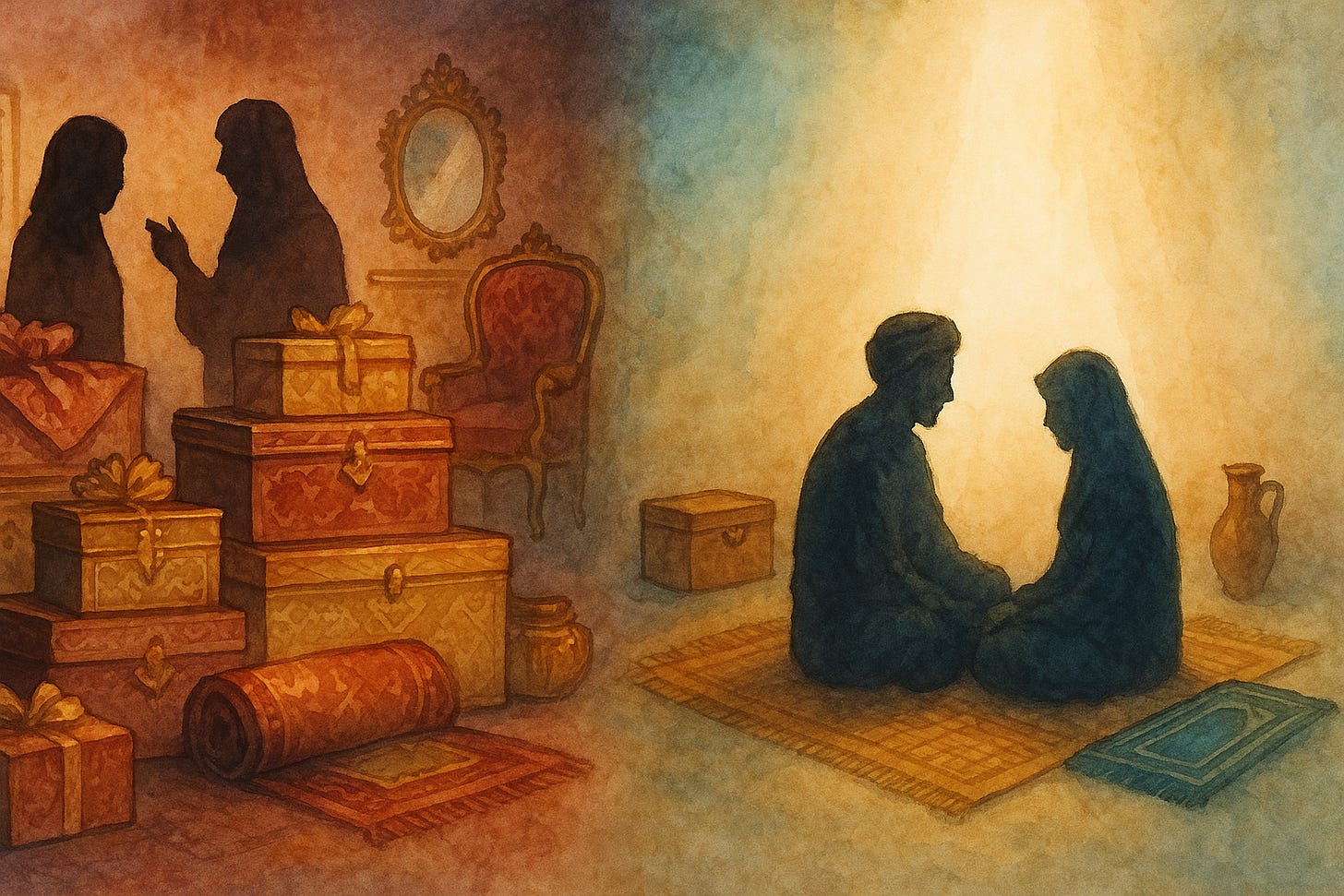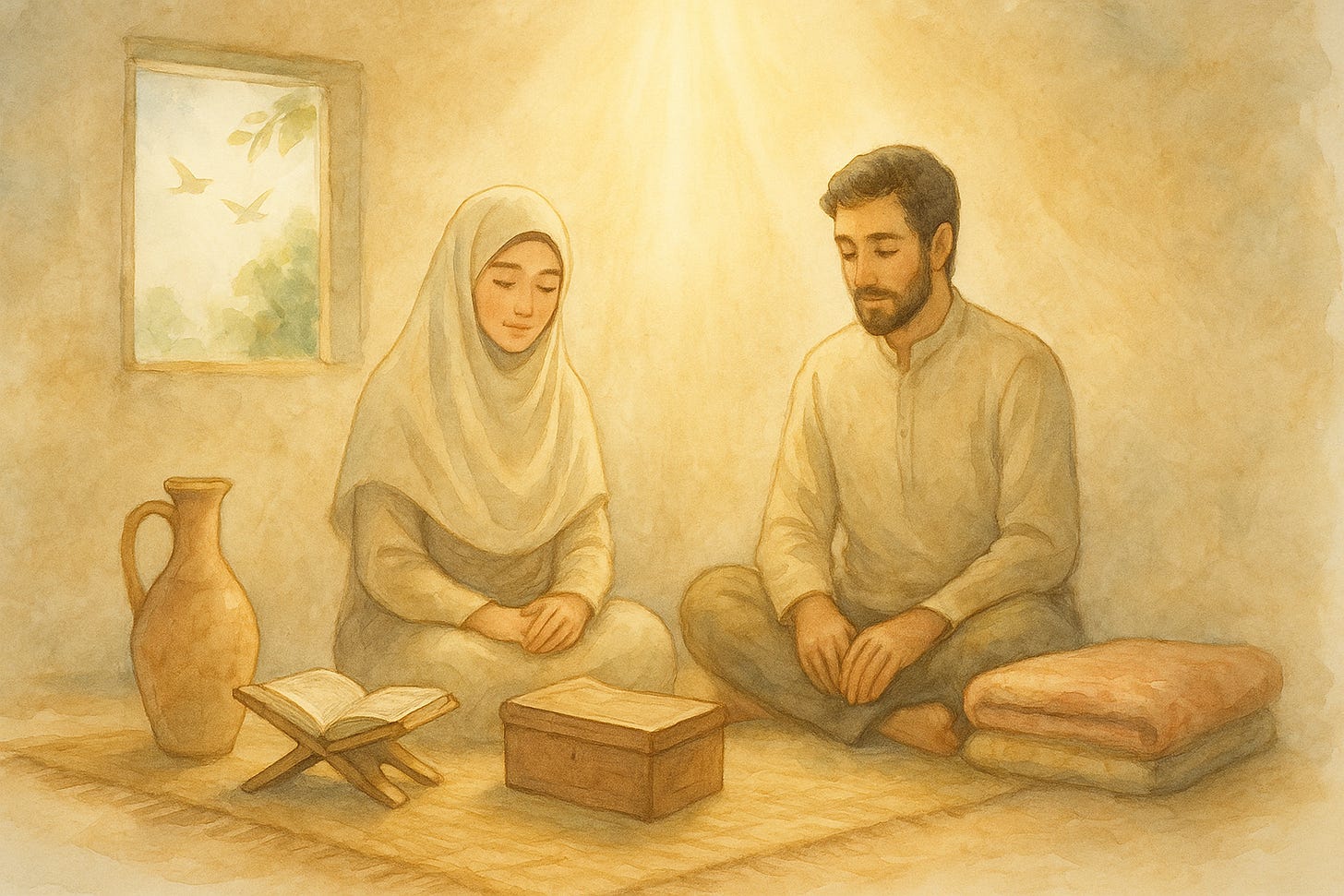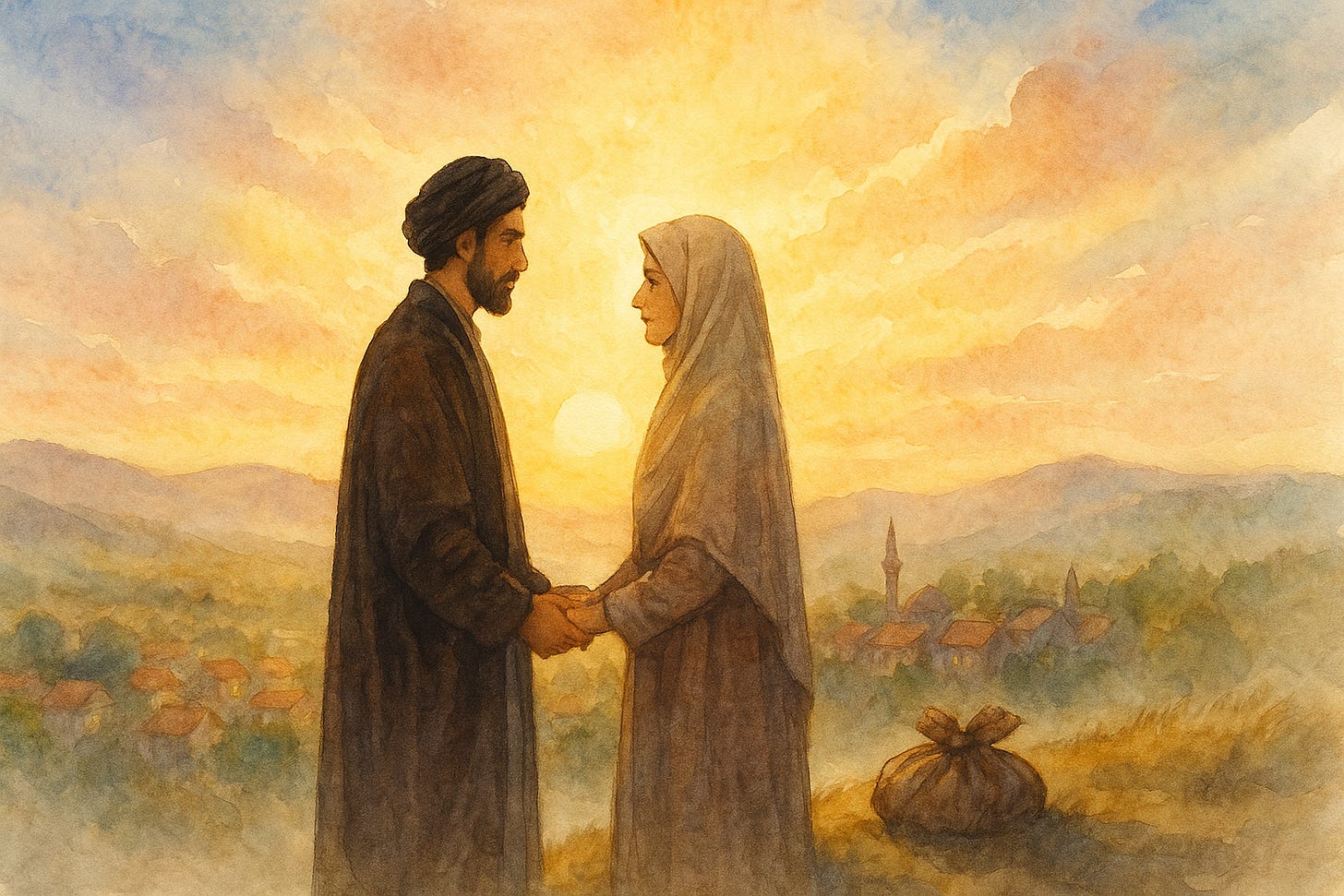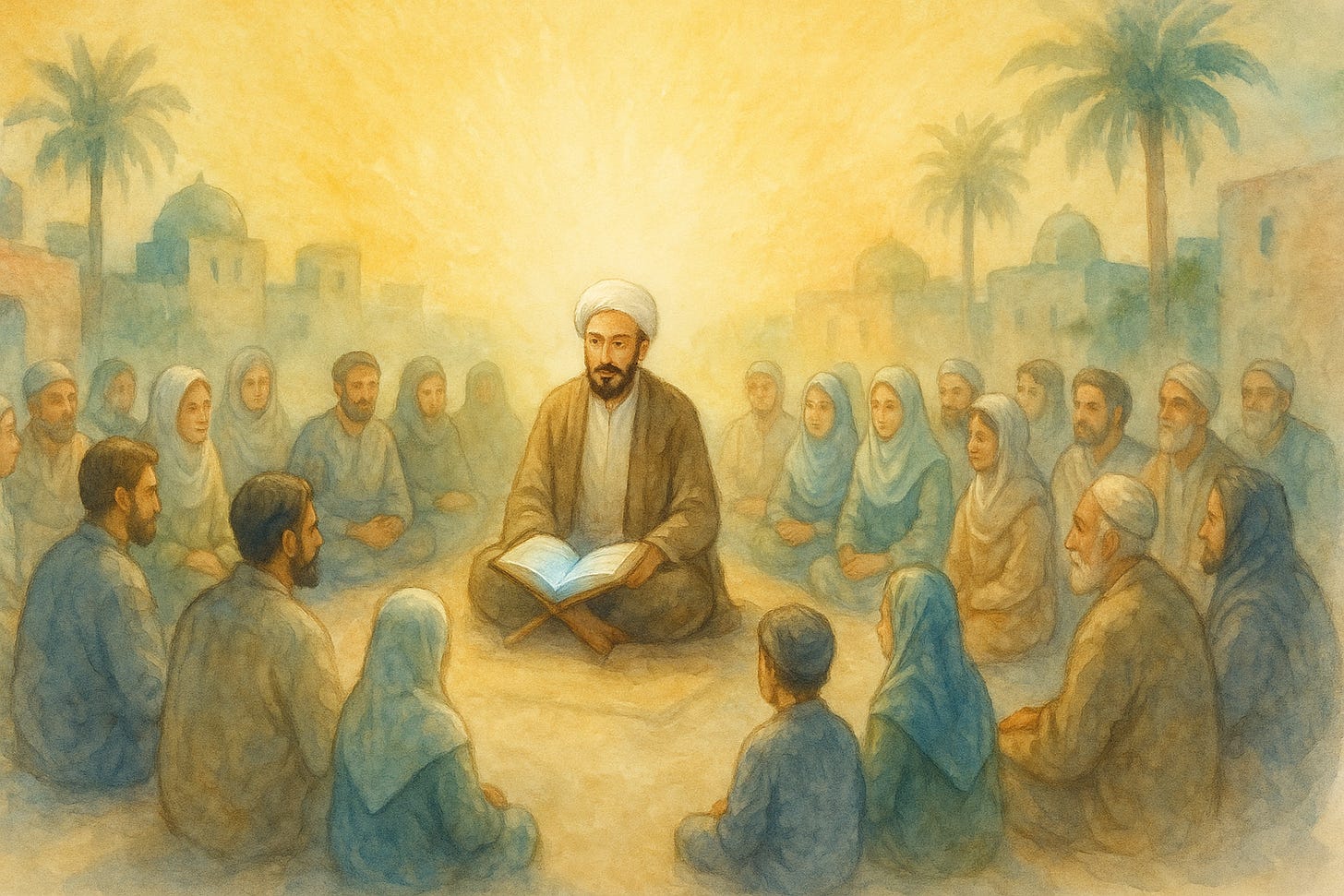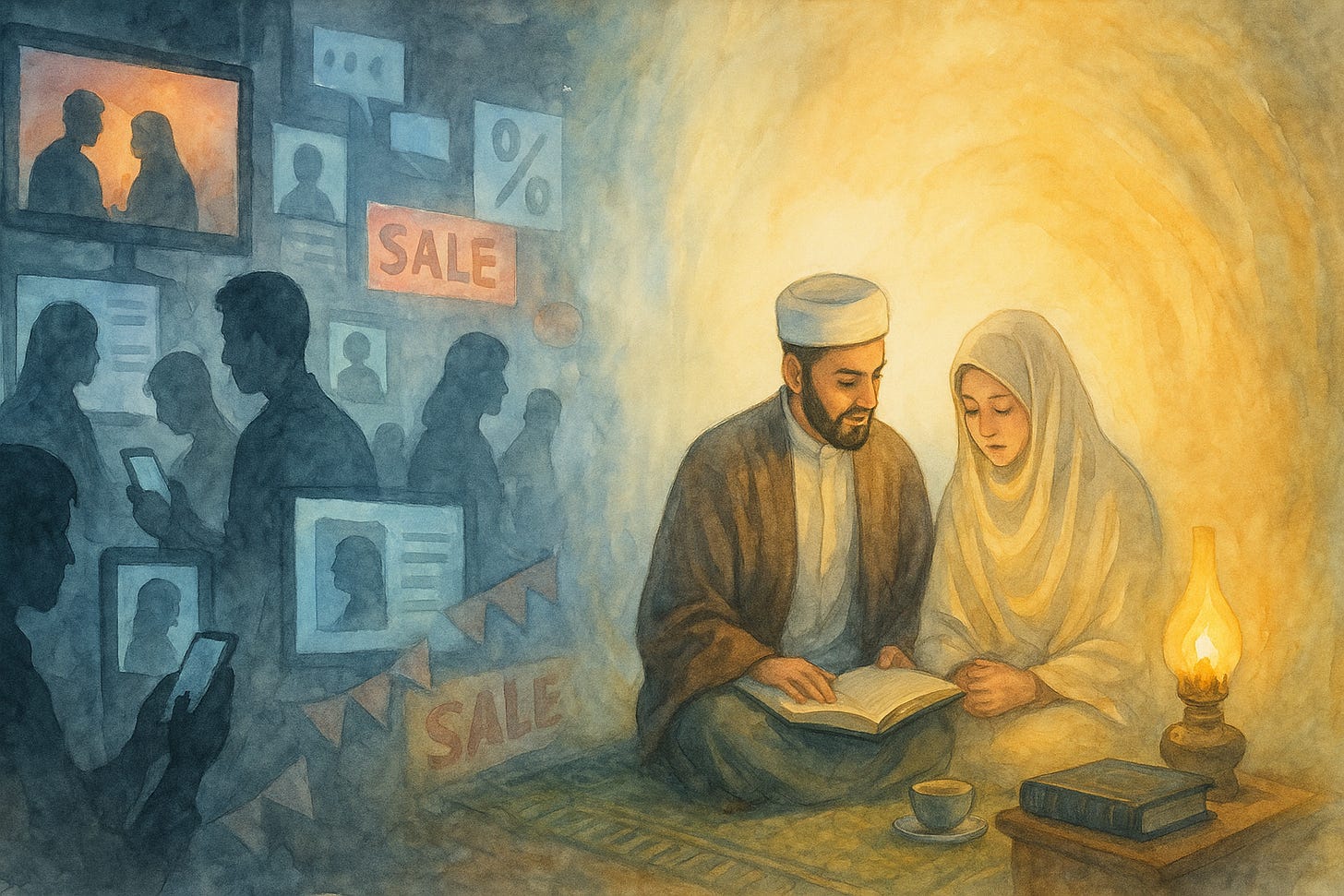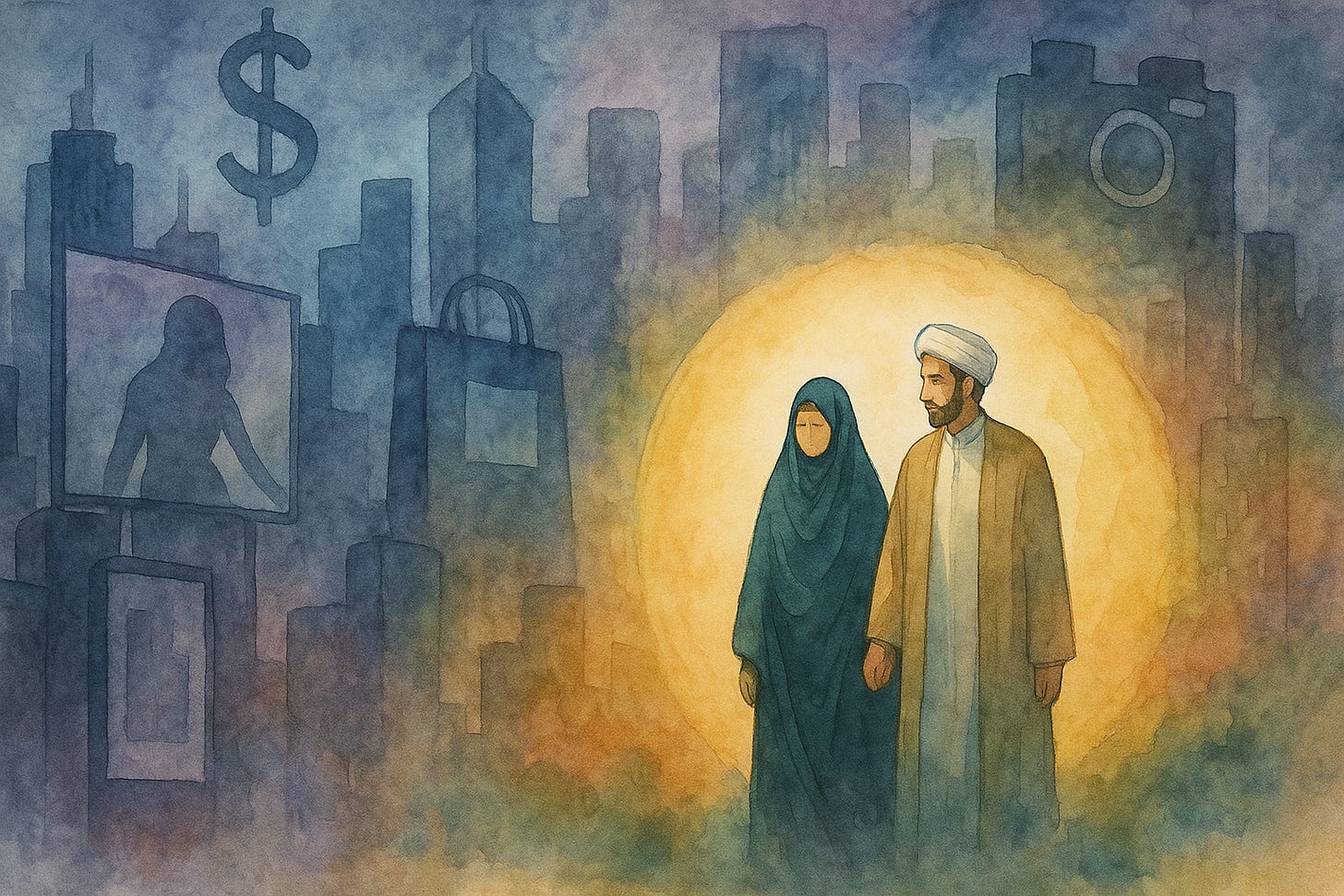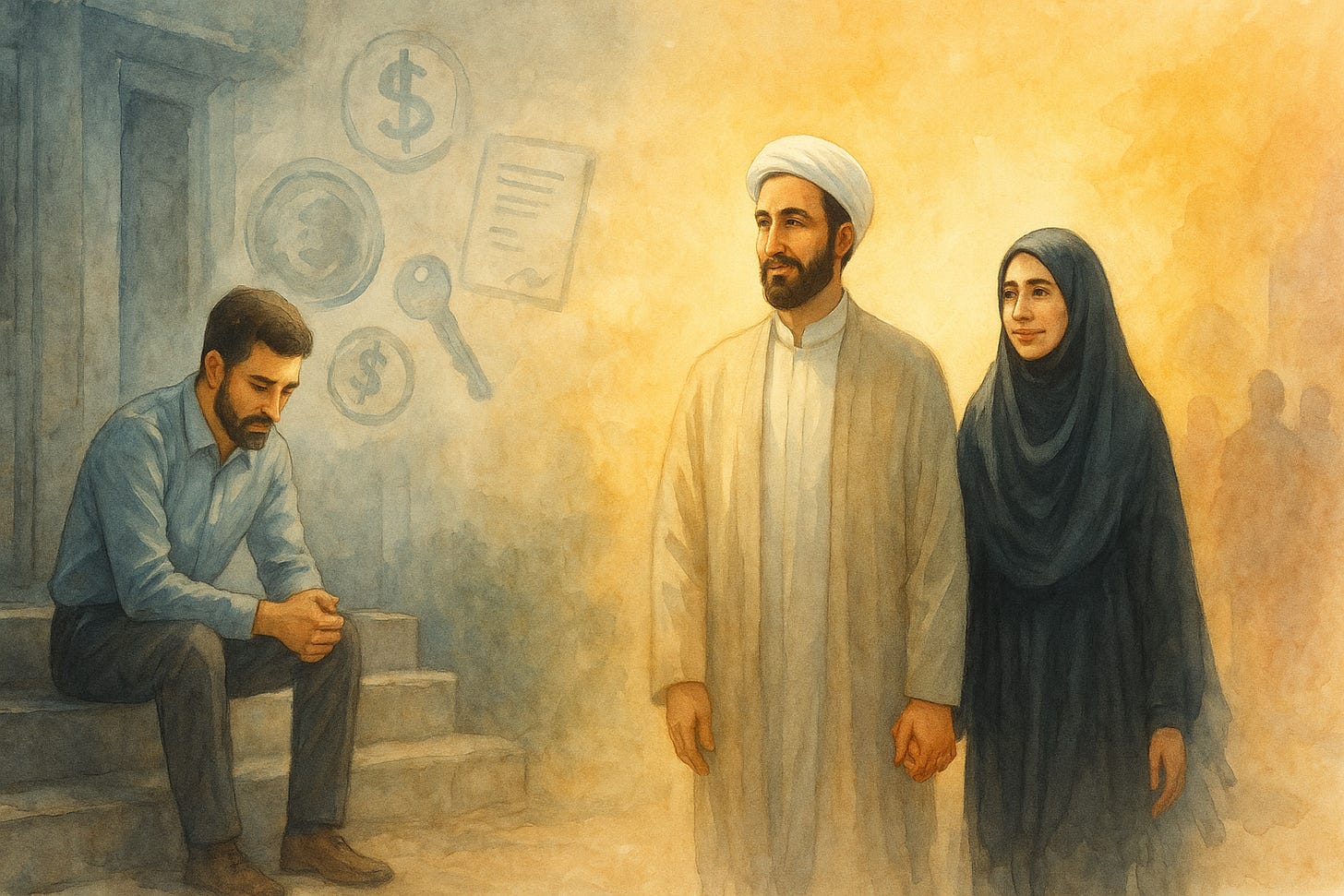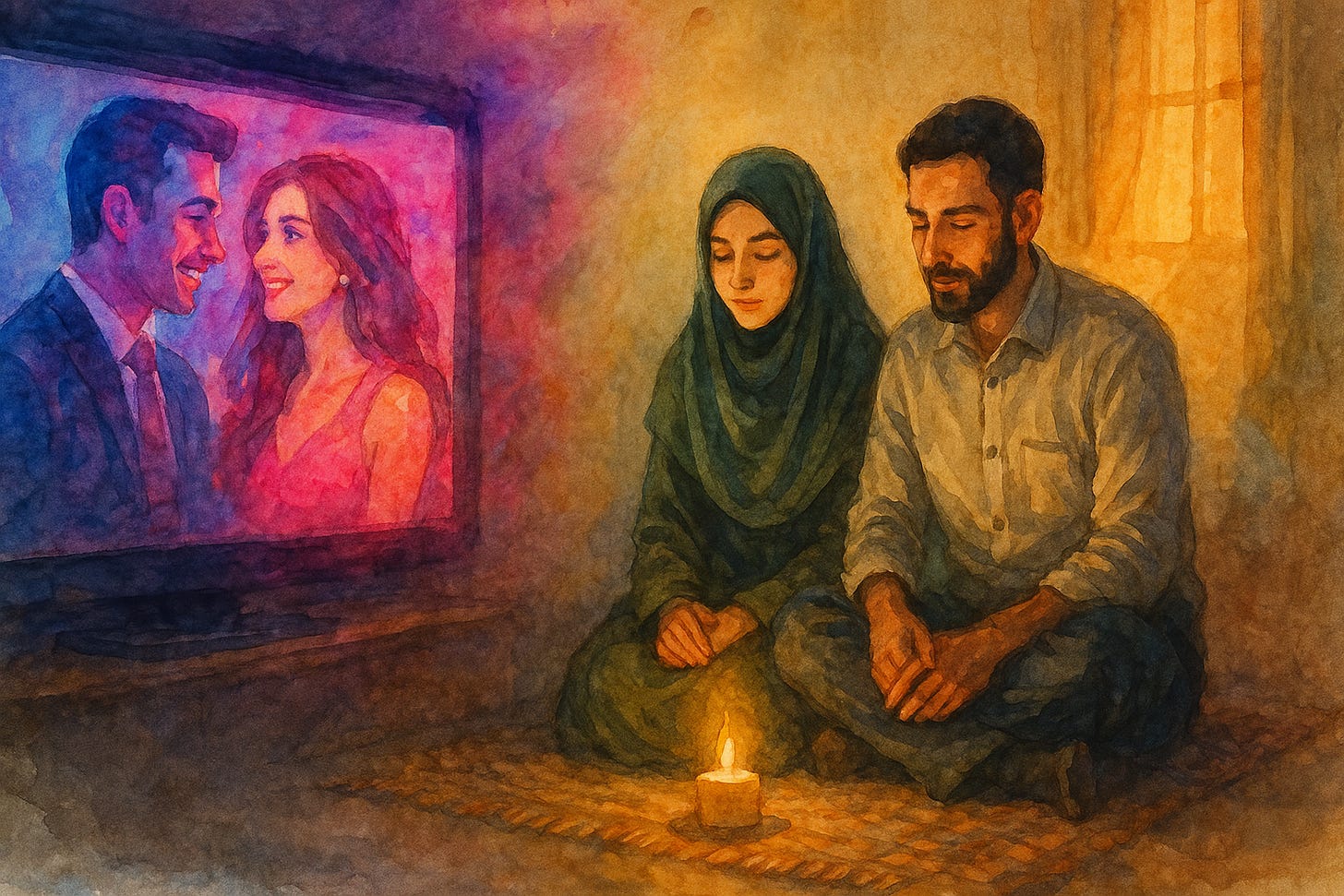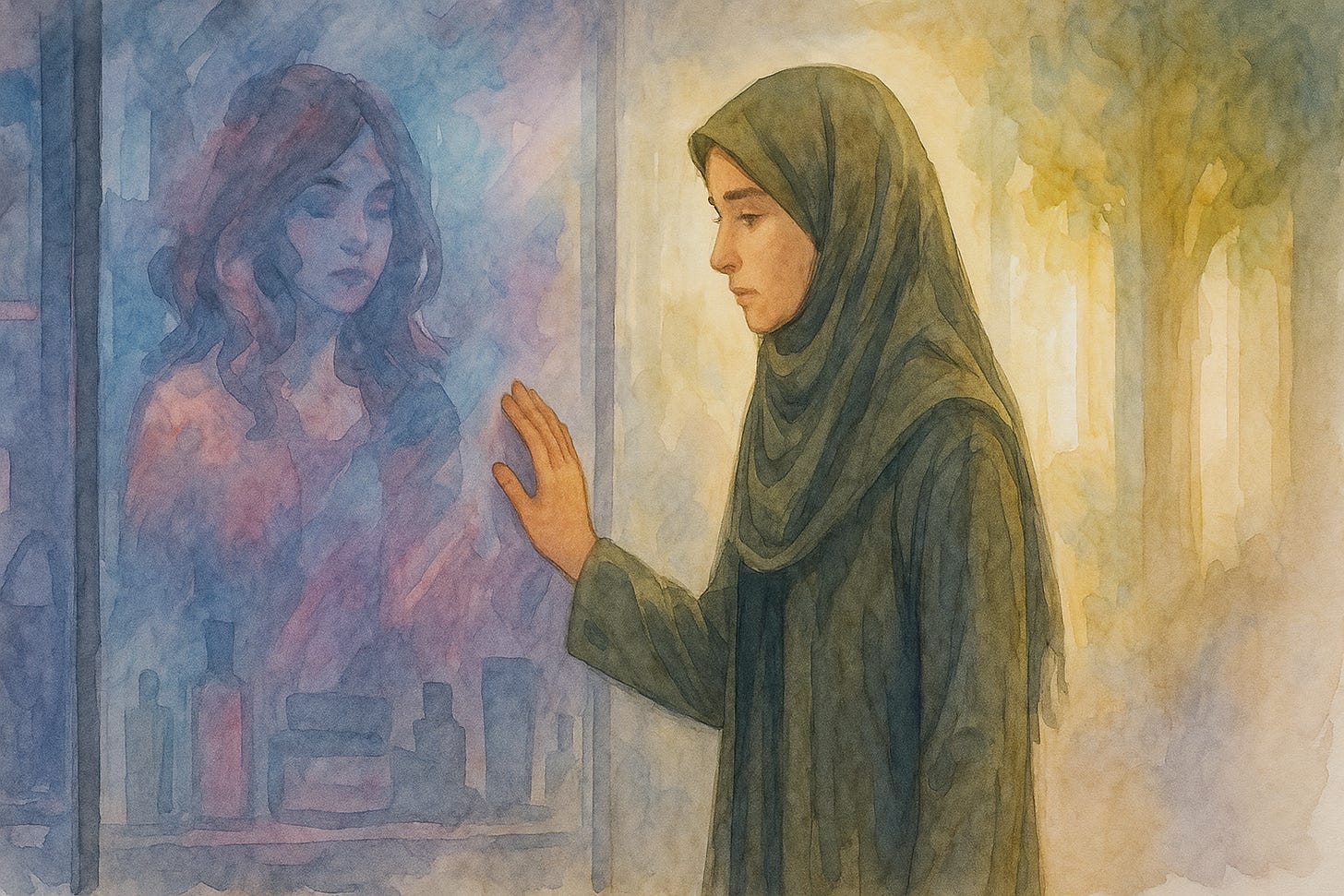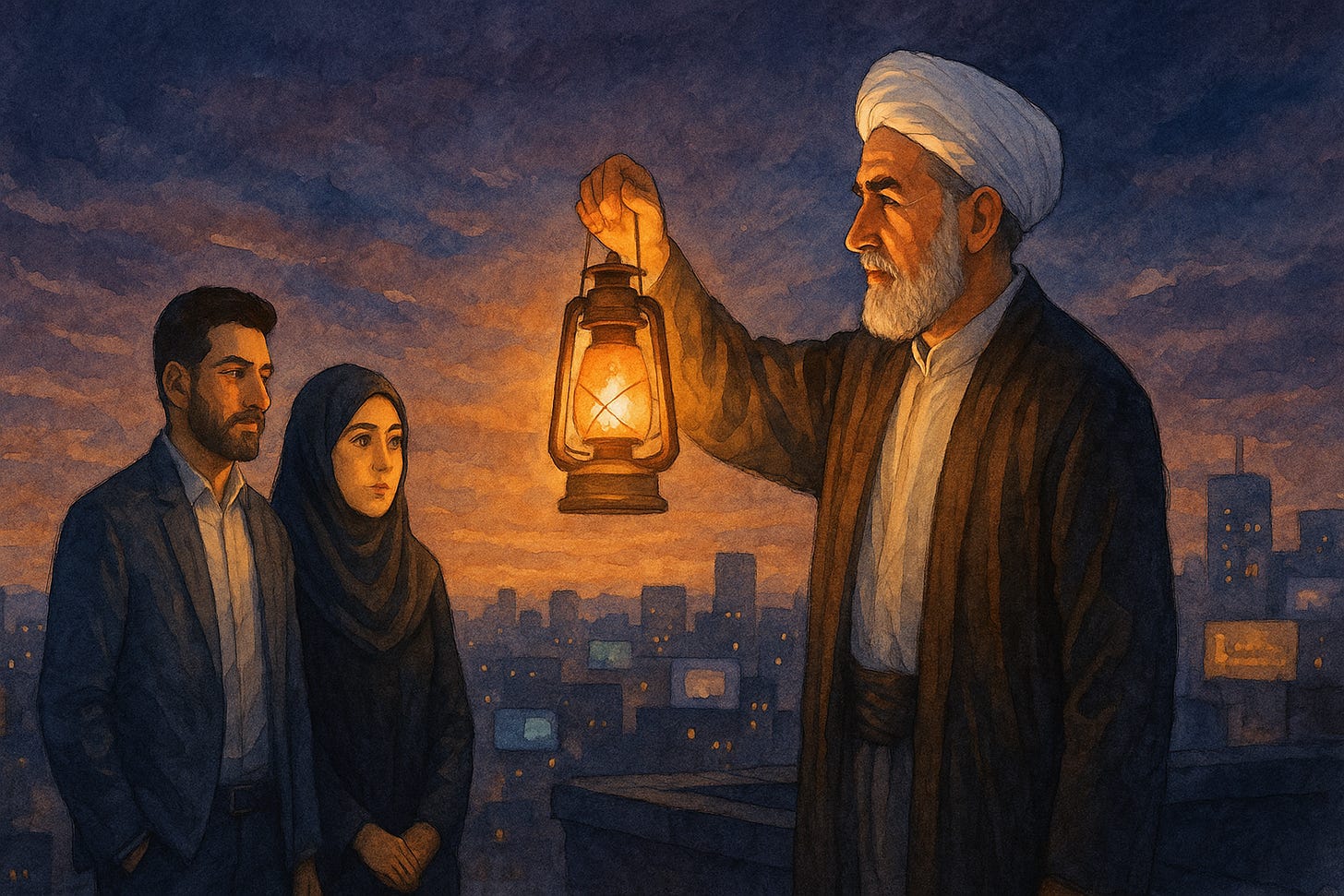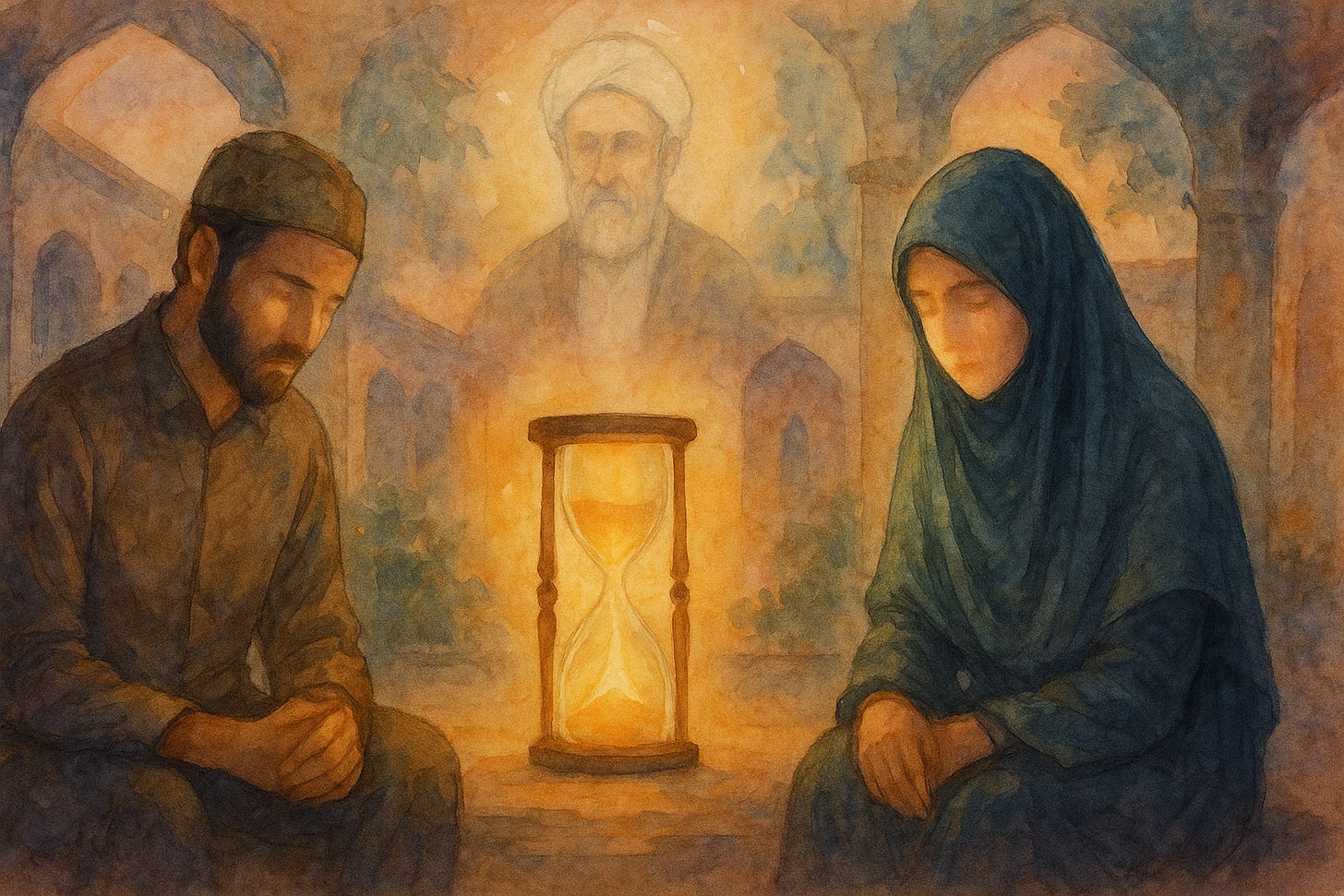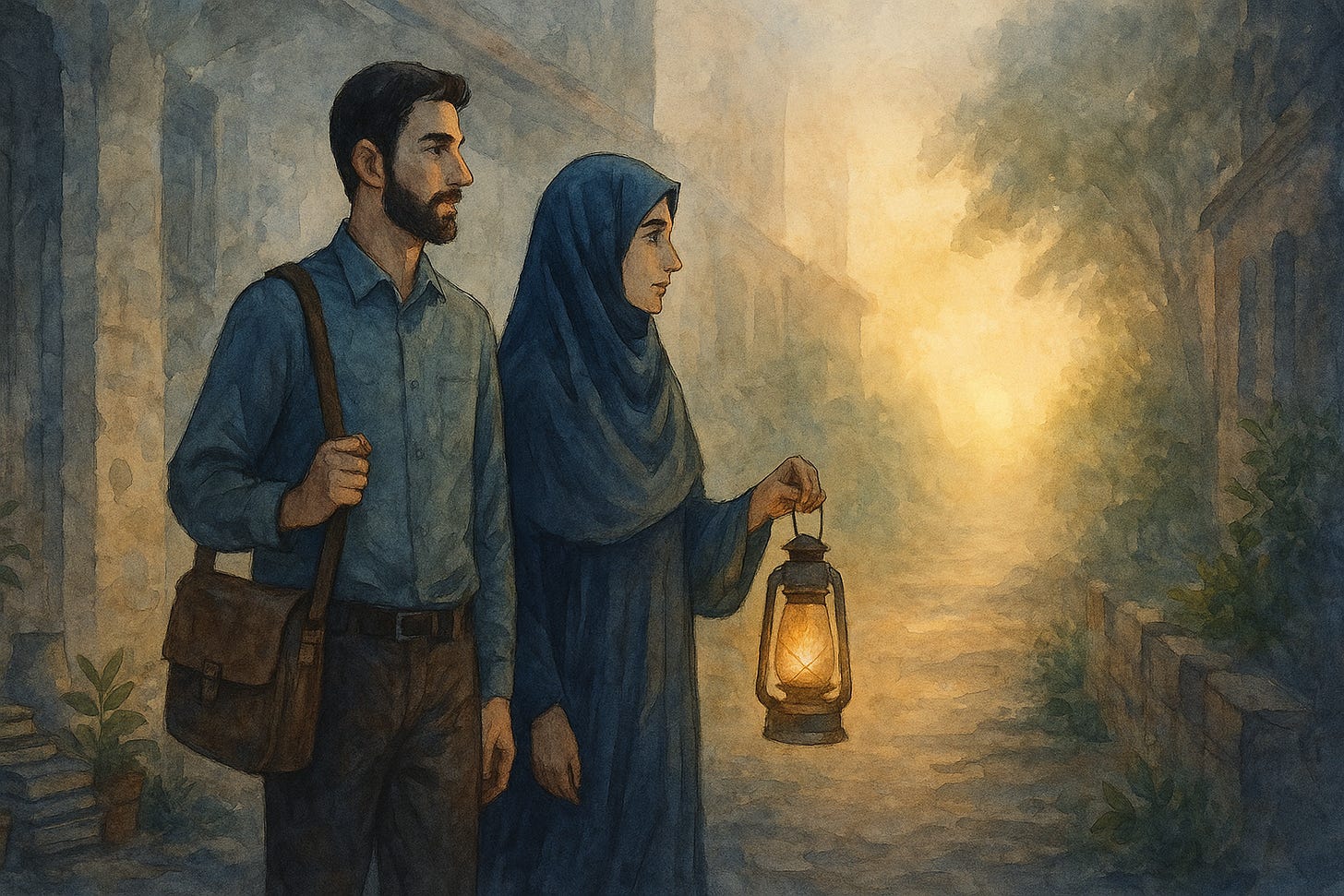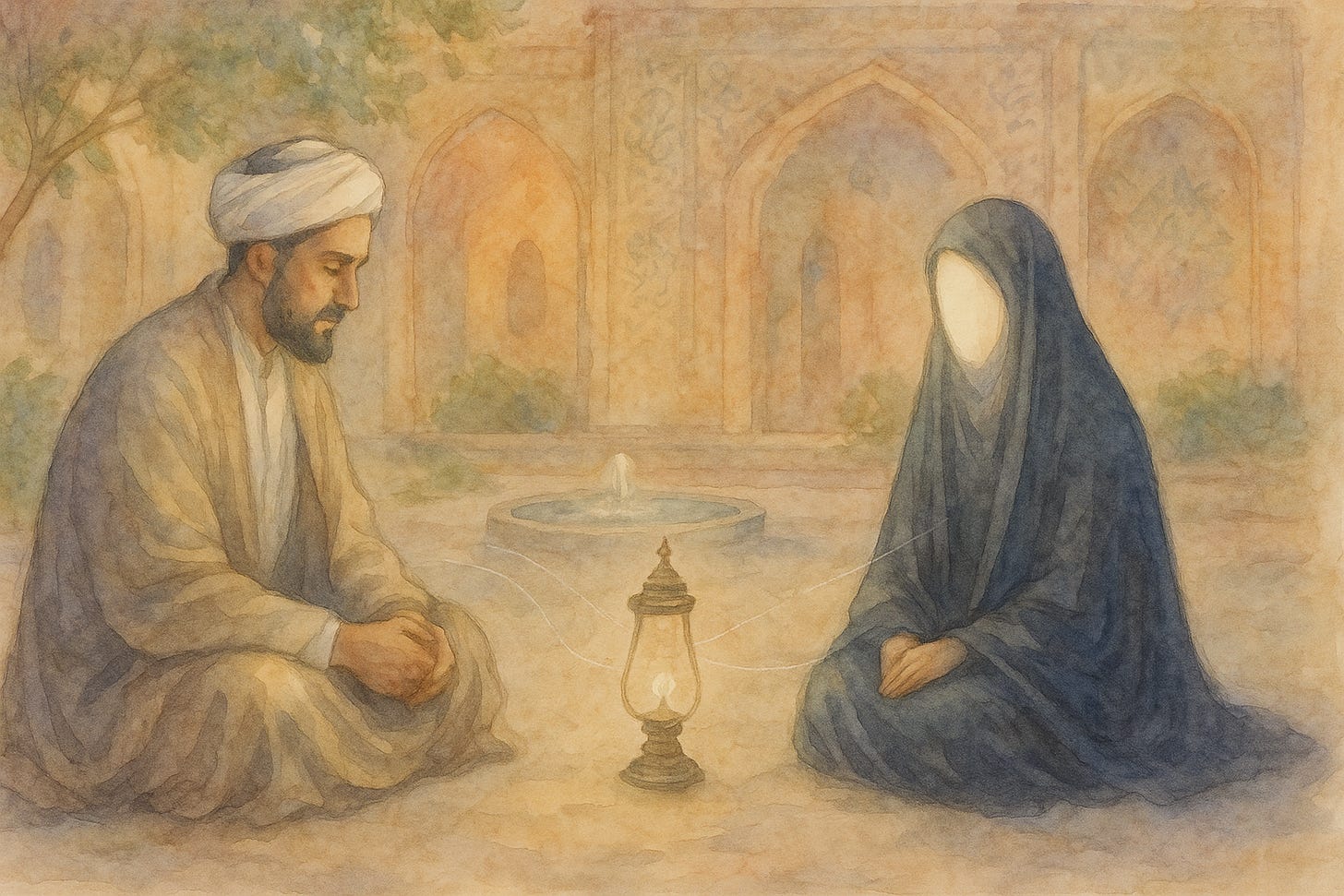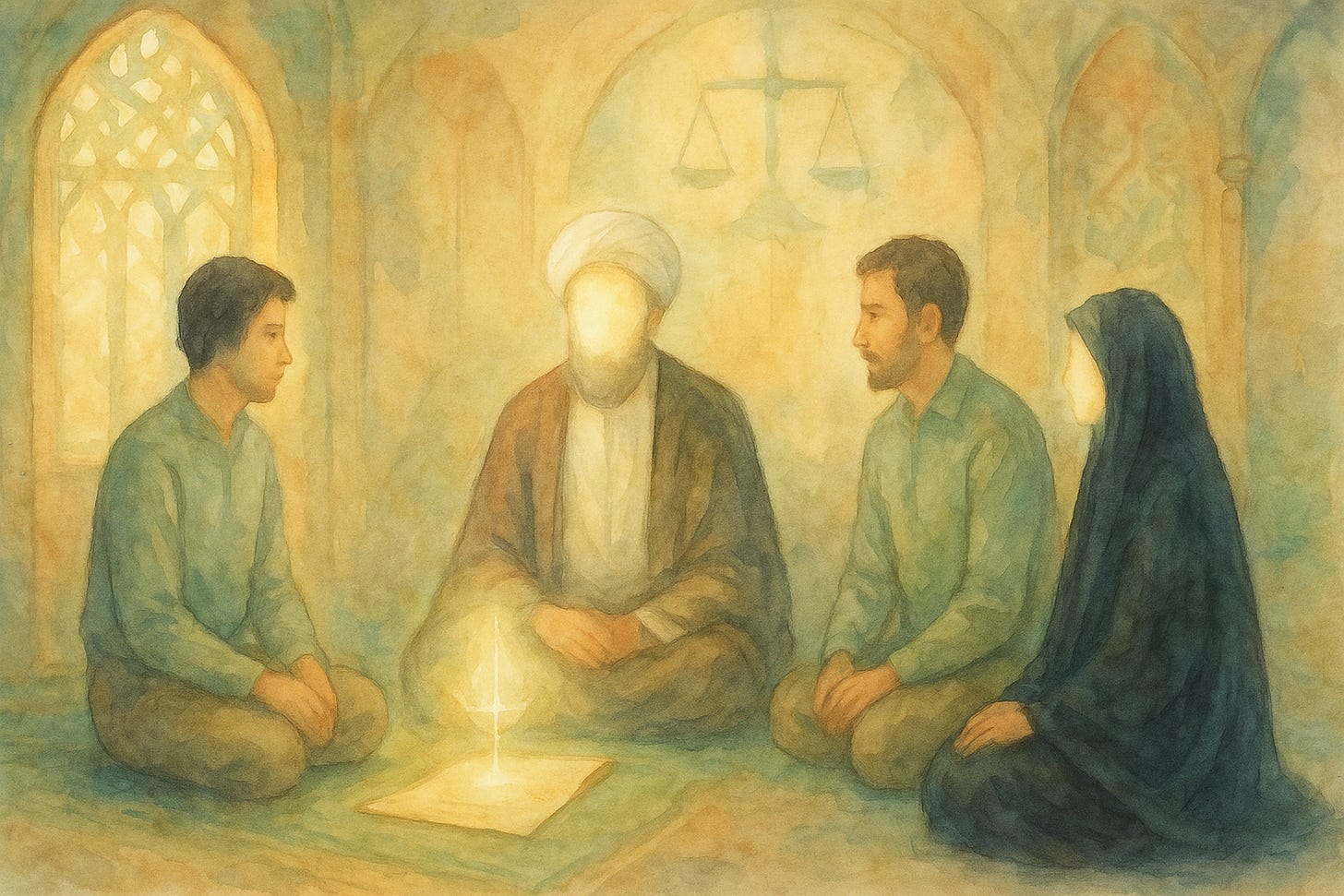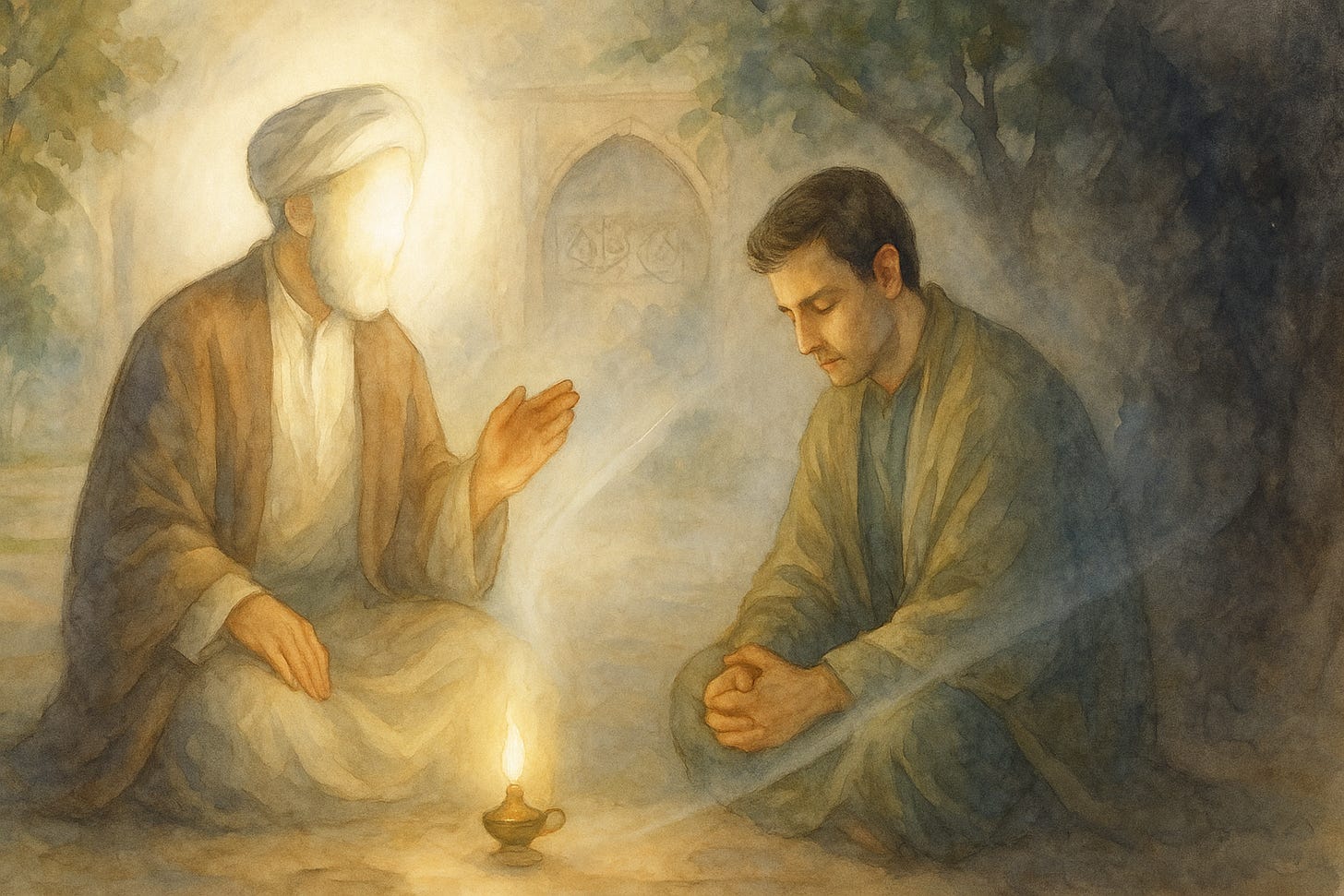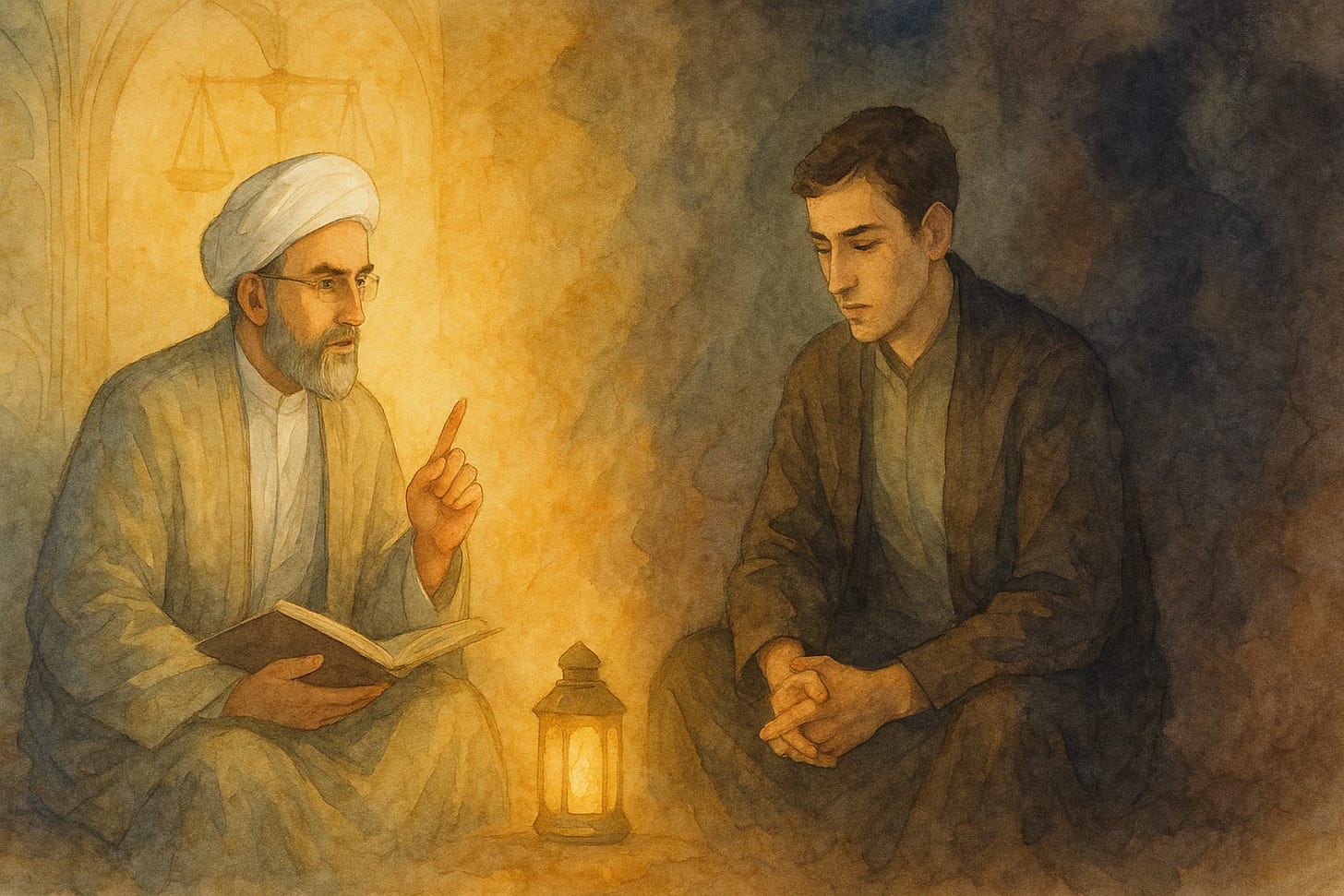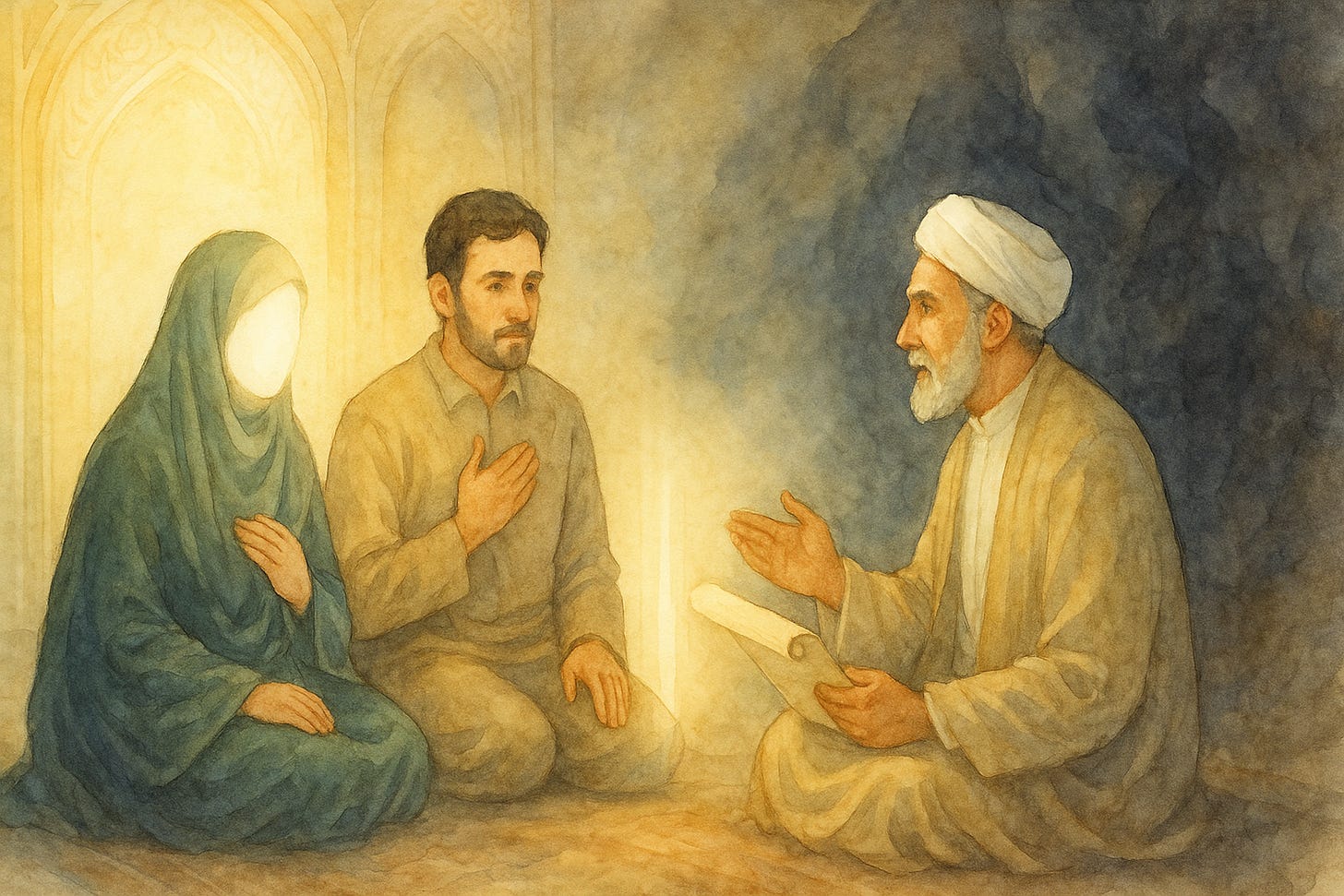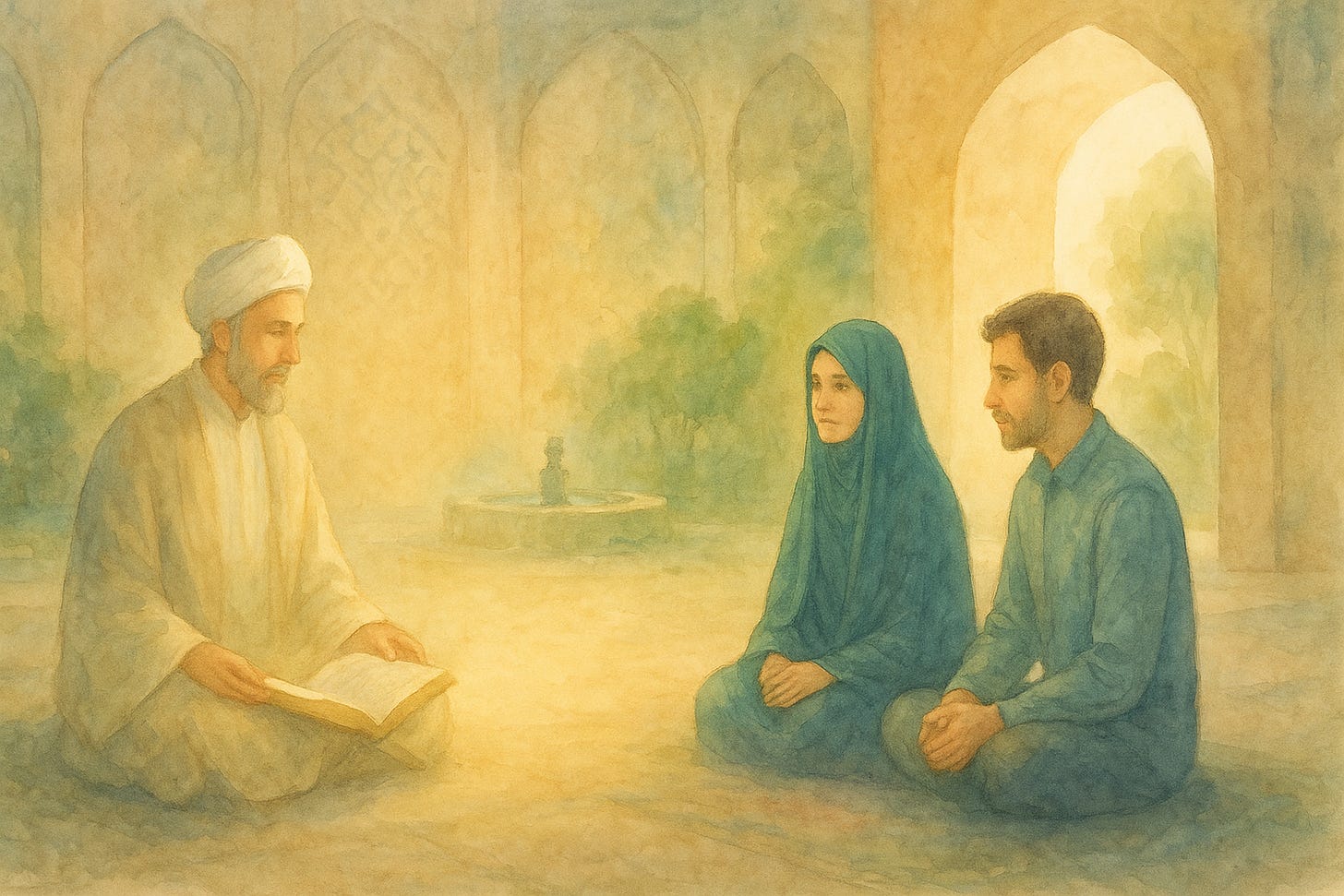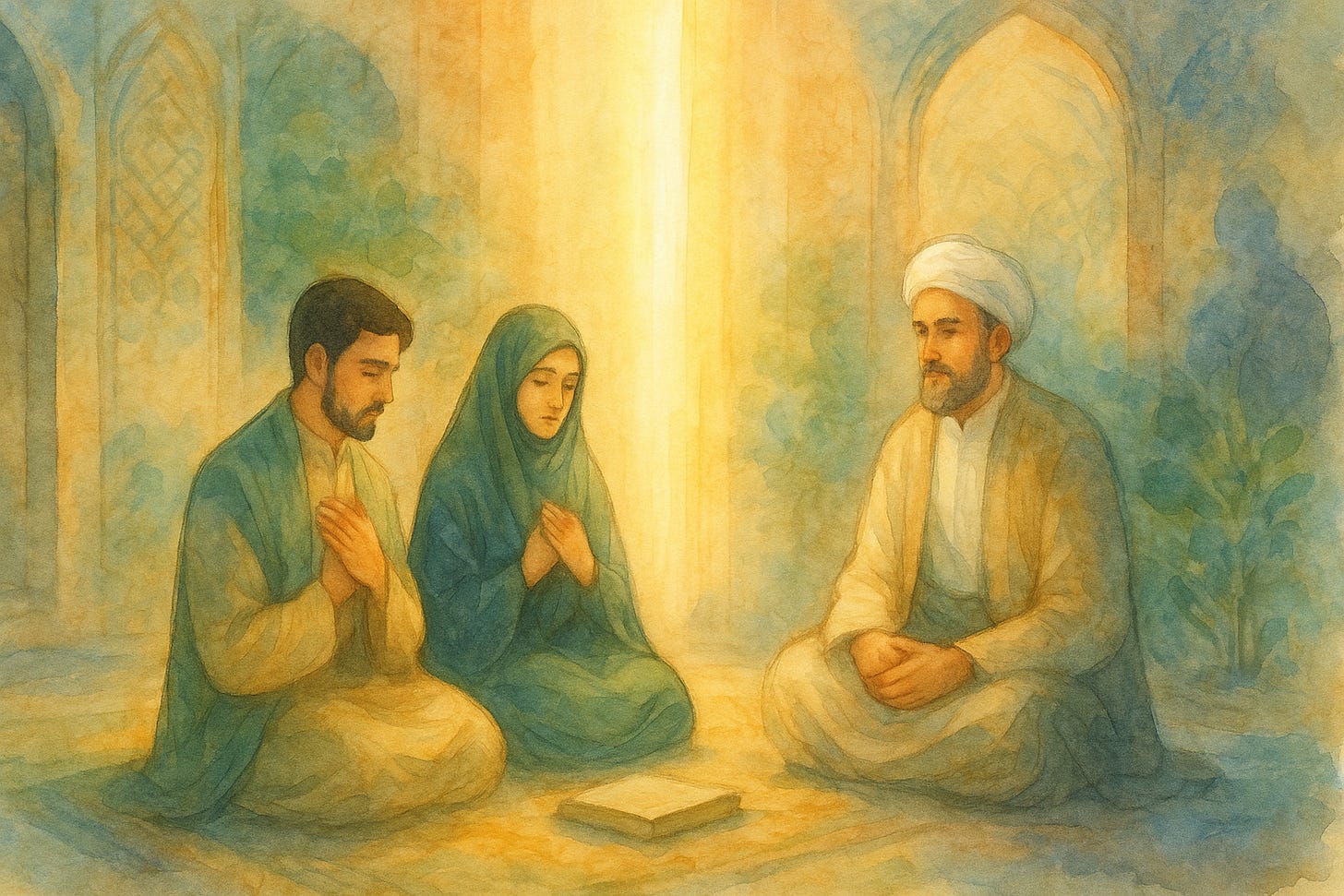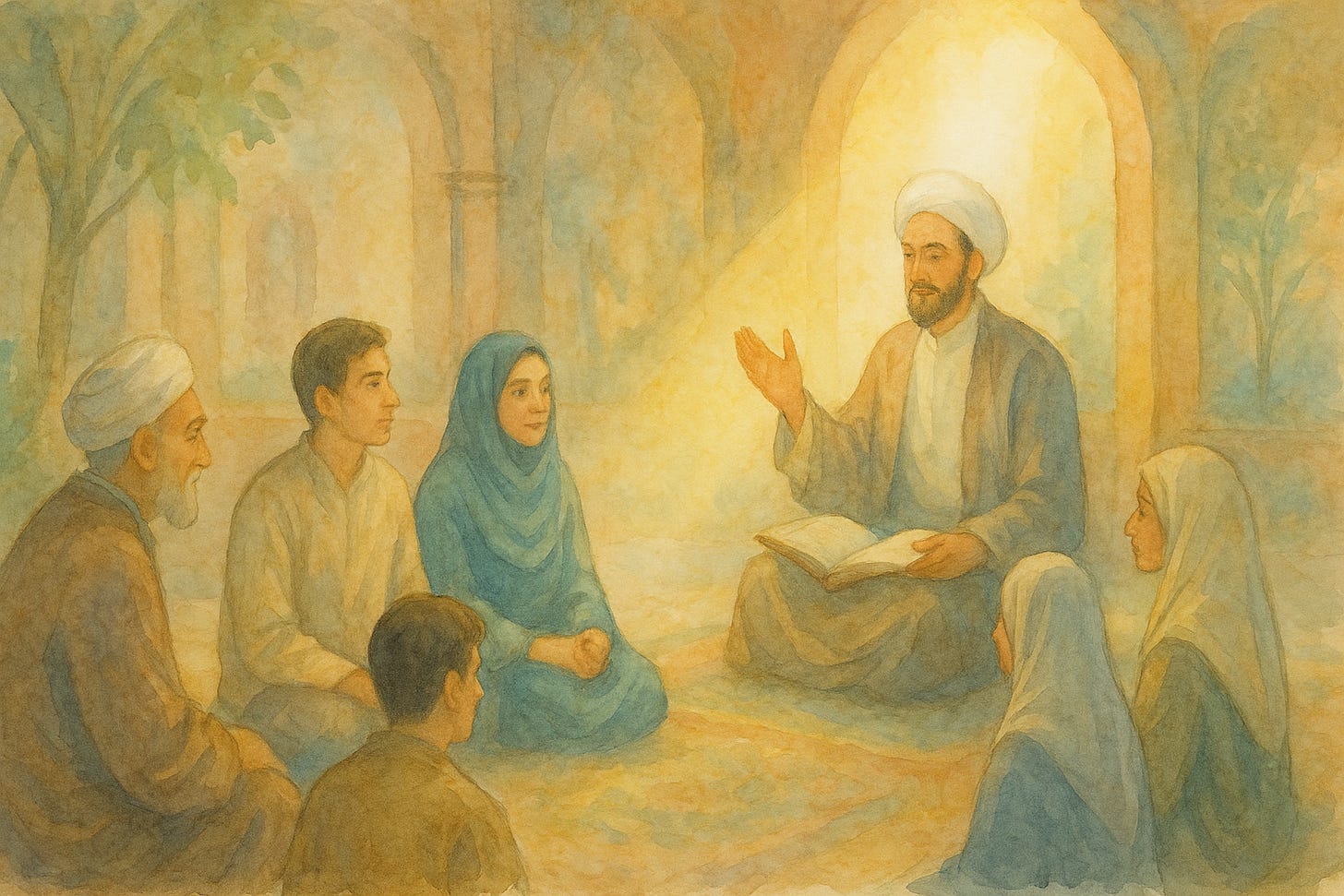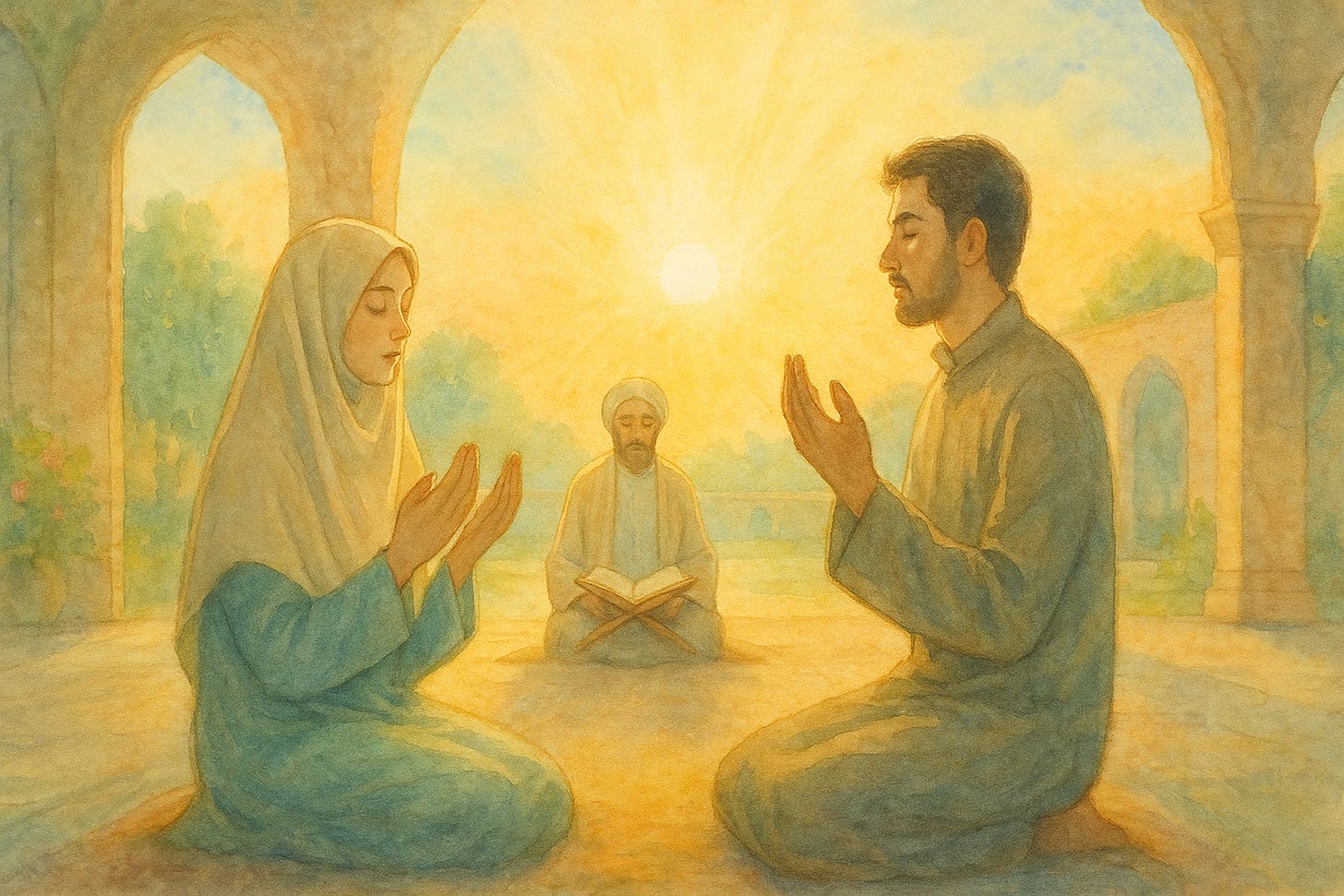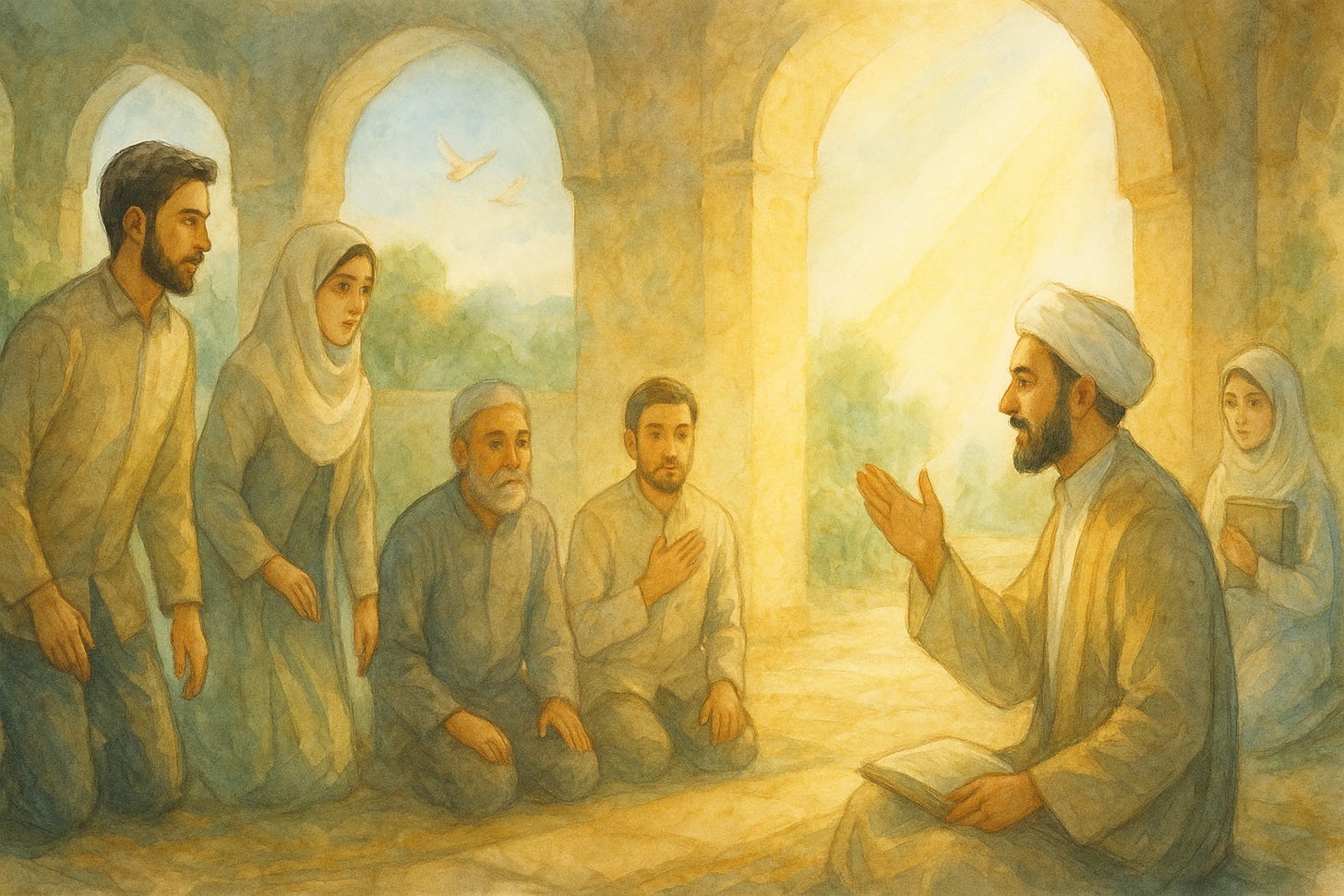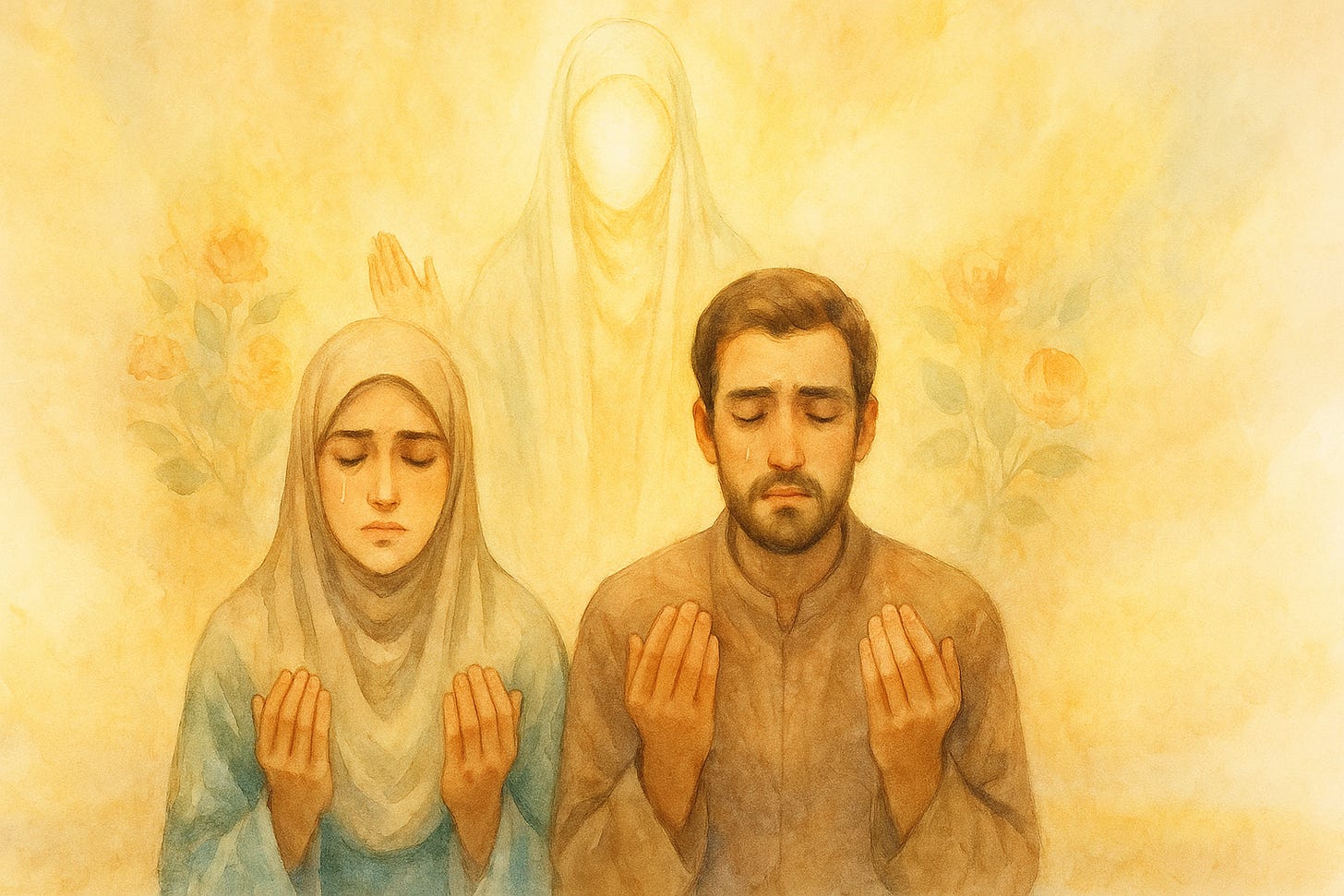[1] Wilayah in the Home - The First Stitch: Weaving Faith into Marriage
Wilayah in the Home: A Fatimiyyah Series on Marriage and Family, based on the Quran, the Tradition of the Ahlulbayt, and guidance drawn from the teachings of Imam Khamenei. Fatimiyyah 2025/1447
In His Name, the Most High
This is session one in our three-part Fatimiyyah series, “Wilayah in the Home,” focusing on Marriage and Family, based on the Quran, the Tradition of the Ahlulbayt, and guidance drawn from the teachings of Imam Khamenei.
As with our explorations into subjects like Patience, The Art of Supplication, The Lantern of the Path or Tabyeen, it is strongly recommended that readers engage with the previous session(s) prior to consuming the current one. This is due to the cumulative nature of our discussion; the manner of discourse requires that each part build upon foundations laid in the ones that came before. Proceeding sequentially helps avoid confusion, misunderstanding, or invalid assumptions, ensuring we move towards clarity on these vital matters.
While subsequent sessions will include brief recaps, these are highly summarised. To grasp the full context and nuance, engaging with, studying, and reflecting upon the preceding sessions is essential.
Therefore, while these discussions might sometimes feel detailed or lengthy, the subject matter is profoundly important. We request patience and encourage everyone to read through to the end, following the progression of the series for maximum benefit.
God willing, this journey will illuminate the path towards building stronger, God-centric families.
Video of the Majlis (Sermon)
This is the video of the majlis (sermon)
Audio of the Majlis (Sermon)
This is the audio of the majlis (sermon)
Prologue: Honouring the Legacy, Establishing the Foundation
وَمِنْ آيَاتِهِ أَنْ خَلَقَ لَكُم مِّنْ أَنفُسِكُمْ أَزْوَاجًا لِّتَسْكُنُوا إِلَيْهَا وَجَعَلَ بَيْنَكُم مَّوَدَّةً وَرَحْمَةً إِنَّ فِي ذَٰلِكَ لَآيَاتٍ لِّقَوْمٍ يَتَفَكَّرُونَ
And of His signs is that He created for you spouses from among yourselves so that you may find rest in them, and He put between you affection and compassion; most surely there are signs in this for a people who reflect.
— Qur’an, Surah al-Rum (the Chapter of the Romans) #30, Verse 21
We gather in these days, heavy with remembrance, commemorating the martyrdom of the Mistress of the Women of the Universes, Sayyedah Fatimah al-Zahra (peace and blessings be upon her and her noble family).
It is a time for reflection not merely on loss, but on the enduring legacy she represents – a legacy intrinsically tied to the very foundation of human society: the family, built upon the divine principles of tranquility (sakinah), affection (mawaddah), and mercy (rahmah) mentioned in the verse above.
It might seem conventional to speak of women and family during the commemoration of a revered lady. Yet, our focus transcends mere convention. We turn to the example of Sayyedah Fatimah not simply because she was a woman, but because she, alongside the Commander of the Faithful, Imam Ali (peace be upon him), established the quintessential model of an Islamic household – a home built upon Wilayah, permeated by divine love, and dedicated entirely to the path of God. Her life exemplifies the profound truth that the strength and spiritual well-being of any society are woven within the fabric of its families.
Islam designates the family as the fundamental unit, the “cell” of the societal body. It is the crucible where individuals are formed, values are transmitted, and the future is shaped.
Within this crucial unit, the role of the woman is pivotal. As Imam Khamenei emphasizes, she is the primary guardian and manager of this sacred space:
خانواده را هم زن به وجود می آورد و اداره میکند؛ این را بدانید عنصر اصلی تشکیل خانواده زن است نه مرد. بدون مرد ممکن است خانواده ای باشد زن خانواده اگر عاقل و با تدبیر و خانه دار باشد خانواده را حفظ میکند اما اگر زن از خانواده ای گرفته شد مرد نمیتواند خانواده را حفظ کند. بنابراین خانواده را زن حفظ میکند.
“The family... is brought into existence and managed by the woman; know this. The essential building block of a family is a woman, not a man. A family can still function without a man... If the wife is wise and possesses good management skills, she can still maintain her family. However, if the woman is taken away from the family, the man cannot preserve it. Therefore, it is the lady of the house who keeps the family together.”
— Imam Khamenei, Zan va Khanevadeh (Woman and Family), Page 48
This central role, especially as a mother, involves the profound responsibility of tarbiyyah – nurturing generations with love, patience, and wisdom. When this foundational role is honoured, society flourishes; when it is undermined or neglected, the repercussions are deep and lasting.
Yet, we live in times where this sacred institution faces unprecedented crises.
Across cultures and communities, families grapple with distortions born of materialism, pervasive and often harmful media influences, conflicting cultural pressures, and a departure from the divine principles that ensure stability and tranquility. The path to marriage itself is often fraught with anxieties and un-Islamic expectations, delaying or damaging the formation of blessed unions.
Therefore, in turning our hearts towards Sayyedah Fatimah, we seek not just solace but guidance. We seek to understand the divine blueprint for family life as revealed in the Quran and embodied by the Ahlulbayt.
This series, “Wilayah in the Home,” aims to offer the timeless wisdom of Islam as a source of healing, clarity, and strength for all who are navigating the journey of marriage and family life – whether preparing for it, striving within it, or seeking to mend it.
Our goal in this first session is to lay the correct spiritual and practical foundations, to understand how to weave faith into the very first stitch of the marital bond, ensuring it is strong, purposeful, and oriented towards God from the outset.
Wilayah in the Home - The First Stitch: Weaving Faith into Marriage
The Divine Blueprint: Marriage as a Sacred Covenant
The journey of marriage in Islam commences not merely as a social arrangement or a means to fulfil personal desires, but as a profoundly spiritual undertaking, a sacred and solemn covenant (mithaq ghalidh) ordained and blessed by God Himself. This reality is presented as one of His clear signs (ayat) for those capable of reflection.
وَمِنْ آيَاتِهِ أَنْ خَلَقَ لَكُم مِّنْ أَنفُسِكُمْ أَزْوَاجًا لِّتَسْكُنُوا إِلَيْهَا وَجَعَلَ بَيْنَكُم مَّوَدَّةً وَرَحْمَةً إِنَّ فِي ذَٰلِكَ لَآيَاتٍ لِّقَوْمٍ يَتَفَكَّرُونَ
And of His signs is that He created for you spouses from among yourselves so that you may find rest in them, and He put between you affection and compassion; most surely there are signs in this for a people who reflect.
— Qur’an, Surah al-Rum (the Chapter of the Romans) #30, Verse 21
The Quranic Foundation: Spouses from Among Ourselves
This verse lays the cornerstone of the Islamic understanding of marriage. God creates spouses from among ourselves (min anfusikum), highlighting a shared human essence, equal standing, and an intrinsic compatibility designed by the Creator.
The explicit purpose given is li-taskunu ilayha – that we may find tranquility, repose, and a dwelling place for the heart in one another.
Finding Tranquility: The Purpose of Sacred Union
Imam Khamenei explains this sakinah (tranquility) as the foundational state, a haven from life’s inevitable struggles and agitations, making the home a unique sanctuary of peace.
لتسکنوا الیها یعنی زوجیت و دو جنسی در طبیعت بشر برای هدف بزرگی است. آن هدف عبارت است از سکون و آرامش تا شما در کنار جنس مخالف خودتان - در درون خانواده - مرد در کنار زن زن در کنار مرد - آرامش پیدا کنید.
“That you may find rest in them.” The fact that the human species is composed of these two genders is not without reason: it is to provide peace and tranquillity... This means, for example, when you are by the side of your other half in your home—a man beside his wife and a woman beside her husband—you should feel at peace.
— Imam Khamenei, Zan va Khanevadeh (Woman and Family), Page 24
Allamah Tabatabai further elaborates that this tranquility arises because each gender finds completion and a natural inclination towards the other, fulfilling an inherent need within the human design.
وقوله : “ لتسكنوا إليها “ بيان الغاية التي لأجلها خلق الأزواج ، والسكون إليها الاستقرار والائتلاف بها وهو من فروع المحبة والمودة . والمراد به سكون كل من الزوجين إلى الآخر.
And His saying: “that you may find rest in them (li-taskunu ilayha)” explains the purpose for which spouses were created. And ‘sukun’ (finding rest) in them means settling down and finding harmony with them, which is one of the branches of love and affection. And what is meant is the tranquility of each of the spouses towards the other.
— Allamah Tabatabai, Tafsir al-Mizan, Volume 16, Commentary on Surah al-Rum, Verse 21
Divine Gifts: The Placement of Love and Mercy
Furthermore, God actively places (ja’ala) two crucial elements between the spouses: mawaddah and rahmah.
Mawaddah is often understood as a manifested, active love and deep affection specific to the spousal relationship.
Ayatollah Jawadi Amoli distinguishes it from general compassion, explaining their difference.
فرق مودت و رحمت آن است که مودت، غالباً طرفینی و همراه با اظهار علاقه قلبی است؛ ولی رحمت، یکجانبه و وصف ایثار و از خودگذشتگی است؛ یعنی حتی اگر از طرف مقابل، جفا برسد، باز جانب دیگر، مهر میورزد.
“The difference between mawaddah and rahmah is that mawaddah is often reciprocal and accompanied by the expression of heartfelt affection; but rahmah is unilateral and a quality of sacrifice and selflessness; meaning, even if harshness comes from the other side, the [merciful] side still shows kindness.”
— Ayatullah Jawadi-Amoli, Tafsir Tasnim, commentary on Surah al-Rum (the Chapter of the Romans) #30, Verse 21
Imam Khamenei refers to this love as the essential ‘cement’ binding the couple.
محبت اساس خوشبختی است... محبت آن ملاطی است که اینها را برای هم حفظ میکند.
Love is the cement of any relationship. The fundamental mortar that holds the family together and keeps its foundation strong is love, love, love.
— Imam Khamenei, Zan va Khanevadeh (Woman and Family), Page 134
Rahmah, on the other hand, signifies compassion, kindness, and tender mercy.
It is the empathetic care that sustains the bond, enabling spouses to overlook faults and support each other through difficulties, particularly when the initial intensity of mawaddah might naturally fluctuate or face challenges.
This mercy often arises from seeing the inherent need or weakness in the other, prompting care and kindness. Allamah Tabatabai suggests rahmah is akin to pity or compassion that arises from witnessing a need in another, which then motivates kindness and beneficence towards them.
والرحمة هي الرأفة وهي الانعطاف عن شفقة ، فالمحبة والمودة الجاذبة المجتمعة من الطرفين كالميل الخاص بين الزوجين تتعقبه الرحمة والانعطاف وهي كالأمر الواحد المتعقب بالمحبة يتفرع عليه فروع مختلفة باختلاف الموارد .
And rahmah is compassion (ra’fah), which is turning towards [someone] out of sympathy. Thus, love (mahabbah) and affection (mawaddah) which attract and unite the two parties, like the special inclination between spouses, are followed by rahmah and turning [with compassion]. It is like a single reality followed by love, from which different branches emerge according to different situations.
— Allamah Tabatabai, Tafsir al-Mizan, Volume 16, Commentary on Surah al-Rum, Verse 21
Theocentric Union: God as the Unseen Third
Crucially, the Quran states God placed both Mawaddah and Rahmah between spouses, indicating they are divine gifts actively bestowed to establish and sustain the marital bond, not merely fleeting human emotions.
This divine involvement renders marriage inherently theocentric. God is not an external observer but the central reality and the unseen third in this sacred union. The Holy Prophet (peace and blessings be upon him and his family) underscored this vital connection between marriage and faith itself.
مَنْ تَزَوَّجَ فَقَدْ أَحْرَزَ نِصْفَ دِينِهِ فَلْيَتَّقِ اللهَ فِي النِّصْفِ الْبَاقِي
Whoever marries has protected half of his religion, so let him fear God regarding the remaining half.
— Al-Kulayni, Al-Kafi, Volume 5, Page 329, Hadith 2
Completing Faith: Marriage as Half of Religion
Marriage, therefore, becomes an act of safeguarding and completing one’s religion.
The love between spouses achieves its perfection when it becomes rooted in their shared love for God (hubb fillah).
This means loving the spouse through God, viewing them as a partner in faith and a blessing that facilitates closeness to Him.
As Imam Khomeini (may God have mercy upon him) indicated, the family serves as a nursery for true human beings, implying a profound spiritual purpose.
This transforms the marriage into a shared path of ubudiyyah (servitude to God).
Shared Servitude: The Path of Spiritual Partnership
Imam Khamenei articulates this beautifully.
با وارد شدن در سلک ازدواج انسان تجدید میثاق میکند با پیمانهای الهی و دینی یعنی بنای تشکیل خانواده با فکر خدا، با یاد خدا، با اجرای احکام الهی این است که ازدواج را مبارک میکند.
By entering the state of marriage we renew our own vows towards God and our religious obligations; we start a family with God in mind. That is why Islam has specified certain acts of worship for every Muslim to perform on their marriage night, including supplications and prayers.
— Imam Khamenei, Zan va Khanevadeh (Woman and Family), Page 58
Sacred Trust: Beyond Secular Conceptions
This vision starkly contrasts with secular, transactional, or purely hedonistic views of relationships, which inevitably neglect the spiritual core and societal significance of this divine institution.
Marriage in Islam stands as a divine trust, demanding pure intention, unwavering commitment, and a constant, conscious awareness of God’s presence within the heart of the relationship.
Lessons for the Present: Reorienting Our Intentions
Understanding marriage as a sacred covenant requires a fundamental shift in our internal perspective. We must approach it not primarily as a quest for personal happiness or worldly comfort, but as an ordained path towards spiritual completion and the fulfilment of a divine command.
The intention (niyyah) behind seeking marriage needs purification.
Is the aim to build a God-centric home?
To find a partner who aids in matters of faith?
To raise righteous children who will serve God?
To strengthen the fabric of the Muslim community?
This involves looking beyond the fleeting notions of romance often presented by popular culture and instead embracing the profound, divinely-rooted concepts of mawaddah (committed affection) and rahmah (active compassion) as the pillars of the relationship.
Recognising these as gifts from God necessitates continuous effort in nurturing them through gratitude, patience, and righteous conduct.
Call to Clarify: From Contract to Covenant
We must ask ourselves and clarify for those around us:
What truly elevates a marriage from a mere social or legal contract to a sacred covenant blessed by God?
It is the conscious and continuous centring of God within the relationship.
It is recognising His signs (ayat) in the tranquility, affection, and mercy we experience with our spouse.
How do mawaddah and rahmah manifest practically in our daily lives, distinguishing this divine model from lesser forms of partnership?
They appear through consistent mutual respect, especially during disagreement; through the practice of forgiveness, even when difficult; through unwavering patience during hardship; through expressing sincere gratitude for the spouse’s presence and efforts; through prioritising their spiritual well-being alongside their worldly comfort; and through making significant life decisions together, always keeping God’s pleasure as the ultimate compass.
Let us clarify within our families and communities that the success of a marriage, in the truest sense, is measured not by its accumulated wealth or social recognition, but by the depth of sakinah (tranquility) it fosters and the degree to which it brings both partners closer to God, enabling them to better fulfil their sacred purpose as His devoted servants.
Spousal Selection: Choosing Faith & Character Over Culture
Once we understand marriage as a sacred covenant centred on God, the next critical step is selecting the partner with whom we will undertake this journey. Islam provides clear guidance, elevating spiritual and ethical qualities far above the superficial or tribalistic criteria that often dominate cultural practices.
Essential Criteria: Faith and Character Above All
The primary considerations must be deen (religion/faith/way of life) and akhlaq (character/morality).
Imam Khamenei emphasizes that while worldly attributes like education, wealth, and appearance are naturally attractive, they are not the necessary ingredients for a happy or lasting marriage.
True marital happiness stems from partnership with someone possessing goodness, purity, honour, and, crucially, religiosity and sound character.
آن چیزهائی که موجب میشود که انسان در این ازدواج سعادتمند بشود، عبارت است از تقوا و پاکدامنی و نجابت و حسن خلق و امانت و درستکاری... اینهاست آن معیارهائی که در انتخاب همسر در اسلام معین شده.
“What makes someone happy in their marriage is being with a partner who has aptitude, goodness, religion, purity, and honour... These are the ingredients for a lasting and happy marriage.”
— Imam Khamenei, Zan va Khanevadeh (Woman and Family), Page 32
Deen in this context is not merely nominal affiliation but a conscious commitment to God, adherence to His commands, and a continuous effort towards spiritual growth and taqwa (God-consciousness).
Akhlaq refers to ingrained moral character – qualities like patience (sabr), kindness (lutf), trustworthiness (amanah), truthfulness (sidq), responsibility, and good conduct (husn al-khulq).
We seek a partner who not only possesses these qualities but actively aids us in our own spiritual journey, helping us fulfil the purpose of protecting our faith through marriage.
Challenging Culture: The Danger of Worldly Filters
This Islamic framework directly challenges many prevalent cultural filters that prioritise worldly considerations.
Imam Khamenei strongly critiques choosing a spouse based primarily on wealth or beauty, noting these are fleeting qualities susceptible to change and loss.
Relying on them can lead to disappointment, whereas prioritising faith often brings worldly blessings as well.
پیغمبر فرمود: اگر کسی ازدواج کند با زنی بخاطر مالش یا بخاطر زیبائیش ممکن است خدا او را به همین چیزها وا بگذارد... اما اگر بخاطر دین و تقوایش ازدواج کند، خدای متعال زیبایی و مال را هم به او خواهد داد.
There is a narration that says that if someone marries a spouse because of their beauty or wealth, it is possible for God to take these away... But the tradition also says that if you choose your spouse based on his or her religious devotion, you will be given wealth and beauty.
— Imam Khamenei, Zan va Khanevadeh (Woman and Family), Page 32
Divine Beauty: Love Through God’s Eyes
He explains that the beauty which God grants is not a physical transformation but rather stems from the love placed within the heart, making the spouse appear beautiful in the eyes of the one who loves them for His sake.
یکمرتبه دیدم زیبایی ایجاد میشود؛ چطور زیبایی ایجاد میشود؟ محبت ایجاد میشود. وقتی خدای متعال محبت کسی را در دل کسی انداخت، به نظر او زیبا می آید ولو در چشم دیگران زیبا نباشد... زیبایی که در چشم است؛ زیبایی که در دل است.
Then all of a sudden I realised what it is that creates beauty—it is love. When God puts love in someone’s heart, even the ugliest face is made beautiful to his eyes... The point is that when God plants the seed of love in a person, beauty accompanies it. This is because beauty is in the eyes and heart of the beholder.
— Imam Khamenei, Zan va Khanevadeh (Woman and Family), Page 33
Jahili Remnants: Status and Lineage Obsessions
Similarly, prioritising status, family name, specific ethnicities, or adhering to rigid caste-like systems represents a departure from Islamic principles.
Imam Khamenei notes these echo the misguided criteria prevalent before Islam.
اسلام در انتخاب همسر معیارهایی را معین کرده این معیارها با معیارهای جاهلی متفاوت است معیارهای جاهلی عبارت است از نام و نشان، عنوان، پول، شغل.
Islam has envisioned a particular set of criteria for choosing a spouse which can be contrasted to a set of ‘mindless’ (jahili) criteria, which emphasizes reputation, title, wealth, profession, etc.
— Imam Khamenei, Zan va Khanevadeh (Woman and Family), Page 32
The Sayyed Question: Dismantling Lineage Exclusivity
Among these misguided, Jahili-rooted notions is the insistence found in some communities on marrying only within a specific lineage, such as the practice of restricting marriage exclusively between Sayyeds (descendants of the Prophet, peace and blessings be upon him and his family).
This practice has no basis in authentic Islamic teachings.
The Quran establishes the sole criterion for nobility in the sight of God as Taqwa (God-consciousness):
...إِنَّ أَكْرَمَكُمْ عِندَ اللَّهِ أَتْقَاكُمْ...
...Indeed, the most noble of you in the sight of God is the most righteous of you...
— Qur’an, Surah al-Hujurat (the Chapter of the Chambers) #49, Verse 13
This verse dismantles any claim to inherent superiority based on lineage, tribe, or race.
The measure of true worth is piety and character.
Historical Proof: The Imams’ Own Marriages
Furthermore, the Sunnah of the Prophet (peace and blessings be upon him and his family) and the practice of the Imams of the Ahlulbayt (peace be upon them) themselves refute such exclusivity.
The Imams frequently married noble women who were not Sayyeds or even from the Banu Hashim clan.
For instance, the revered mother of Imam Sajjad (peace be upon him), Sayyedah Shahrbanu, was a princess from Persia, and the esteemed mother of Imam Ridha (peace be upon him), Sayyedah Najmah Khatun, was from North Africa.
Their choice underscored that piety, virtue, and character transcend lineage.
Scholarly Consensus: Faith as True Compatibility
Contemporary scholars strongly affirm this principle, emphasising faith as the essential element of compatibility (kufw).
Ayatullah Sistani clarifies the Islamic position on compatibility:
المسألة 2430 ـ الكفاءة شرط في صحة النكاح بمعنى عدم جواز تزويج المؤمنة من غير المؤمن، وليست شرطاً في ما وراء ذلك...
Issue 2430: Compatibility (Kafa’ah) is a condition for the validity of marriage in the sense that it is not permissible to marry a believing woman (mu’minah) to a non-believer (ghayr mu’min), but it is not a condition beyond that...
— Ayatullah Sistani, Minhaj al-Salihin, Volume 3, Marriage Section, Issue 2430
The clear implication is that once faith (iman) is established, preventing a marriage solely based on lineage (like Sayyed vs. non-Sayyed) is impermissible.
While social and cultural compatibility can aid marital harmony, it cannot become a rigid barrier overriding the fundamental compatibility of faith.
Ayatullah Sistani explicitly addresses the scenario where a guardian objects solely based on lineage:
السؤال: هل يجوز للأب ـ مع وجود الكفؤ الشرعي وهو الشاب المؤمن المتدين الملتزم الذي ترغب به البنت ـ أن يرفضه لأنه ليس بسيد أو ليس بعربي أو لغيرها من الأسباب غير الشرعية؟
الجواب: لا يجوز له ذلك، فإن وافق الشاب دين البنت وخلقها فهو كفؤ لها شرعاً، ولا تعتبر المماثلة في النسب والحسب وغيرها من الأمور التي لا تعتبر في الدين والخلق.
Question: Is it permissible for the father – despite the presence of a suitable match according to Shari’ah, who is a committed, religious, believing young man whom the daughter desires – to reject him because he is not a Sayyed, or not an Arab, or for other non-Shar’i reasons?
Answer: It is not permissible for him to do that. If the young man’s faith (deen) and character (khulq) are agreeable to the daughter, then he is her match (kufw) according to Shari’ah. Similarity in lineage (nasab), social standing (hasab), and other matters that are not considered in faith and character are not taken into account.
— Ayatullah Sistani, sistani.org, Q&A Section, Marriage Questions, Question #1)
This ruling explicitly forbids a guardian from rejecting a suitable match based on non-Shar’i reasons like lineage, confirming that faith and character are the determining factors for compatibility, and preventing a marriage solely based on lineage is impermissible (la yajuz).
Modern Guidance: Our Maraji on Islamic Standards
Imam Khomeini (may God rest his pure soul) similarly stressed the primacy of Islamic criteria over cultural norms, reminding people that nobility comes from piety.
ازدواج، امر خیرى است كه در اسلام بر آن تأكید فراوان شده است، لیكن انتخاب همسر، پایهاى اساسى براى این امر خیر است كه باید در آن، معیارهاى اسلامى رعایت شود. معیار در اسلام، تقوا و عفاف و صلاح است، نه جمال و ثروت و مَنسَب...
“Marriage is a good matter that has been greatly emphasised in Islam, but the selection of a spouse is a fundamental basis for this good matter, in which Islamic criteria must be observed. The criterion in Islam is piety (taqwa), chastity (‘iffah), and righteousness (salah), not beauty (jamal), wealth (tharwat), or lineage/status (mansab)...”
— Imam Khomeini, Sahifeh-ye Imam, Volume 1, Page 1 - Note: This specific phrasing is a well-known summary reflecting his consistent stance, often found in compilations or interpretations of his views on marriage
Imam Khamenei echoes this sentiment, condemning inherited cultural habits that contradict Islamic teachings.
اینها [عادات غلط قبیله ای] عادات جاهلی است. مسلمانان جاهل با تکیه ی بر آداب و عادات جاهلیت کارهایی را انجام میدهند که ربطی به اسلام و احکام نورانی آن ندارد... اینها خلاف شرع بین است.
These [incorrect tribal customs] are jahili (ignorant) customs. Ignorant Muslims, relying on jahili (ignorant) traditions and customs, perform actions that have no connection to Islam and its luminous rulings... These are contrary to the clear shari’ah.
— Imam Khamenei, Zan va Khanevadeh (Woman and Family), Page 30
Insisting on Sayyed-only marriages often stems from cultural habits rooted in pre-Islamic tribal pride (‘asabiyyah) or a misunderstanding of the respect due to the Prophet’s (peace and blessings be upon him and his family) lineage.
This respect translates to ethical treatment and love, not marital exclusivity or social stratification.
Psychologically, such rigid rules can foster arrogance in one group and feelings of inferiority in another, create unnecessary barriers to lawful marriage leading to delays or unsuitable matches, and tragically divide the Muslim community based on criteria God Himself has abolished.
It reflects a clinging to worldly notions of status rather than embracing the universal brotherhood and sisterhood of faith that Islam champions.
The Story of Juwaybir
The beautiful example of Juwaybir, a companion less endowed with worldly means, whom the Prophet (peace and blessings be upon him and his family) encouraged to seek marriage with the daughter of a noble and wealthy family based solely on his faith, illustrates this principle powerfully.
پیغمبر به همین «جویبر» فرمود برو به خانه ی فلان کس – که یکی از اشراف مدینه بود – دخترش را خواستگاری کن... این دختر مثل زنان مؤمن زمان انقلاب ما به پدرش پرخاش کرد که چرا رد کردی؟ چرا جواب منفی دادی؟... آن دختر این جور فکر کرد که او مرد مسلمان، من هم زن مسلمان؛ کفویّت حاصل است.
The Prophet told him [Juwaybir] to ask for the hand of the beautiful daughter of one of the richest and noblest families... What was this girl thinking? In her mind, he was a Muslim man and she was a Muslim woman, and that was sufficient for them to be a match. A Muslim is a Muslim’s compeer and a believer is a believer’s compeer. This is the Islamic criteria for marriage.
— Imam Khamenei, Zan va Khanevadeh (Woman and Family), Page 34
The true measure of compatibility (kufw) in Islam is faith:
اَلمؤمِنُ کُفؤُ المُؤمِنَةِ وَ المُسلِمُ کُفؤُ المُسلِمَةِ
The believer is the equal (kufw) of the believer woman, and the Muslim is the equal (kufw) of the Muslim woman.
— Al-Kulayni, Al-Kafi, Volume 5, Page 341
Free Will: Consent as Sacred Prerequisite
Crucially, the individual’s consent is an absolute prerequisite for a valid Islamic marriage.
Any form of coercion, whether overt or subtle, renders the marriage void (batil).
Parental guidance and blessing are highly encouraged, but they do not possess the right to compel or forbid a marriage against the individual’s free will, provided the choice aligns with Islamic principles.
Imam Khamenei states clearly:
خداوند به اراده ی زن و مرد در همه ی امور از جمله ازدواج احترام گذاشته است و بر همین اساس واداشتن دختران به ازدواج با مردان از نظر اسلام حرام است و بدون رضایت دختر جایز نیست.
God has respected the will of men and women in all matters, including marriage. Based on this, forcing girls to marry men is forbidden according to Islam, and it is not permissible without the girl’s consent.
— Imam Khamenei, Zan va Khanevadeh (Woman and Family), Page 29
He further condemns specific un-Islamic cultural practices that interfere with free choice, such as when a cousin might claim undue rights over a girl’s marriage decision, deeming such interference contrary to clear religious law.
فرض بفرمایید – آنطوری که اطلاع دارم - در بعضی از عشایر پسر عموی هر دختری حق دارد که در مورد ازدواج آن دختر اظهار نظر بکند این غلط است. اسلام چنین اجازه ای را به هیچکس نمیدهد... اگر کسی بعنوان اینکه پسر عموی دختری است به خودش حق بدهد که او را از ازدواج کردن نهی کند و بگوید با من ازدواج نکردی پس من اجازه ی ازدواج به تو نمیدهم این پسر عمو و هر کس که به او كمك كند، فعل حرام خلاف شرع کرده است. اینها خلاف شرع بین است.
For example - from what I know - among some tribes, the paternal cousin of any girl has the right to express an opinion regarding that girl’s marriage; this is wrong. Islam does not give such permission to anyone... If someone, by virtue of being a girl’s paternal cousin, gives himself the right to forbid her from marrying [someone else] and says, ‘Since you did not marry me, I will not permit you to marry,’ this cousin, and anyone who helps him, has committed a forbidden act contrary to the shari’ah. These are contrary to the clear shari’ah.
— Imam Khamenei, Zan va Khanevadeh (Woman and Family), Page 30
Cousin Marriage: Between Permissibility and Pressure
Regarding cousin marriage, while permissible (halal) according to Islamic jurisprudence (fiqh), we must differentiate permissibility from obligation or even preference.
Cultural pressures often create an expectation, particularly for first/second cousins, which can overshadow genuine compatibility or personal choice.
Furthermore, contemporary awareness regarding potential genetic health risks associated with close-relative marriages should be considered responsibly alongside the fiqh ruling, without making the permissible forbidden, but ensuring choices are informed and free from undue pressure.
Lessons for the Present: Evaluating Beyond the Surface
Practically evaluating deen and akhlaq requires looking beyond superficial appearances or claims.
It involves observing consistency in religious practice (prayer, modesty, honesty), interactions with family (especially parents), behaviour under pressure, trustworthiness in dealings, and the nature of their friendships.
Seeking counsel from truly wise and pious individuals who know the person, and performing diligent investigation (tahqiq) without resorting to spying or gossip, are essential steps.
We must cultivate the courage, grounded in faith, to uphold Islamic criteria even when faced with conflicting family or cultural expectations, communicating respectfully but firmly why deen and akhlaq are non-negotiable priorities.
Trust in God’s plan is paramount when facing pressure to compromise on these core principles.
Call to Clarify: Upholding Islamic Standards
We must ask ourselves and clarify within our communities:
How can we practically assess genuine deen and akhlaq in a potential spouse, moving beyond outward appearances or family reputation?
What are the observable signs of true piety (taqwa), good character (husn al-khulq), and trustworthiness (amanah)?
Let us clarify, unequivocally, the absolute prohibition of forced marriage in Islam and the invalidity of any union lacking free and informed consent.
We must also clarify that while respecting parents is crucial, their preferences cannot override clear Islamic principles regarding spousal selection criteria or the necessity of consent.
Educate families on the difference between cultural traditions and authentic Islamic teachings regarding who constitutes a suitable match, emphasising that faith and character are the true measures of compatibility and the foundation for a blessed union.
Mahr & Jahazieh: Simplicity as Sunnah
Having established faith and character as the primary criteria for selecting a spouse, Islam guides us further by emphasising simplicity and moderation in the material aspects of establishing the marriage, specifically concerning the Mahr (dowry given by the groom to the bride) and the Jahazieh (marriage trousseau/gift, often provided by the bride’s family).
The Perfect Model: Sayyedah Fatimah and Imam Ali’s Union
This emphasis on simplicity is not merely a suggestion but a deeply rooted Sunnah, exemplified by the most blessed union in history – that of Sayyedah Fatimah al-Zahra (peace be upon her) and Imam Ali (peace be upon him).
Their marriage serves as the ultimate paragon.
Despite Sayyedah Fatimah being the cherished daughter of the Prophet (peace and blessings be upon him and his family) and Imam Ali being the foremost companion, their union was marked by profound humility in its material aspects.
Imam Khamenei reminds us of this essential lesson.
مگر نمىگوییم كه جهیزیهى آن بزرگوار، چیزهایى بود كه انسان با شنیدن آنها اشكش جارى مىشود؟ مگر نمىگوییم كه این زن والا مقام، براى دنیا و زیور دنیا هیچ ارزشى قائل نبود؟
Do we not say that her [Sayyedah Fatimah’s] marriage gift included items that bring tears to one’s eyes upon hearing of them? Do we not say that this exalted lady placed no value on this world and its adornments?
— Imam Khamenei, Zan va Khanevadeh (Woman and Family), Page 41
Material Humility: The Contents of a Blessed Beginning
The mahr agreed upon was the Mahr al-Sunnah, a modest amount derived from the sale of Imam Ali’s shield, and the jahazieh consisted of only the most basic necessities for starting a household – items like a reed mat, bedding filled with palm fibre, a water-skin, and grinding stones.
This was not due to poverty, but a conscious choice by the Prophet (peace and blessings be upon him and his family) to establish a blessed precedent (sunnah), demonstrating that the sanctity and success of marriage are independent of material wealth.
Symbolic Purpose: Setting the Standard for All
Imam Khamenei points out that this simplicity had a symbolic purpose:
اینکه در جهیزیهى حضرت زهرا (سلام الله علیها) این قدر سادگى رعایت شد... این، یك جنبهى نمادین داشت، براى اینكه بین مردم مبنا و پایهاى باشد براى عمل به آن، تا دچار این مشكلاتى كه بر اثر زیادهرویها پیش مىآید، نشوند.
The fact that such simplicity was observed in the marriage gift of Sayyedah Fatimah (peace be upon her)... this had a symbolic aspect, so that it might serve as a foundation and basis among the people for acting upon it, preventing them from falling into the problems that arise from excess.
— Imam Khamenei, Zan va Khanevadeh (Woman and Family), Page 37
The Mahr Problem: From Sacred Gift to Business Transaction
Islam thus fundamentally critiques the practice of demanding excessive Mahr.
Imam Khamenei identifies this as a remnant of pre-Islamic ignorance (jahiliyyah), a practice that devalues the human and spiritual essence of marriage, reducing it to a mere business transaction.
Setting an exorbitant mahr, he argues, is a form of disrespect to the woman, treating her like merchandise whose value can be quantified in monetary terms, rather than as a cherished human being entering a sacred partnership.
کسانی که مهریه های دخترشان را برای احترام به دخترشان بالا میبرند، اشتباه میکنند. این احترام نیست؛ این بی احترامی است. برای اینکه با بالا بردن مهریه، شما جنس این معامله ی انسانی را... تنزل میدهید به حد يك کالا و يك متاع.
Those who assume that setting their daughter’s dowry high is a form of respect to her are wrong as well; in fact, this is a form of disrespect because they are reducing the ‘commodity’ in this human transaction... to the level of mere merchandise.
— Imam Khamenei, Zan va Khanevadeh (Woman and Family), Page 38
False Security: Why High Mahr Doesn’t Protect Marriage
Furthermore, the notion that a high mahr secures the marriage or prevents divorce is a fallacy.
Imam Khamenei asserts that stability comes not from financial deterrents but from ethical conduct and adherence to Islamic principles.
هیچ مهریه ی سنگینی مانع طلاق نمیشود و نشده است. آن چیزی که مانع طلاق میشود، اخلاق و رفتار است و رعایت موازین اسلامی.
No dowry, no matter how high, can prevent a divorce. What prevents a divorce are one’s morals and actions, as well as abiding by the teachings of Islam.
— Imam Khamenei, Zan va Khanevadeh (Woman and Family), Page 40
Societal Harm: Barriers to Marriage and Resentment
Excessive mahr creates significant societal problems, making marriage inaccessible for many young people and fostering resentment.
Imam Khamenei’s preference for advising a mahr of around 14 gold coins is explicitly stated as symbolic, aiming to prioritise the spiritual over the material aspect of marriage.
The Jahazieh Trap: Competition and Material Display
Similarly, Islam critiques extravagance (israf) and competition in jahazieh (marriage trousseau/gift). While providing necessities is encouraged, turning it into a display of wealth, burdening the bride’s family beyond their means, and engaging in ostentatious competition (chashm o ham chashmi) are condemned.
Such practices inject materialism, potential debt, and social pressure into what should be a blessed beginning, often causing long-term dissatisfaction and feelings of inadequacy.
Imam Khamenei warns against this contest:
اسیر تجملات و تشریفات و چشم و هم چشمیها نشوید. خودتان را در دام مسابقه ی مادی در امر زندگی نیندازید. هیچکس در این مسابقه خوشبخت و کامیاب نمیشود.
Do not enslave yourselves to formalities... Do not fall into the trap of material competition in life’s affairs. No one becomes happy or successful in this competition.
— Imam Khamenei, Zan va Khanevadeh (Woman and Family), Page 43
True Necessity: Contentment Over Competition
The focus should be on providing what is genuinely needed to start a life together, fostering contentment (qana’ah) rather than endless acquisition.
Lessons for the Present: Embracing Simplicity as Strength
Living the sunnah of simplicity in mahr and jahazieh requires conscious effort against strong cultural tides.
It means prioritising the partner’s faith and character far above the monetary value attached to the marriage contract.
For grooms and their families, it involves offering a mahr that is reasonable, sincere, and within one’s means, understanding it as a symbol of commitment, not a price tag.
For brides and their families, it means valuing the groom’s piety and potential over his immediate financial capacity, and focusing the jahazieh on practical necessities rather than extravagant displays.
Embracing simplicity is not a sign of weakness or lack of worth, but a sign of spiritual strength, trust in God’s provision (barakah), and a commitment to building the marriage on a foundation deeper than material possessions.
It frees the couple and their families from unnecessary debt, stress, and social comparison, allowing them to focus on cultivating love and understanding.
Call to Clarify: Reviving the Prophetic Standard
We must ask ourselves and clarify within our communities:
Why did the Prophet (peace and blessings be upon him and his family) and Sayyedah Fatimah (peace be upon her) establish such a profound example of simplicity in mahr and jahazieh?
It was to teach us that the true value and blessing (barakah) of marriage lie in faith, mutual respect, and reliance on God, not in material wealth or social competition.
How can families today collectively challenge and push back against the deeply ingrained cultural pressures for excessive mahr and extravagant jahazieh?
By educating one another on the Islamic perspective, celebrating simple weddings, refusing to participate in ostentatious displays, and supporting young couples who choose the path of moderation.
Let us clarify that insisting on high mahr disrespects the woman by commodifying her, and demanding lavish jahazieh burdens families unnecessarily.
We must revive the Prophetic standard, clarifying that a marriage’s true honour and potential for success are found in piety (taqwa), love (mawaddah), mercy (rahmah), and contentment (qana’ah), not in gold coins or overflowing trousseaus.
Societal Pressures & Media: Resisting Distortions
Beyond clarifying the divine purpose and proper criteria for marriage, we must also actively resist the significant distortions and pressures that contemporary society imposes, often hindering or poisoning the path towards establishing a blessed union.
Sources of Corruption: Culture, Media, and Materialism
These distortions stem from various sources, including misguided cultural expectations, pervasive media influence, and a dominant materialistic worldview.
Financial Barriers: When Money Blocks Marriage
One major distortion is the insistence on unrealistic financial prerequisites before marriage. Many families and individuals feel marriage is impossible without first securing a high-paying job, owning a home, or possessing significant savings.
Imam Khamenei identifies this as a barrier often raised unnecessarily.
وقتی که وضع مردم نابسامانی هایی دارد، جوان میخواهد ازدواج کند، خانه ندارد؛ خانه ی اجاره ای به او نمیدهند؛ نمیدانم وسایل پیدا نمیکند؛ در آمدش کافی نیست؛ طبعاً لنگ میشود.
“When young people are approached regarding marriage, they say, “but what will we do about an income and a home?” But these have always been the barriers that stand in the way of our fundamental life choices.”
— Imam Khamenei, Zan va Khanevadeh (Woman and Family), Page 27
Divine Guarantee: Trust in God’s Provision
This anxiety, while understandable in challenging economic times, often overshadows trust in God’s provision (rizq).
The Holy Quran directly addresses this concern, offering a divine guarantee:
وَأَنكِحُوا الْأَيَامَىٰ مِنكُمْ وَالصَّالِحِينَ مِنْ عِبَادِكُمْ وَإِمَائِكُمْ إِن يَكُونُوا فُقَرَاءَ يُغْنِهِمُ اللَّهُ مِن فَضْلِهِ وَاللَّهُ وَاسِعٌ عَلِيمٌ
Marry the unwed among you, and the righteous among your male and female slaves. If they are poor, God will enrich them out of His grace, and God is All-bounteous, All-knowing.
— Qur’an, Surah al-Nur (the Chapter of the Light) #24, Verse 32
Imam Khamenei reinforces this divine promise, urging reliance on God rather than succumbing to material fears that delay or prevent marriage.
While responsible planning is necessary, making excessive financial security a non-negotiable prerequisite contradicts the spirit of tawakkul (reliance on God) and overlooks the blessings (barakah) that often accompany marriage.
Media Assault: The Cultural Onslaught
A second, pervasive source of distortion is media influence.
Global media – from Hollywood and Bollywood films to social media trends and pervasive advertising – relentlessly promotes unrealistic and often un-Islamic ideals of romance, intimacy, beauty, and marital roles.
Imam Khamenei warns strongly against the cultural onslaught (tahajom-e farhangi) driven by Western materialism and hedonism, which aims to reshape desires and values.
فرهنگ غربی فقط هواپیما و وسائل آسایش زندگی و وسائل سرعت و سهولت نیست؛ اینها ظواهر فرهنگ غربی است که تعیین کننده نیست؛ باطن فرهنگ غربی عبارت است از همان سبک زندگی مادی شهوت آلود گناه آلود هویت زدا و ضد معنویت و دشمن معنویت.
Western culture is not just airplanes and means of comfort and means of speed and ease; these are the appearances of Western culture which are not decisive; the inner reality of Western culture consists of that same materialistic, lustful, sinful, identity-erasing, anti-spiritual, and spirituality-hating lifestyle.
— Imam Khamenei, Sabk-e Zendegi (Lifestyle), Page 92
False Expectations: Passion Over Permanence
This culture, often propagated through entertainment, normalises dissatisfaction, infidelity, consumerism, and superficial relationships based on fleeting passion rather than enduring mawaddah and rahmah.
It creates expectations that real life cannot fulfil, leading to disappointment and instability.
Digital Poison: The Pornography Crisis
Particularly damaging is the normalisation and easy accessibility of pornography, which severely distorts views of intimacy, objectifies individuals (especially women), fosters addiction, and demonstrably damages the capacity for healthy, loving relationships within marriage.
Its corrosive effects on the soul and the sacred bond between spouses cannot be overstated.
Contradictory Demands: The Modern Muslim Dilemma
Furthermore, these external pressures often create contradictory demands, particularly on Muslim women, urging them to conform to Western beauty standards while simultaneously expecting traditional roles, or pushing them towards careerism at the expense of family well-being.
The pervasive consumer culture, relentlessly marketed, also infiltrates the approach to marriage, turning it into an opportunity for consumption and display rather than spiritual union.
Lessons for the Present: Cultivating Resilience and Critical Awareness
Resisting these distortions requires conscious effort and spiritual fortification.
We must cultivate critical media literacy, learning to identify and critique the unrealistic and often harmful messages embedded in entertainment and advertising regarding relationships, beauty, and success.
Building self-worth based on Islamic values – piety, knowledge, character, service – rather than external validation through appearance or possessions is crucial.
For those facing financial anxieties about marriage, strengthening reliance on God (tawakkul), alongside making reasonable efforts, is key; recalling the Quranic promise of rizq can alleviate undue fear.
Actively seeking spiritual, mental, and emotional preparation for marriage, focusing on understanding rights, responsibilities, and communication skills, is far more valuable than simply accumulating wealth.
Tackling issues like pornography addiction requires acknowledging the problem, seeking help (spiritual and potentially therapeutic), and understanding its profound incompatibility with a healthy marital life.
Finally, open communication within families about realistic, Islamic expectations versus harmful cultural or media-driven pressures is essential.
Call to Clarify: Shielding the Sacred from the Profane
We must ask ourselves and clarify for our communities:
How do the subtle (and not-so-subtle) messages from global media shape our expectations of marriage, intimacy, and spousal roles?
We need to expose the destructive impact of pornography and clarify its status as a grave sin that erodes the foundations of love and trust.
Let us clarify the Islamic perspective on rizq – that God facilitates sustenance for those who strive in permissible ways and place their trust in Him, especially when undertaking a recommended act like marriage.
How can we actively uphold Islamic values of modesty, contentment, and prioritising the spiritual against the relentless onslaught of consumerist pressures that seek to commodify even sacred relationships?
We must clarify that true readiness for marriage lies primarily in spiritual and ethical maturity, not merely financial accumulation, and resist the cultural trends that unduly burden young people and delay the formation of blessed families.
Addressing Delay: The Wisdom of Timely Marriage
Having considered the sacred nature of marriage, the criteria for choosing a partner, the importance of simplicity, and the need to resist societal distortions, we now turn to the question of timing.
Sacred Urgency: Marriage as Faith Completion
Islam encourages marriage not merely as a social milestone but as a means of completing faith and finding tranquility.
Significantly, it advises against unnecessary delay once the genuine need for marriage arises.
Prophetic Warning: The Problem of Unnecessary Delay
The Holy Prophet (peace and blessings be upon him and his family) regarded remaining unmarried when one feels the need as undesirable.
شِرَارُكُمْ عُزَابُكُم
“The worst of you are the ‘uzzab amongst you.”
— Imam Khamenei, Zan va Khanevadeh (Woman and Family), Page 23
Imam Khamenei explains that ‘uzzab refers to those, male or female, who feel the need to marry but have not done so.
Protecting Faith: Why Delay Causes Harm
Marriage is presented as a protection for faith, fulfilling innate human needs within a sacred framework.
Delaying marriage without a valid reason, particularly when influenced by Western cultural norms prioritising extended youth indulgence or excessive career focus before settling down, is viewed as contrary to human nature (fitrah) and well-being.
اینکه بعضی سن ازدواج را برای سالهای میانی عمر که در غرب و تمدن غرب معمول است میگذارند... غلط و بر خلاف فطرت و مصلحت بشر و ناشی از این است که به شهوترانی و بی بندوباری اقبال دارند.
Putting off marriage until the onset of one’s middle age is common practice in Western culture; but, like most other practices prevalent there, it is wrong, it is against man’s fitrah (his God-given innate disposition), it runs counter to the general welfare of mankind, and it actually stems from libertinism and promiscuity.
— Imam Khamenei, Zan va Khanevadeh (Woman and Family), Page 28
Balanced Approach: Preparation Without Procrastination
While responsible preparation, such as completing essential education or achieving a basic level of stability, is understandable, indefinite postponement driven by fear, materialism, or the pursuit of an elusive ‘perfect time’ can lead to spiritual and social harm. It can expose individuals to temptation and deprive them of the tranquility (sakinah) and mutual support marriage provides.
A Sensitive Topic: Understanding Temporary Marriage
Furthermore, in this context of delaying or avoiding the responsibilities of permanent marriage, we must address a concerning trend regarding temporary marriage (mut’ah or nikah munqati’).
This requires careful clarification (tabyeen) because, while temporary marriage is recognised as permissible (halal) within Shia jurisprudence, based on interpretations of Quranic verses and numerous traditions from the Ahlulbayt (peace be upon them), its purpose, application, and potential for misuse demand a thorough understanding grounded in wisdom (hikmah) and piety (taqwa).
What is Temporary Marriage (Mut’ah)?
Mut’ah is a distinct form of marriage contract (‘aqd) with specific, mandatory conditions:
Offer and Acceptance: Clear verbal agreement between the man and woman.
Specified Duration (Muddah): The time period must be explicitly stated, ranging from hours to many years. If no duration is mentioned, the contract defaults to a permanent marriage.
Specified Dowry (Mahr): A pre-agreed mahr (dowry/compensation) must be stipulated. Upon the contract’s expiry or the gifting of the remaining duration by the husband, the marriage dissolves without requiring a formal divorce (talaq). Crucially:
Waiting Period (‘Iddah): An obligatory waiting period (typically two menstrual cycles or 45 days if cycles are absent) must be observed by the woman after separation before she can marry again. This ensures clarity of lineage.
Legitimacy of Children: Any children resulting from mut’ah are fully legitimate, inherit from both parents, bear the father’s name, and the father is responsible for their maintenance, exactly like children from a permanent marriage.
The permissibility itself is rooted in Quranic interpretation and Prophetic tradition as understood within the Shia school.
The verse often cited is:
...فَمَا اسْتَمْتَعْتُم بِهِ مِنْهُنَّ فَآتُوهُنَّ أُجُورَهُنَّ فَرِيضَةً...
...So for whatever you have benefited (istamta’tum) from them, give them their due compensation as an obligation...
— Qur’an, Surah al-Nisa (the Chapter of the Women) #4, Verse 24
Shia exegesis and numerous narrations from the Imams (peace be upon them) interpret istamta’tum here as referring specifically to the contract of temporary marriage.
Imam Ja’far al-Sadiq (peace be upon him) affirmed its basis in the Quran and Sunnah.
عَنْ أَبِي بَصِيرٍ قَالَ سَأَلْتُ أَبَا جَعْفَرٍ ع عَنِ الْمُتْعَةِ فَقَالَ نَزَلَتْ فِي الْقُرْآنِ- فَمَا اسْتَمْتَعْتُمْ بِهِ مِنْهُنَّ فَآتُوهُنَّ أُجُورَهُنَّ فَرِيضَةً وَ لٰا جُنٰاحَ عَلَيْكُمْ فِيمٰا تَرٰاضَيْتُمْ بِهِ مِنْ بَعْدِ الْفَرِيضَةِ.
From Abu Basir, who said: I asked Abu Ja’far [Imam al-Baqir] (peace be upon him) about mut’ah. He said: “It was revealed in the Quran: ‘...So for whatever you have benefited (istamta’tum) from them, give them their due compensation as an obligation. And there is no blame upon you for what you mutually agree to after the obligation...’.”
— Al-Kulayni, Al-Kafi, Volume 5, Page 448, Hadith 1
Legitimate Contexts and Wisdom (Hikmah)
The wisdom (hikmah) frequently cited for the legislation of mut’ah is its role as a safety valve – providing a lawful avenue to fulfil natural human needs (physical and emotional) and prevent individuals from falling into the grave sin of fornication (zina) in specific circumstances where permanent marriage is genuinely impractical or impossible.
The Martyr, Ayatullah Murtadha Mutahhari eloquently explains this protective function, arguing against its total prohibition which could lead to greater societal harm.
اسلام که متعه را تجویز کرده نخواسته است رفیقه بازی را با نام دیگر و رنگ دیگر بپذیرد بلکه خواسته است جلو آن را بگیرد... طبیعت احتیاج جنسی را در وجود بشر قرار داده است، اگر راه مشروع برای ارضای آن نباشد بشر آن را از راه نامشروع اشباع میکند.
Islam, by permitting mut’ah, did not intend to accept casual relationships [rafiqeh-bazi] under another name and colour, but rather intended to prevent it... Nature has placed sexual need in human existence; if there is no legitimate way to satisfy it, humanity will satiate it through illegitimate means.
— Ayatullah Murtadha Mutahhari, Nizam-e Huquq-e Zan dar Islam (The Rights of Women in Islam), Chapter on Temporary Marriage
Such legitimate circumstances might include extended travel, studying abroad far from one’s spouse, situations involving widows or divorcees for whom immediate permanent remarriage is difficult, or individuals with particular health or social conditions temporarily preventing a permanent commitment.
It serves as a shield (junnah) against illicit relationships, as suggested by the tradition attributed to Imam Ali (peace be upon him).
عَنْ أَبِي عَبْدِ اللَّهِ ع قَالَ إِنَّ عَلِيّاً ع قَالَ لَوْ لَا مَا سَبَقَنِي بِهِ ابْنُ الْخَطّابِ مَا زَنَى إِلَّا شَقِيٌّ.
From Abu Abdillah [Imam al-Sadiq] (peace be upon him), he said: Indeed [Imam] Ali (peace be upon him) said: “Were it not for what the son of Khattab preceded me with [i.e., prohibiting mut’ah], no one would commit fornication except a wretched one (shaqi).”
— Al-Kulayni, Al-Kafi, Volume 5, Page 450, Hadith 10
Critique of Contemporary Misuse
Despite its valid foundation and specific purpose, there is significant concern regarding the misuse and abuse of mut’ah in contemporary society.
It is sometimes adopted, particularly by some individuals, not out of genuine need or as a preventative measure against sin, but as a mechanism for casual, recreational sexual encounters, essentially using it as an ‘Islamic loophole’ to bypass the commitment, responsibility, and emotional investment inherent in building stable relationships or families.
This approach fundamentally distorts the spirit and intent of the ruling.
Using mut’ah repeatedly without legitimate need, without due consideration for the emotional and social consequences (especially for the woman), and primarily as a substitute for the effort required to establish a permanent marriage, gravely undermines the overarching Islamic emphasis on chastity (‘iffah), mutual respect, responsibility, and the sanctity of intimate relationships.
While Imam Khamenei, like other Maraji’, upholds the established fiqh ruling on the permissibility of mut’ah, his overwhelming public emphasis is on promoting, facilitating, and strengthening permanent marriage as the cornerstone of a healthy society.
His consistent calls for timely permanent marriage, simplifying its requirements, and fostering mawaddah and rahmah serve as an implicit but strong caution against any trend or practice – including the frivolous misuse of temporary arrangements – that could potentially weaken this primary institution.
Ahmadi and Nodehi, in their paper analysing the viewpoint of Imam Khamenei on marriage and family, note the need for a “correct presentation” (tarh sahih) of temporary marriage within the framework of his overall guidance, pointing directly towards addressing these very distortions.
ضرورت طرح صحیح ازدواج موقت
“The necessity of a correct presentation (tarh sahih) of temporary marriage”
— Ahmadi & Nodehi, Tahlil-e Mohtava-ye Didgah-e Maqam-e Mo’azzam-e Rahbari dar Amr-e Ezdevaj va Khanevadeh (Analysing of Imam Khamenei’s viewpoint on Marriage and Family), Page 8
This misuse risks fostering detachment, objectification (reducing the partner and the relationship purely to temporary physical gratification), and significant emotional harm, particularly for women who might enter such arrangements seeking genuine connection or stability, only to find themselves easily discarded.
It directly contradicts the cultivation of deep mawaddah and enduring rahmah that God placed as His signs within true marital bonds.
Ayatullah Misbah Yazdi often warns against hedonistic approaches to life that prioritise fleeting pleasure over long-term spiritual growth and responsibility, a critique applicable to the misuse of mut’ah.
He emphasizes that worldly pleasures should serve, not supplant, our ultimate spiritual purpose.
لذّتهای دنیوی همه مقدّمه هستند برای آن لذّت نهایی و پایدار اخروی. اگر انسان به گونه ای رفتار کند که به آن لذّت نهایی برسد، از این لذّتهای مقدّماتی هم به اندازه لازم و در جهت رسیدن به آن هدف استفاده کرده است. امّا اگر اینها را هدف قرار داد و از آن هدف نهایی غافل شد، خسارت کرده است.
“Worldly pleasures are all preliminary steps towards that ultimate and lasting pleasure of the Hereafter. If a person behaves in such a way as to reach that ultimate pleasure, they have also utilised these preliminary pleasures to the necessary extent and in the direction of reaching that goal. But if they make these [worldly pleasures] the goal itself and become heedless of that ultimate goal, they have incurred a loss.”
—Ayatullah Misbah Yazdi - Reflecting his ethical lectures and writings
Distinguishing Mut’ah from Prostitution
It is imperative, as an act of tabyeen (clarification), to firmly reject the false and deeply offensive equivalence sometimes drawn between mut’ah and prostitution, often by those hostile to Shia Islam or ignorant of its rulings.
They are fundamentally different in nature, conditions, and consequences:
Mut’ah is a Marriage Contract (‘Aqd): It establishes a legal marital status recognised by Shari’ah, requiring offer, acceptance, mahr, and duration. Prostitution is a commercial transaction (mu’amalah) for sexual access, devoid of marital status or religious sanction.
Mandatory Waiting Period (‘Iddah): Mut’ah requires an ‘iddah for the woman, ensuring lineage clarity and respecting her well-being. Prostitution involves no ‘iddah.
Legitimacy of Children: Children from mut’ah are legitimate with full rights (inheritance, maintenance, name). Prostitution does not confer legitimacy or rights upon potential offspring.
Nature of Payment: The mahr in mut’ah is a gift within a marriage contract, not a ‘price’ for services rendered.
Purpose: While physical relations are permitted, the legitimate hikmah behind mut’ah includes preventing sin, companionship, and fulfilling needs where permanent marriage is unfeasible. Prostitution’s sole purpose is commercial sexual exchange.
Therefore, despite the condemnable reality of misuse, the institution of mut’ah itself, when applied according to its stringent conditions and underlying spirit of preventing greater harm (daf’ al-mafsadah), cannot be honestly equated with prostitution.
Misuse by individuals does not invalidate the ruling itself, just as misuse of permanent marriage (e.g., domestic abuse) does not invalidate permanent marriage.
Conclusion on Mut’ah
Understanding the divine wisdom (hikmah) and overarching purpose (maqasid) behind Islamic rulings is essential.
Focusing solely on surface-level permissibility without considering the ethical context, the potential harms of misuse, and the higher objectives of the shari’ah (like preserving family stability, promoting chastity (‘iffah), ensuring mutual respect, and protecting lineage) can lead one dangerously astray.
The misuse of mut’ah for casual encounters represents such a deviation, potentially harming individuals and undermining societal values.
Permanent marriage (nikah da’im) remains the foundational, highly encouraged, and ideal institution for building families, raising children, and achieving the profound sakinah, mawaddah, and rahmah that form the bedrock of a stable and virtuous society in Islam.
Temporary marriage serves a specific, limited role, and approaching it requires heightened taqwa, responsibility, and a clear understanding of its intended purpose as a shield against sin, not a tool for indulgence.
Lessons for the Present: Discerning Need, Responsibility, and Resisting Procrastination
Recognising the “need” for marriage involves acknowledging physical, emotional, and spiritual dimensions.
We must differentiate responsible planning from procrastination driven by fear or materialism.
Embracing timely permanent marriage reflects trust in God’s plan and opens doors to His blessings.
We must understand the distinct purposes of permanent and temporary marriage.
Approaching mut’ah requires serious consideration of genuine need (not mere desire), potential consequences, and ensuring it aligns with taqwa and hikmah.
It should never be seen as an easy substitute for the commitment required by permanent marriage, nor used in a way that leads to objectification, emotional harm, or the weakening of the family institution.
Responsibility for any potential children and adherence to all conditions, including ‘iddah, are non-negotiable.
Call to Clarify: Purpose, Permissibility, and the Primacy of Family
We need to ask ourselves and clarify for our youth and communities:
What constitutes a genuine need for marriage according to Islamic understanding, encompassing physical, emotional, and spiritual dimensions?
How can we differentiate prudent preparation from harmful delays rooted in fear, materialism, or cultural inertia?
Let us clarify the profound spiritual and societal benefits of timely permanent marriage as encouraged by the Sunnah.
Furthermore, as an act of crucial tabyeen, we must clarify the correct understanding of temporary marriage (mut’ah) – its specific conditions, its limited legitimate scope based on hikmah and preventing sin, and the grave impermissibility of its misuse for casual encounters which contradicts Islamic ethics.
We must firmly refute the false equation of mut’ah with prostitution, explaining the fundamental legal and ethical differences.
Emphasise that while Mut’ah is permissible under specific conditions, permanent marriage (nikah da’im) is the foundation God desires for family life, fostering sakinah, mawaddah, and rahmah.
Any use of temporary arrangements must be approached with utmost responsibility, piety (taqwa), and awareness of its potential pitfalls, never allowing it to become a means to undermine the commitment to building strong, lasting families.
Conclusion
In this first session, focused on weaving the first stitch of faith into marriage, we have journeyed through the foundational principles that elevate this union to a sacred covenant in Islam.
We affirmed marriage’s divine origin, centred on God and sustained by His gifts of tranquility (sakinah), affection (mawaddah), and mercy (rahmah).
We critically examined the criteria for spousal selection, understanding that true compatibility (kufw) rests upon faith (deen) and character (akhlaq), rejecting the divisive and often jahili cultural obsessions with lineage, wealth, or fleeting beauty, while insisting on the non-negotiable requirement of free consent.
We embraced the profound wisdom found in the Sunnah of simplicity, exemplified by Sayyedah Fatimah (peace be upon her), regarding mahr and jahazieh, recognising extravagance as a corrosive force.
We confronted the necessity of resisting societal and media distortions – from unrealistic financial pressures and harmful portrayals of intimacy to the dangers of pornography and consumerism.
Finally, we explored the wisdom of timely marriage, addressing unnecessary delays and clarifying the specific, limited role of temporary arrangements (mut’ah) in contrast to the foundational importance of permanent marriage (nikah da’im).
The synthesis of these points underscores a vital reality: building a marriage grounded in wilayah is an intentional act that begins long before the wedding vows. It demands a conscious alignment of our deepest intentions, our selection criteria, our material arrangements, our engagement with the surrounding culture, and our understanding of commitment with the divine blueprint.
The spiritual and ethical integrity we bring to these initial stages—the care with which we weave this “first stitch”—profoundly shapes the resilience, purpose, and potential for blessing in the entire marital journey.
This requires us to cultivate courage against cultural inertia, discipline against fleeting desires, and unwavering trust (tawakkul) in God’s guidance.
It is a call to prioritise the sacred over the superficial, the eternal principles of faith over the transient demands of the world.
Call to Action
Building upon the clarifications sought throughout this session, let us translate understanding into tangible action.
We are called to:
Purify Intentions & Perspectives: Engage in deep self-reflection. Why do we seek marriage? Are our motivations aligned with seeking God’s pleasure, spiritual growth, and building a righteous family? Let us consciously re-centre God in our understanding of marriage, moving beyond seeing it as merely a social norm or personal comfort.
Uphold Islamic Criteria in Selection: Actively prioritise deen and akhlaq when considering a potential spouse, for ourselves or when advising others. Perform diligent, ethical investigation (tahqiq) focused on these core qualities. Have the courage to respectfully resist family or cultural pressures that demand compromising these essential Islamic standards for worldly considerations like lineage or wealth.
Champion Simplicity: Advocate for and practice moderation in mahr and jahazieh. Reject the culture of competition and extravagance (israf) in wedding celebrations. Educate families on the barakah (blessing) found in following the Sunnah of simplicity, freeing couples to begin their lives without undue financial burden or social pressure.
Develop Critical Resistance: Cultivate media literacy to identify and reject harmful, unrealistic portrayals of love, intimacy, and marriage. Actively shield ourselves and our families from corrosive influences like pornography, seeking help if needed. Foster contentment (qana’ah) against consumerist pressures that seek to define marital success through material possessions.
Promote Timely & Informed Marriage: Encourage marriage when the genuine need arises, countering fear-based delays rooted in materialism. Facilitate responsible preparation that focuses on spiritual and emotional maturity alongside practicalities. Engage in clear tabyeen (clarification) regarding the distinct roles and responsibilities of permanent marriage versus the specific, limited scope of temporary marriage, firmly rejecting its misuse for casual relationships and upholding the sanctity of committed family life.
By actively engaging in these steps – reflection, education, and preparation – we move towards embodying the principles discussed, striving to build homes founded on wilayah, homes that become sources of light and guidance, reflecting the legacy of the Ahlulbayt (peace be upon them).
A Supplication-Eulogy for Sayyedah Fatimah al-Zahra
Seeking Blessing in the First Stitch
In Your Name,
O Our Lord,
O the Most High,
O the Most Sublime,
You are the Most Merciful, the Most CompassionateO God, send blessings upon Muhammad and the Family of Muhammad.
Peace be upon you,
O Daughter of the Messenger of God.Peace be upon you,
O Wife of the Wali of God.Peace be upon you,
O Mother of the Masters of the Youths of Paradise,
Hassan and Husayn.Peace be upon you,
O Embodiment of Purity,
O Siddiqah (Truthful),
O Mardhiyyah (Well-Pleased),
O Radiant Light from the Light of God!We bear witness,
O Sayyedah Fatimah,
that you were the purest daughter,
the most devoted wife,
the most compassionate mother.We bear witness that your blessed marriage to the Commander of the Faithful,
Ali ibn Abi Talib,
was itself a divine sign,
a union forged in Heaven,
establishing the Sacred Covenant upon foundations of unparalleled faith (Iman),
unwavering submission (Islam),
profound affection (Mawaddah),
and all-encompassing mercy (Rahmah).Your life together became the blueprint,
the perfect manifestation of Wilayah in the Home.O Mistress of all Women,
we have reflected upon the divine ordinance of marriage,
its sanctity as a path to tranquility (Sakinah),
and its potential as a fortress for faith.We see in your blessed union the perfect standard:
a choice rooted not in fleeting worldly considerations,
but in absolute devotion to God and His Messenger.Your Mahr and Jahazieh,
marked by profound simplicity,
stand as an eternal lesson against the jahili inclinations towards extravagance,
competition,
and materialism that poison the beginnings of so many unions today.You showed us that true honour lies not in worldly possessions,
but in piety (taqwa) and closeness to the Divine.Therefore,
O Noble Lady,
through your exalted station near God,
we implore Him:Grant us the clarity to see marriage as you saw it – a sacred trust,
a partnership in servitude,
with God as its ever-present core.Guide our hearts and the hearts of our youth in choosing spouses
based on the enduring qualities of deen and akhlaq,
protecting us from the allure of superficiality
and the pressures of misguided cultural norms.Instil in us the strength and contentment (qana’ah)
to embrace simplicity in our mahr,
our jahazieh,
and our celebrations,
freeing us from the shackles of israf (extravagance)
and riya’ (ostentation).Shield us,
our families,
and especially the young,
from the distortions spread by those who
seek to undermine faith and modesty
through alluring media and corrupting ideologies.Grant us critical awareness and steadfastness.
Bestow upon us the wisdom to understand
the timing and purpose of marriage,
facilitating unions that protect faith and build strong families,
and protect us from
misusing divine permissions in ways that contradict the spirit of commitment and responsibility.O God,
by the right of Fatimah,
her Father,
her Husband,
and her Sons,
and the Secret entrusted within her:Bless our marriages with enduring mawaddah and rahmah.
Guide those seeking spouses to righteous partners who will be sources of tranquility and aid in faith.
Heal the rifts within families,
soften hardened hearts,
and grant patience and wisdom to those facing trials.Protect the vulnerable,
grant relief to the oppressed across the world,
alleviate the suffering of the poor and needy,
and grant solace to the hearts afflicted by injustice.Grant us all the tawfiq (success) to follow the path illuminated by Sayyedah Fatimah (peace be upon her),
to establish homes filled with faith and love,
and to raise generations devoted to You
and the establishment of justice.And O God,
strengthen us and our families through this devotion.Make our homes sanctuaries of remembrance
and readiness for Your final Proof (hujjah),
the Imam of our Time,
may our souls be his ransom and may You hasten his return.Grant that we,
our spouses,
and our children renew our pledge (‘ahd)
and allegiance (bay’ah)
to him each morning,
remaining firm upon it until the Day of Judgment.Make us truly among his supporters (ansar),
his aides (a’wan),
those who defend him,
and those who hasten to fulfil his commands.O God,
should death come for us before his return,
raise us from our graves,
shrouded in our devotion,
ready to answer his call.Allow the light of Sayyedah Fatimah’s legacy to illuminate our path towards serving her awaited Son.
O God, send blessings upon Muhammad and the Family of Muhammad.
Amen, O Lord Sustainer of the Universes,
Amen, O Most Merciful of the Merciful
And from Him alone is all ability, and He has authority over all things.


